




16 Introduction
18 “In Dubai, it's like the United Nations. I find it fascinating." Kees Hoving (19870052) co/ceo of Deutsche Bank Middle-East & Africa explains relations in the Arabian Peninsula.
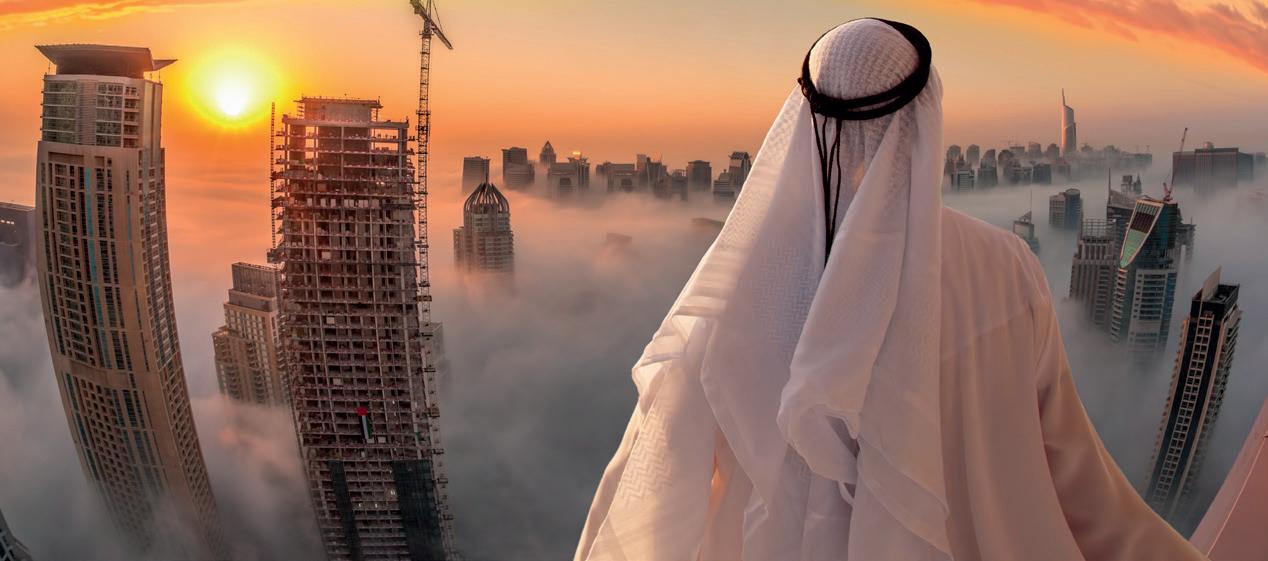
22 Successful study tour! A group of MBA students from the Global Immersion Program flew to Dubai. Former Finance Minister Jan Kees de Jager (19870056) hosted among others with his company Easy Generator.
23 Ing. Rob Huisman (19890519) is commercial manager of Qatar Railways Company in Doha: "Qatari don't take half measures."
27 Klaas Keuning (20139947) manager of Shell, on his Iraq mission: "I was able to support entrepreneurship in Basra."
30 Ir. Gerard Lubbinge MBA (20040415) is setting up a local organization in Doha for Heerema Marine Contractors. "A group of young Qatari hold high positions within state-owned companies, but you test their insecurity."
34 Mr. Bartel Berkhout (20060402) MBA, director & co-founder SPORTSINQ & Sports Leadership Institute, is involved in the sports development in the Emirate of Sharjah
38 Charles Menkhorst (19920932) MBA has worked for 14 years as CEO of port companies in Jebel Ali. Dubai is a magical place for him.
40 Remco Brouwer (2013341) business manager of the Hamad Medical Corporation Neuroscience Institute in Qatar. "It may cost something here!"
43 The Cleveland Clinic, a hospital in Abu Dhabi, is among the absolute best in the world! Vincent Bouw (19990310) is Director of Learning there, Talent Development & Total Rewards.
44 Ing. Eric Tolsma (19870531) works from Dubai for the American company USP&E, specializing in power stations. He won a project in Kurdistan.
47 Business talent Claudia Dayoub (20170803) wants to become a role model for Egyptian women. She shouldn't think about a traditional marriage for a while.
10 Message from Colombo: Clearing out mismanagement in Sri Lanka!
Nyenrodian Wim Kok, Dinesh Gunawardena (19680601) is the second alumnus to reach the position of prime minister. He is facing enormous challenges in Sri Lanka after political riots shook up a country on the verge of bankruptcy.
12 Van Verre, message from London Highs and Lows in the UK in 2022: what a year! Correspondent Ivo Knottnerus (20010413) has not been bored for a moment.
14 PITCH: From beer to mental health!
OOPKOP brings quality, certified practitioners along with national coverage. Van Verre asked cofounder from OOPKOP Reinier de van der Schueren (MSc20060100) a few starter questions. 09 BENEFITS 09 BENEFITS 56 TUMTUM 1 58 TUMTUM 2 59 Personal news
Alumnus (19990431) Olena UrmeyPrikhodko, born and raised in Odessa, put her experience and sailing skills in volunteering for her native Ukraine.
"Diversity is like a diamond in the rough that needs to be polished to shine," so says Ms. Marguerite Soeteman-Reijnen (19850161) who is chairman of the Aon Holdings Board. She has had a 32-year international career with the U.S.-based Aon Group. Directors will have to focus heavily on more women, minorities and talent distribution. To the uncertainty of the future.

54 "Success has been masculine for a very long time." Alumnus Mr. Marguerite Soeteman-Reijnen (19850161) is one of the most successful top Dutch women. As a commissioner and social director, she takes no sheet. In part 2 of an in-depth interview, she cracks hard nuts.
The eighth finals of the World Cup in Qatar start on December 3. It may very well be that our alumni will be glued to the screen to follow the performance of the Dutch national team when this edition of the Nyenrode Alumni VCV magazine Van Verre arrives. Hopefully the matches have gone off without incident until then, as it is clear that the FIFA choice of Qatar is internationally sensitive, to put it mildly. However, there is little point in complaining afterwards about the working conditions during the construction of the stadiums and the necessary infrastructure, painful as they may have been.
The alumni working in the countries of the Arabian Peninsula deserve full respect, as their positions require constant alertness. Despite the immense wealth of the families in power, the crown princes, emirs and sheikhs feel insecure in running their multi-billion dollar empires.
They must rely on hired financial advisors, who are supposed to negotiate the best international deals for them. That dependence can lead to unpredictable behavior by powerhungry multimillionaires toward their expat management. On average, a Western manager lasts five to seven years in an Arab company. Those who last longer have unique expertise and outstanding management skills.
In Qatar, for example, we have an interview with Rob Huisman (19890519), who is commercial manager of Qatar Railways Corporation. He has been closely involved in the construction of a new 75-kilometer subway line with 37 stations connecting the eight World Cup stadiums. It has been a US$20 billion project carried out between 2012 and 2019. Huisman stressed that the subway project involved optimal safety monitoring in the construction pit, but regretted some deaths.
Also stationed in Doha is Gerard Lubbinge (20040415). He works as a commercial manager for Heerema Marine Contractors. He hopes to drag away offshore mega orders, as Qatar is going to ramp up LNG production tremendously from 2026 to 2032. So he is on top of the energy interest, which is stronger than the disapproval opinions about the World Cup.
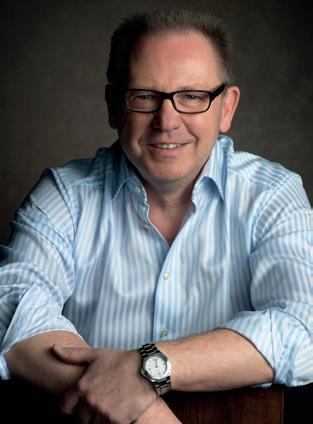
Deutsche Bank's Co-CEO Middle East & Africa Kees Hoving (19870052) reviews the financial relations between Saudi Arabia, Egypt and the United Arab Emirates. He points out that Saudi Arabia is a desert country that needs to make major investments in order to modernize.
Speaking of desert, Eric Tolsma (19870531) works for the American-South African company USP&E, which specializes in building "power stations," mobile electricity facilities. The harsher the conditions in, say, Saudi Arabia, Iraq, Syria or Yemen, the more attractive the margins. Back then, sports, the governments and state-owned investment companies in Saudi Arabia, among others. Arabia, the United Arab Emirates and Qatar have invested heavily in top international sports. Bartel Berkhout (20060402), director of the Sports Leadership Institute & SportsinQ, provides an overview of this multi-billion dollar ball! ♦
Van Verre! Oele Steenks, editor-in-chief
CORINA BLOKLAND (20070305)
Corina Blokland (20070305) is chair of Nyenrode Alumni VCV. She did PTMSc and EMBA at Nyenrode and is an entrepreneur.
Innternational business in the Arab world is not something I deal with on a daily basis with my own companies. That said, we have recently seen that working and trading with Arab countries has become an integral part of international business. I know many alumni who have been operating in various Arab countries for years and are having a good time there, well, even if the functioning is sometimes challenging. The cultural differences from Western or Chinese culture are great. Although we must be careful not to lump all countries together. The fact that concepts such as diversity and inclusion have completely different connotations in some Arab countries than in ours does not take away from the fact that there are also considerable differences between the Arab countries themselves.
This Van Verre features alumni words from Egypt, Saudi Arabia, Dubai, Abu Dhabi, Qatar and Iraq. For these Nyenrodians, they have to work in local conditions and are essentially guests in the various countries. The theme shows that there are clear differences in progression regarding compliance with international human rights. Take a country like Saudi Arabia where women finally seem to be getting more rights and social opportunities, especially when it comes to studying and careers. Change may be slow in our eyes, but every little step is one. A great interview with alumnus Marguerite SoetemanReijnen, chairman of the board of Aon Holdings, provides insight into how we are actually doing in the Netherlands and where our own areas for improvement lie.
And speaking of "closer to home"; inclusion and diversity is also a major theme at Nyenrode.
It's not just about the programs and how we prepare students to do business in other cultures. It also raises the question of how we ensure that NBU and VCV become or remain more attractive to international alumni. For example, do they feel at home on our campus and at our events?
In the November newsletter, I already talked about the culture plan and the ambitions we have to establish a culture at Nyenrode where people feel valued, respected, but most importantly, socially safe. Sometimes it is necessary to look at ourselves and reflect on what we can do better or differently.
I would also like to reflect on the Main Board and in particular the departure of our Marketing and Communications Commissioner. Iris Kisjes, I would like to thank you for your efforts over the past years! You hand over the baton to Edgar Keehnen who will start working with great energy. We have also welcomed a new Commissioner CirclesNiels Bossink. Great to have you here.
Finally, at the November 3rd Board of Delegates meeting, I announced that I will soon be stepping down as president of the NA VCV main board. I hope to become the proud mother of my first child in the spring. I will be busy combining this new life with my work. As much as I regret it, my presidency is almost over. I consider myself fortunate to have a board where people are standing up to take over the baton and will energetically lead the association. I wish you much reading pleasure! ♦
Van Verre, Corina Blokland President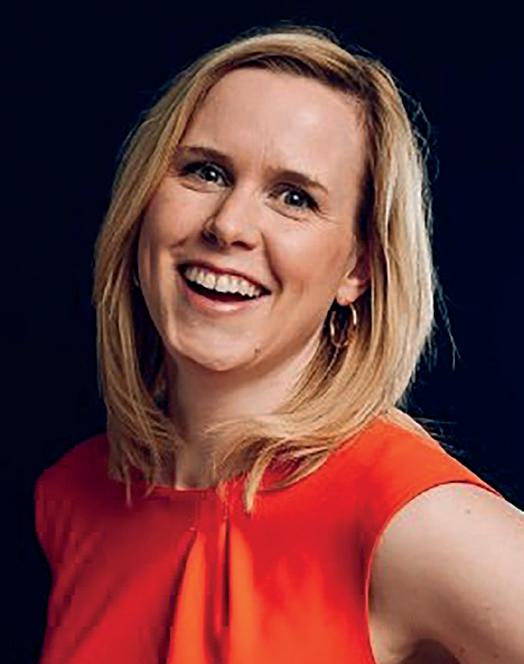
15-12-2022
Christmas drinks 19-12-2022
Interkringen 21-01-2023
New Year's Drinks Homecoming Heeren V van Weleer 16-02-2023
Investorday 2023 22-03-2023
CircLE Commissioners meeting
For registrations and more information: nyenrodealumni.nl and Nyenrode Alumni VCV Office, info@nyenrodealumni.nl, phone 0346 - 291 513
Starting November 29th, the 28 imposing Light objects of the annual art event Amsterdam Light Festival adorn the corridors on the second floor of the Albert Heijn building in Breukelen. Felix Guttmann (19770041), alumnus and initiator of this festival has himself opened the exhibition in the presence of invited guests.
Art Fund Nyenrode's 17th exhibition will be on view until mid-June 2023. A special catalog with all photos of the artworks, including background information from the creators of the Light objects, will be available at the Servicepoint in Breukelen for 10 euros.
There will also be a special art object: 'Absorbed by Light' by designer Gali May Lucas and executed by sculptor Karolina Hinz at the AH building will be placed.
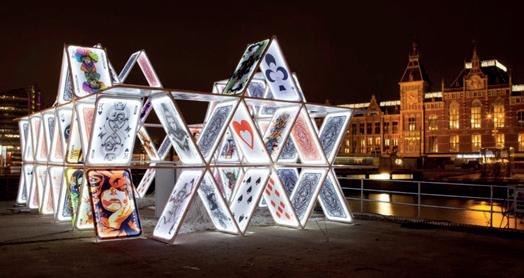
Refreshment Day 2022 took place on Nov. 18. The theme was "Transform Now. This was true not only for the enthusiastic alumni in the room, but also for the followers online; and that was a 'global journey' because the happening could be followed online in English. So also the many foreign alumni could enjoy the latest insights. So what should you do to make an immediate and significant contribution to a better, more sustainable world yourself? The alumni first got an energizer from Kim van Keulen and got to know each other, then they were triggered by Prof. Anke van Hal with models and theories to then via Bert van Son to hear how he set up a great sustainable business with Mud jeans and the big bouncer was Farid Tabarki, who caught everyone up on the latest trends & developments in a lightning speed.
The message was clear: we live in turbulent times, now is the time to get ready for the future! Transform Now! Thanks also to the speakers Diederik van Zantwijk (20190805), Maurits Graaf (20190830), and moderator Vanessa Buisman (19910203).
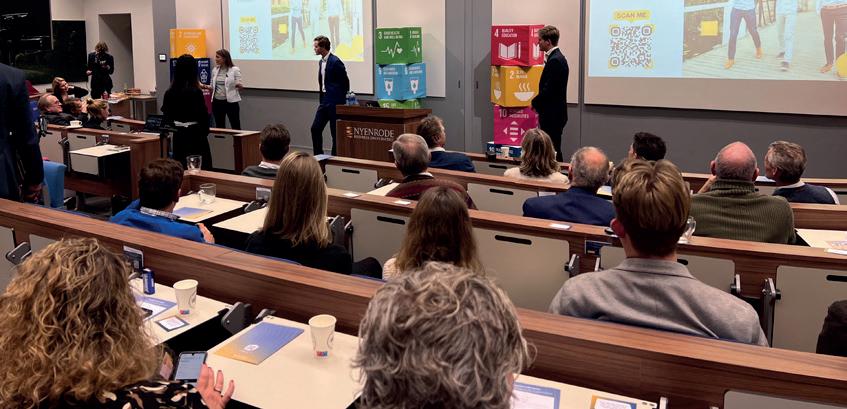
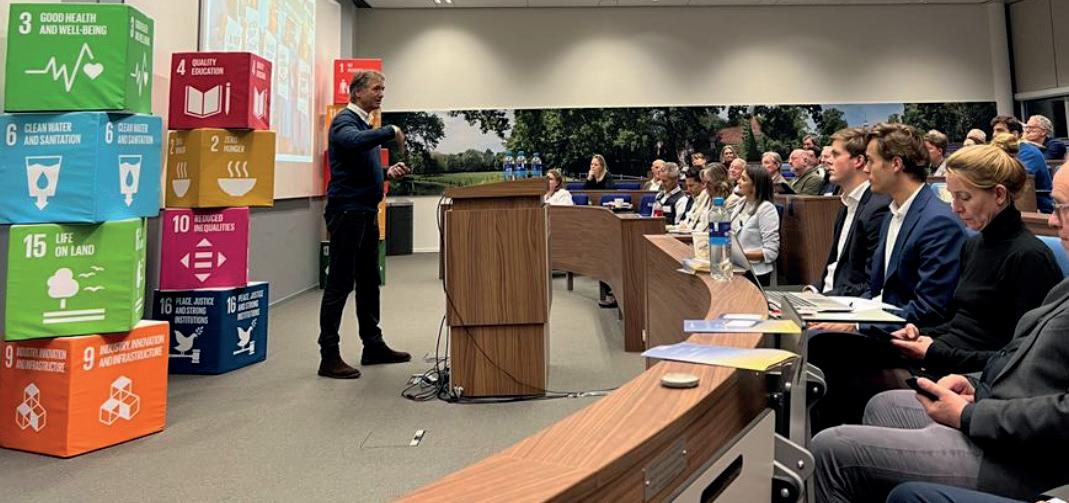
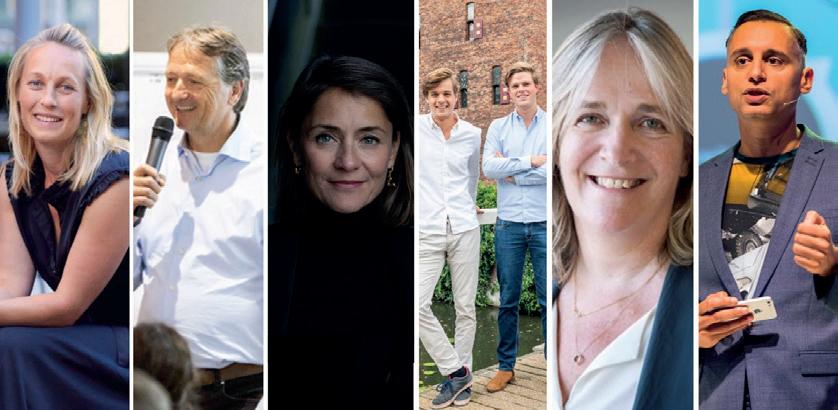
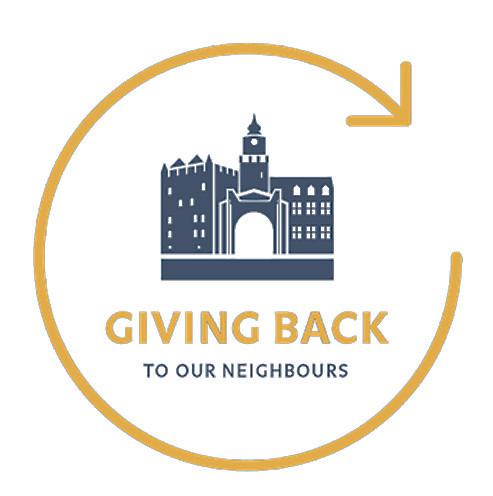
As students of Nyenrode Business University controllers and accountants regularly visit the estate and castle and have little contact with neighbors, and they wanted to change that on Nov. 26. All residents from the municipality of Stichtse Vecht and the Utrecht area were invited on Saturday, November 26th (10:00 - 15:00) to "Giving Back to our Neighbors," a financial brush-up day about investing, crypto currencies, taxes, doing business, making your home more sustainable and more! Through a local campaign, more than 200 local residents signed up.
The VCV will end the year 2022 in style this year with a celebratory drink. It's allowed again!!!
On December 15th, starting at 5 p.m., you are welcome in the Coach House. We hope to join you for a bite to eat and a drink to celebrate this unforgettable anniversary year, because 75 years of Nyenrode, to conclude.
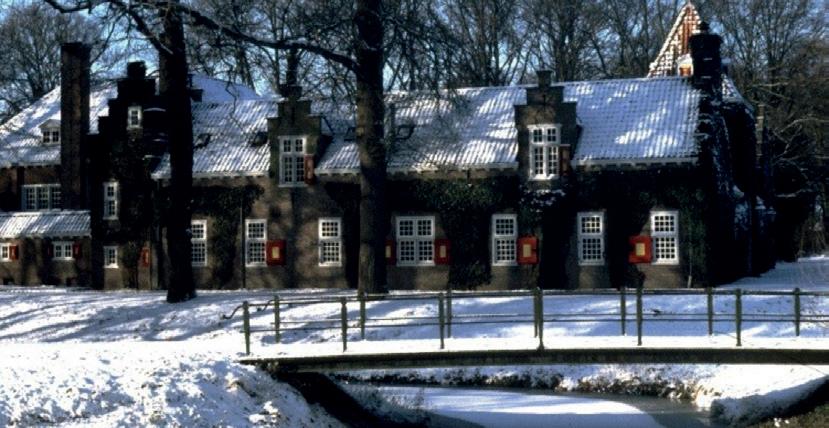
Sign up through our platform!
On Thursday, Feb. 16, 2023, Nyenrode Alumni will organize VCV the annual Investorday. "Helping you to scale up your business. An extremely timely topic, because borrowing money is getting a lot harder!” At the Investor Day, four scale-up entrepreneurs have the opportunity to develop his or her business and investment questions to present to interested investors, fellow entrepreneurs, students and alumni. Sign up: Info@nyenrodealumni.nl
of the activities committee! Besides my activities with the VAS, I like to play tennis, baseball and golf. I am also active in scouting and Rotaract. Very much looking forward to seeing you at the activities of the VAS!
Last September, the new board of the Association of Accounting Students (VAS) for the 2022-2023 academic year took office. In this issue, they are pleased to introduce themselves to you.
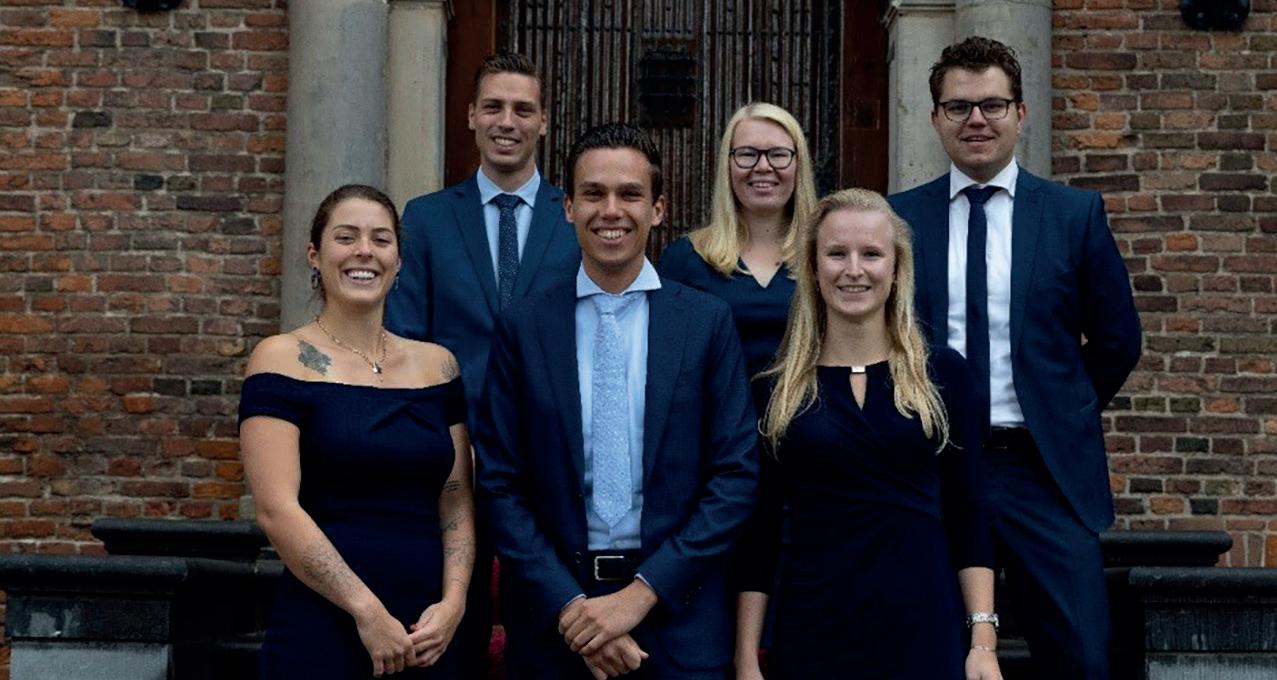
President: Delano Tolhuisen
I am 25 years old and born and raised in Arnhem. In my role as president of the VAS, I would like to draw even more attention to our association. It is a very nice and accessible association with fun and interesting activities throughout the year! I am a social person and enjoy being active. For example, besides the VAS I am involved as an editorial board member at The Accountables and treasurer at my scouting group. In my spare time I like to play squash and enjoy kickboxing or dancing. I also enjoy traveling and drinks with friends.
Vice chairman: Victor Smorenburg
I am 23 years young and a board member of the association of accountancy students since September 2020. I have been living in beautiful Utrecht for a few years now. Currently just finished the bachelor
and starting the master! The things I like besides working life are mainly going out with friends and once in a while a city trip to explore as much as possible. I (administratively) play soccer and I also run, play tennis and sail.
Treasurer: Rick Voogd
I am 24 years old and come from Alkmaar. I am currently in the second year of my Master Accountancy and have been working in the accountancy practice for six years. Both recreationally and competitively. When I go for something, I go all the way. I am curious, pragmatic and love to work with other motivated people.
I also hope to make a valuable contribution to the board with my knowledge and skills. In any case, I am looking forward to the coming year with great pleasure!
Chairman activitiescommittee: Anne Kock
I started my bachelor of accountancy at Nyenrode in September 2019. A year later, I became a member of the activities committee at the VAS. This has been so well liked, that I will now be part of the board as chairman
The JCV is pleased to announce that the first ladies' sorority has been formed. The new Sorority called Carte Blanche, was founded by four female BSc students. Carte Blanche means that members have the freedom to come and go as they please and to start fresh as a group and create their own memories and a bond from the beginning. The motivation for starting this sorority is to create a strong bond between the female students of the different programs offered on the Amsterdam campus, something they somewhat lack at the moment. Currently, the male members of the JCV are also exploring the possibility of establishing a fraternity.
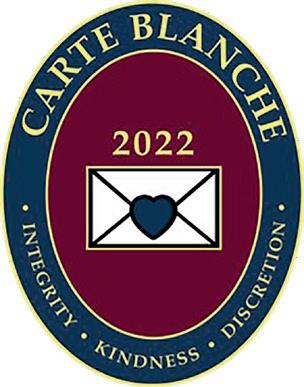
I am 24 years old, in the second year of my Bachelor in Accountancy and am also currently living in Amstelveen. Before I started my bachelor in accountancy, I had 5 years in which I made a 9 month trip around the world, lived in Thailand for two years and also worked full time within the hotel industry. In my free time, I enjoy sports, traveling, social activities and listening to music.
I am 22 years old and in the 4th year of the Bachelor's degree. Before this I studied accountancy for one year full-time at the HAN. I was looking for more challenge and was curious about the link of theory with practice so that what we learn during the course comes to life a bit more. Therefore, in September 2019 I started the part-time accountancy course at Nyenrode, and now 3 years working within Audit. In my free time I like to go out for dinner and/or drinks, explore our own country, go on vacation or city trip abroad, or can be found out and about with our golden retriever Max, and I sport occasionally. ♦
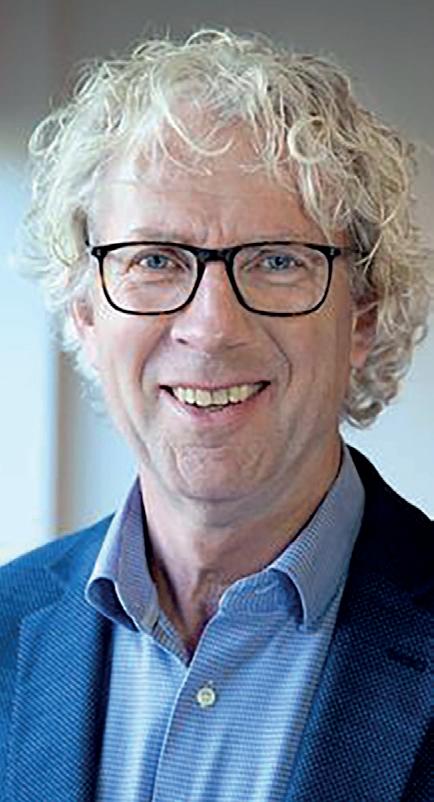
For many students, choosing Nyenrode is based on the unique campus life and hands-on experience. Whether you have an affinity for student associations or not, a student arriving on campus becomes a member of the N.C.V. The social culture is unique, because with all our committees we create a wonderful student life with and for each other. With students at the helm, who give way to a new board every year. As a board, it is now with great pride and a small tear that we must announce that the next board has been elected.
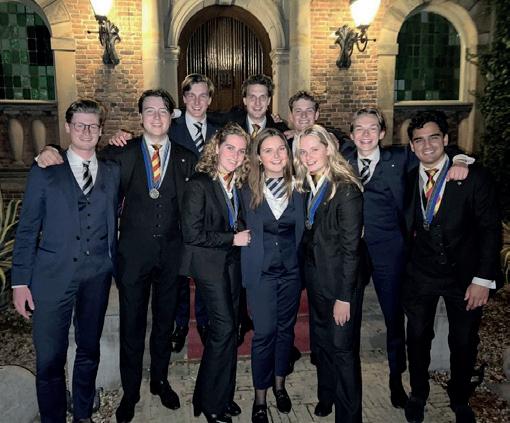
We see five individuals, our successors, who courageously signed up for a board year as we did last year. We see ourselves reflected in our successors, but we also see a refreshing perspective. A year ago, there were five of us standing there. Five individuals who have grown into a tight-knit collective. A group we consider family. The last event of our board year has been Jazznight! We are going to enjoy our last month as a board. Enjoying all the beauty that campus has offered and continues to offer us. But most of all we are going to enjoy with our batch. The batch that we worked very hard with for a year, but most of all gave us a lot of love.
Van Verre!
On behalf of the full LXXVIIe Collegie der Heeren Vijf
PROF. DR. HAICO EBBERS, professor of international economics NBUIn the course, "New Economic Powers" in the FTMSc program, we discuss developments in major emerging economies such as China, India, Indonesia and Brazil. We do this on the basis that choices in these countries are becoming increasingly important to us in the West. The introduction to many of our Immersion programs also begins with this premise: "Today's students will work and live in an environment with new consumers, new competitors, new rules and new business models. For the first time in modern history our graduates will live and work in a world that is not dominated anymore by the west. Hence, the need to discuss the impact of New Economic Powers".
In this context, a group of MBA students is taking a study tour to Dubai. Of course, the United Arab Emirates (UAE) is not a major economic player with its 10 million inhabitants, only 10% of whom are Emirati, but its economic policies and choices do fit in what we see in major emerging markets: a large role for the government, attention to technology and sustainability, and policies to (further) diversify the economy.
Our theme was "Finance and Sustainability." The combination of these two terms sounds paradoxical when we think of Dubai, but it is precisely paradoxes and (apparent contradictions) that bring new insights; namely, that stereotypical images often turn out to be too black and white. An important goal of the Immersion programs is to let the students "hear and see the other side"; a different perspective than the one they see or hear in the local media. One of the paradoxes is that in terms of per capita income, the UAE is a rich and developed country. In fact, its per capita income is higher in purchasing power parity than that of the Netherlands (2022). At the same time, it is clear that it is also a country with third-world characteristics such as the absence of a middle class, minimal social integration and mobility, absolute poverty and income inequality. It is precisely these paradoxes that make it so interesting to visit this type of country.
We visited some banks - Deutsche Bank, SMBC and Nomura - to hear how they include sustainability in their lending. Entrepreneurs shared their views with us, and managers of international companies operating out of Dubai discussed doing business in the region. The students also played a sustainability simulation game and we visited Sustainable City.
On the first day of the program, some characteristics of the UAE and Dubai were discussed. Federal institutions and the differences between Dubai and Abu Dhabi were discussed. For example, Abu Dhabi is largely dependent on oil-related sectors, while only 5% of Dubai's GDP is oil-related.
The importance of Saudi Arabia to the Dubai economy was reiterated several times: business services, including banks are primarily focused on Saudi Arabia. Finally, attention was also given to the fixed exchange rate policy whereby the UAE dirham is pegged to the U.S. dollar. This peg does not allow the UAE authorities to use its monetary policy independently, but on the other hand, one can offer investors much stability and security to offer investors.
During the Immersion program in Dubai, the LES values that we at Nyenrode propagate were visible. It became clear how complicated it is to navigate as a CEO in a rapidly changing Arab environment and how quickly policy choices sometimes need to be rolled out. We saw how Dutch entrepreneurs operate from Dubai. They are willing to take risks and are proactively oriented. Finally, all visits showed how important sustainability is considered. ♦
Alumnus (19990431) Olena Urmey- Prikhodko, born and raised in Odessa, uses her experience and skills to volunteer for her native Ukraine. From the US, she follows Putin's war with horror. She does what is within her power to support her compatriots and continues to motivate Americans to do the same.
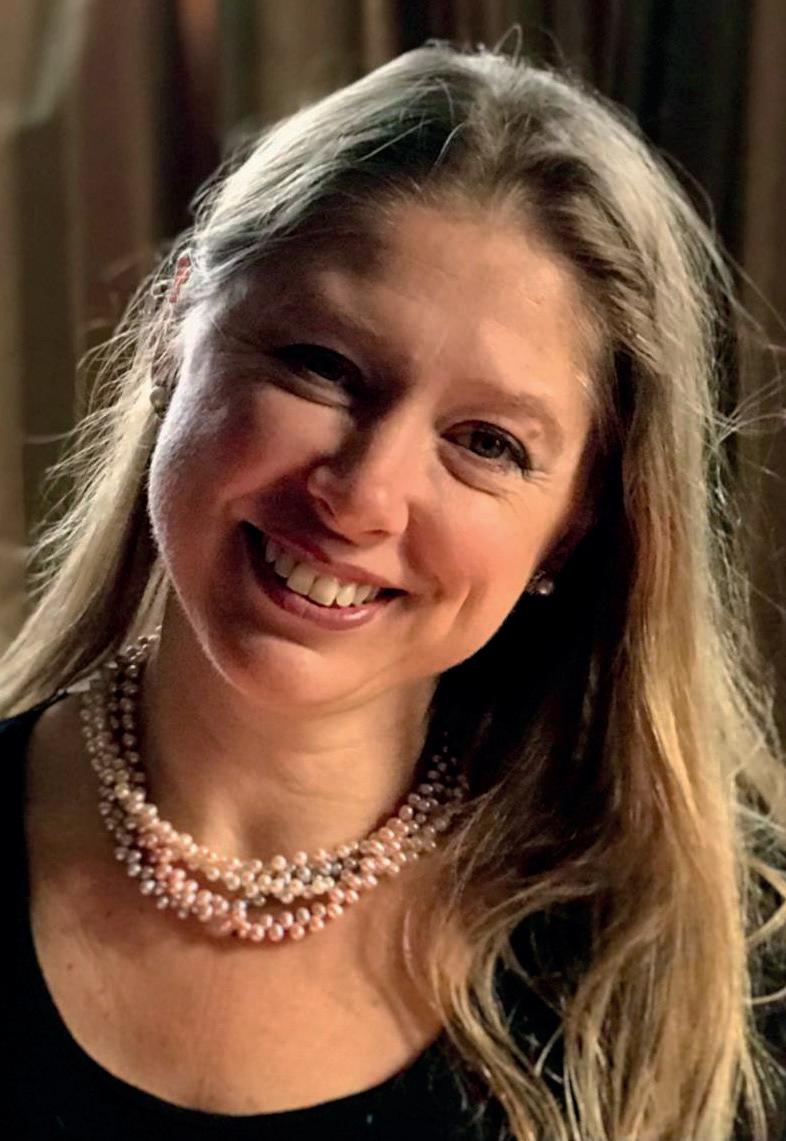 BY JAN VINCENT MEERTENS
BY JAN VINCENT MEERTENS
The film was made as testimony without commentary and was shown at U.S. congressional hearings in 2015."
Q: How is your activity for Razom right now?
Olena Urmey-Prikhodko is an economic and financial data specialist who has earned her spurs in international business. In Odessa, she studied Linguistics. Olena is fluent in Russian, Ukrainian, English and French. She later completed an IMBA Finance at Nyenrode. She is still in touch with most of her yearmates. And with one in particular: Wyatt Urmey (19990442) the man with whom she moved to the United States. Olena and Wyatt live in North Carolina with an 18-year-old son and a 17-year-old daughter.
Q: You picked up a lot of volunteer work after coming to the US. Did you take that motivation with you from Ukraine?
OU: "No, on the contrary. There are similarities, but also many differences between American and Ukrainian cultures. For migrants, it is amazing how many functions in the United States are performed by volunteers.
Even in elections! It was fascinating to see that a complicated system called democracy is based on volunteering at the campaigns and ballot boxes. I got involved in the parent council of my children's school and became treasurer. There are so many low-income families who in difficult times depend on donations and volunteering. Volunteers have full-time jobs and make every effort to balance volunteer work, career and family. So you get the commitment and experience of professionals. When we moved to North Carolina, I became treasurer and parent volunteer at FRC Robotics. That's an initiative that allows high school students to get work experience in STEM (science, technology, engineering and mathematics ed.) by building robots as part of a team. Volunteering made an enormously positive contribution to my integration into American society."
Q: Did all this come together in your volunteer work for Razom, an NGO born out of the Revolution of Dignity in February 2014?
OU: "Yes, when millions of compatriots risked their lives for a better future for Ukraine. Those who could not be in Kyiv at that time wanted to do their part to help the movement from abroad as best they could. In New York, a number of individuals decided to form an organization that supported the Ukrainian freedom struggle. They called it Razom for Ukraine, which means "Together for Ukraine." Among other things, I myself helped translate "A Ukrainian Soldier's Account from the Frontlines," a documentary film by Damian Kolodiy.
"All my experience and skills, everything I learned in the past, now comes together in my volunteer work for Razom and Ukraine. My language skills, financial and tech background, my personal insights and volunteer work in schools. I can now fully engage in advocacy, logistics, fundrecruitment, education and impact accountability."
Q: How is your family?
"All my relatives are in Odessa. They refuse to leave. Everyone believes Ukraine will win and we have faith in our fighting forces and the allies. From the US and Europe we can make a big difference - support and protect our fighters and civilians with as much as it takes. We must not give up, ever, until the war is won. In the month of October alone, Ukraine lost thirty percent of its then overstayed infrastructure, and that's how the country will go into winter. Civilian objects are routinely targeted: hospitals, schools, churches, maternity wards, power plants and heat generation facilities, all in an attempt to panic, subjugate and exhaust our people. Our resolve is even greater after seeing what has been discovered in liberated areas: torture chambers, mass graves, evidence of rape, forced deportation of adults and children, clear evidence of genocide and war crimes, just to name a few."
Q: We look with admiration at that tremendous determination and resilience of the Ukrainian people. How do you explain that tenacity?
OU: "I was raised thinking that the Soviet Union was the largest and most powerful country in the world. When the empire fell apart, I began to realize how much information about the West was kept from us and how we were
influenced to believe in the Soviet Union. Even now you see how that continuous propaganda seeps into the minds of Russian citizens. They are mentally held hostage and manipulated to follow the Russian power narrative. This is also how I grew up. A normal, curious, free mind asks questions, consults other sources of information. As a child, I was upside down if I asked too many questions."
Question: how important is President Biden as an ally to Ukraine?
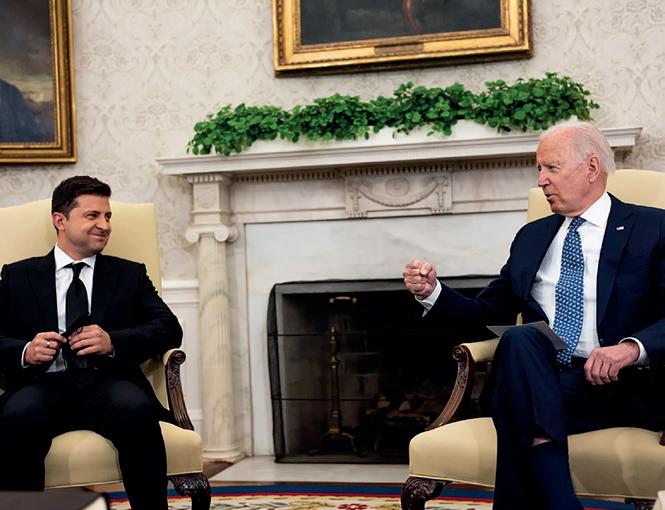
OU: "I am very grateful for the support of the U.S. government. The Lend Lease Act gives President Joe Biden greater authority to enter into agreements with the Zelensky administration to lend or lease defense equipment. That law is a huge support that eliminates the bureaucracy surrounding military support in a big way."
Question: how to proceed with the future of Ukraine?
OU: "According to Putin's plan, Kyiv, would fall within 3 days. Now we are in the 7th month of the war. Putin was probably hoping for an Afghanistan scenario, but Ukraine stands and remains standing. Secretary Blinken (Foreign Affairs, U.S. ed.) said it brilliantly during the UN Security Council: 'If Russia stops fighting, the war ends. If Ukraine stops fighting, Ukraine ends.' We are fighting back and recapturing our territories. That says something about people's motivation." ♦
The VCV has been given the opportunity to offer one of the best marketing books of these times as a benefit: The Customer Leader One of the two authors is Prof. Henry Robben, professor of marketing at Nyenrode Business University.
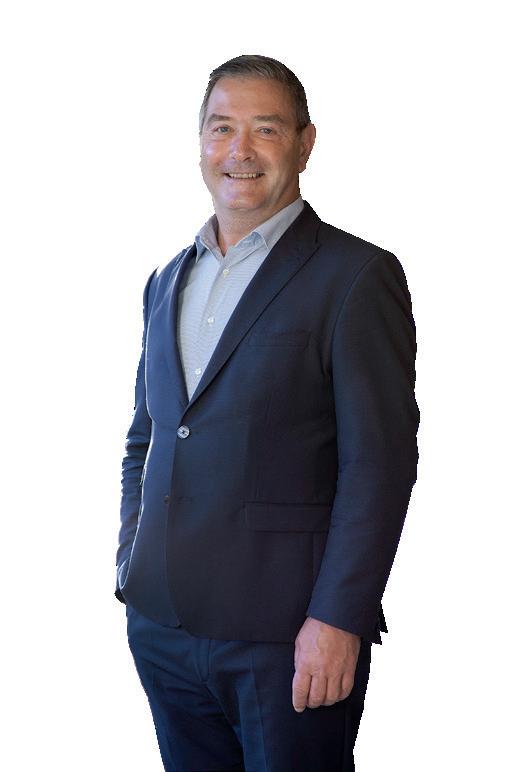
Henry Robben says the following about his opus magnum:
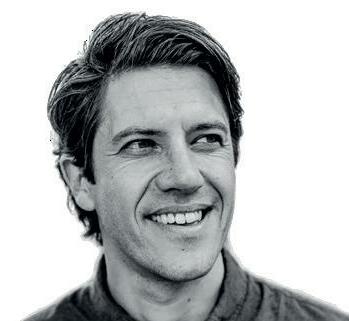
"Most books on leadership focus inward, on the organization. In doing so, many authors forget the most important stakeholder of any organization, which is the customer (or citizen, client, society, voter, patient, employee). An organization exists thanks to the permission it receives from this stakeholder to exist and carry out its activities. The Customer Leader clearly describes how to achieve greatness, an organization that makes the world a better place by climbing the Stairway to Greatness. In short, empty your bookcase, throw away all your management books and read The Customer Leader."
The book excels at pithy simplicity. It helps the manager in issues of valuation, competitive analysis, the development of successful marketing concepts and the design of customer-driven organizations. Henry Robben is part of the Nyenrode Faculty Expertise Center Marketing & Supply Chain Management. His research interests include strategic marketing, innovation management and new product development. He has numerous articles in leading journals to his credit. And he has co-authored several books, including Visionary Marketing (with Rudy Moenaert), Strategic Thinking in Marketing (with Rudy Moenaert), Marketing Management: The Essence (with Philip Kotler, Kevin Lane Keller and Maggie Geuens), Marketing Strategy and Organization (with Rudy Moenaert and Peter Gouw). The co-author of The Customer Leader is Rudy Moenaert, professor at the TIAS School for ~Business & Society!
Five copies of the bestseller The Customer Leader have been made available as a benefit. Those interested should apply quickly on the VCV platform, under the Benefits section.
For VCV members, OOPKOP has a special offer: for 30 euros per year, you can use our module ‘3x 30-minute coach consults.'
For further information, see the VCV platform under the Benefits heading

After Nyenrodian Wim Kok, Dinesh Gunawardena (19680601) is the second alumnus to reach the position of prime minister. He is facing enormous challenges in Sri Lanka after political riots shook up a country on the verge of bankruptcy. Undoubtedly, the skills and insights he gathered during his Nyenrode tenure will help Dinesh effect financial, economic and social change in a current business administration. He has gotten off to a promising start.
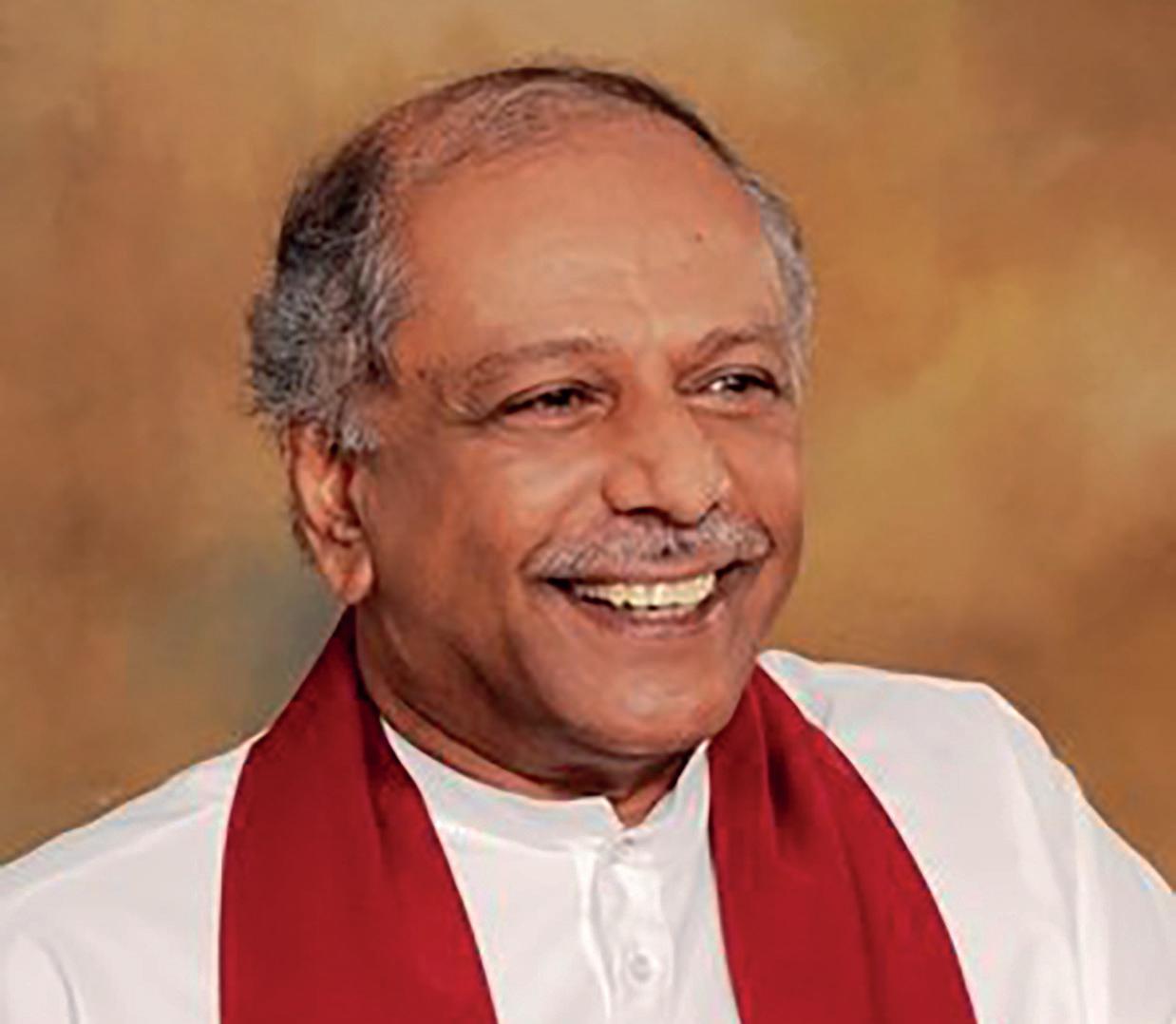 BY OELE STEENKS
BY OELE STEENKS
You studied business administration from 1968 at Nyenrode Business School in the Netherlands and completed your BBA studies through an exchange program at Oregon State University.
Q: How do you look back on this education?
DG: "There was a tradition in my family to study law, but I wanted to focus on new knowledge such as marketing and business administration. In retrospect the timing was perfect, because the European Union was in a developmental phase, with negotiated relations between Germany and France. The international student intake at Nyenrode visited Brussels to gain insight into the political process. This helped me get an idea of the export opportunities that lay ahead for Sri Lanka. As a matter of fact, I wrote a thesis on Philips' television industry in Eind-hoven. That helped introduce television to Sri Lanka.
Your father Philip is known as the founder of socialism in Sri Lanka and your mother Kusumasiri was a champion of women's political rights.
Q: What are the values you inherited from your parents?
DG: "My father is recognized as the architect of socialism in Sri Lanka. He was able to study in the United States, where he was inspired by the idea that wealth should be distributed to a larger population than was the case in Sri Lanka, where the state and a limited number of families controlled the economy and national income. I took that mindset with me to Nyenrode, where I was impressed by the national pension plan and healthcare provision. After returning to Sri Lanka, I became a union leader, so that was a choice that suited my parents' background."
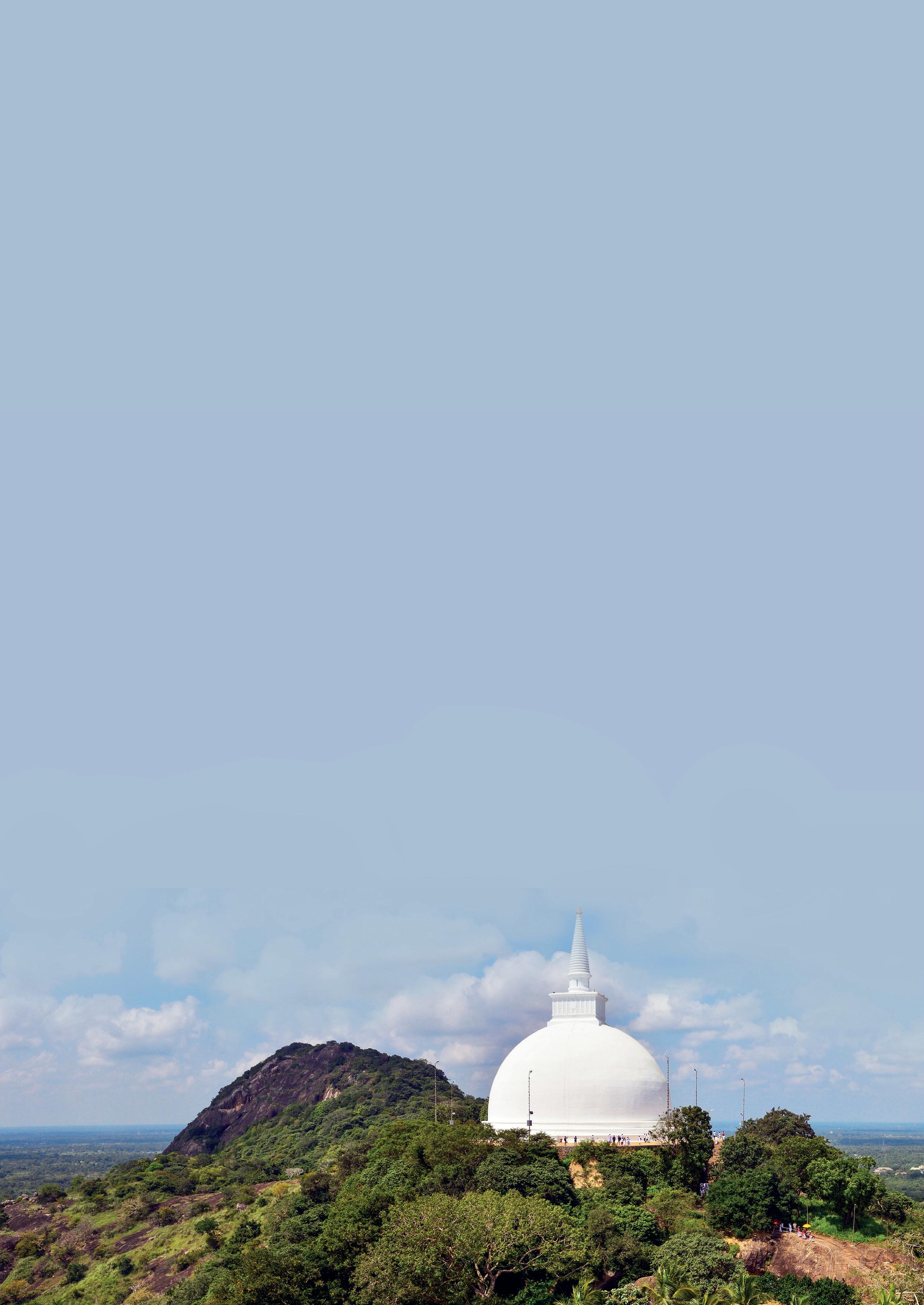
A prominent politician of the United People's Freedom Alliance (UPFA), prior to serving as prime minister, you held key ministerial posts in urban development, water supply education and sacred area development.
Q: What makes you proud of that period?
DG: "Sri Lanka has made progress in developing national seaports. We are becoming a modern supply chain hub on the sea route between Asia, the Middle East and the Western world. Furthermore, we have created the infrastructure for a tourism sector. What is most striking, however, is the level of education in Sri Lanka. We have a 93% literacy rate, which puts the country in a No. 2 position in the region of India, Pakistan, China and the rest of the Far East."
You have held the office of prime minister since July 22, 2022 in your country. Q: what is the most important issue that your government needs to address?
DG: "Sri Lanka has a deficit of $50 billion in outstanding international loans. We needed a restructuring of these loans
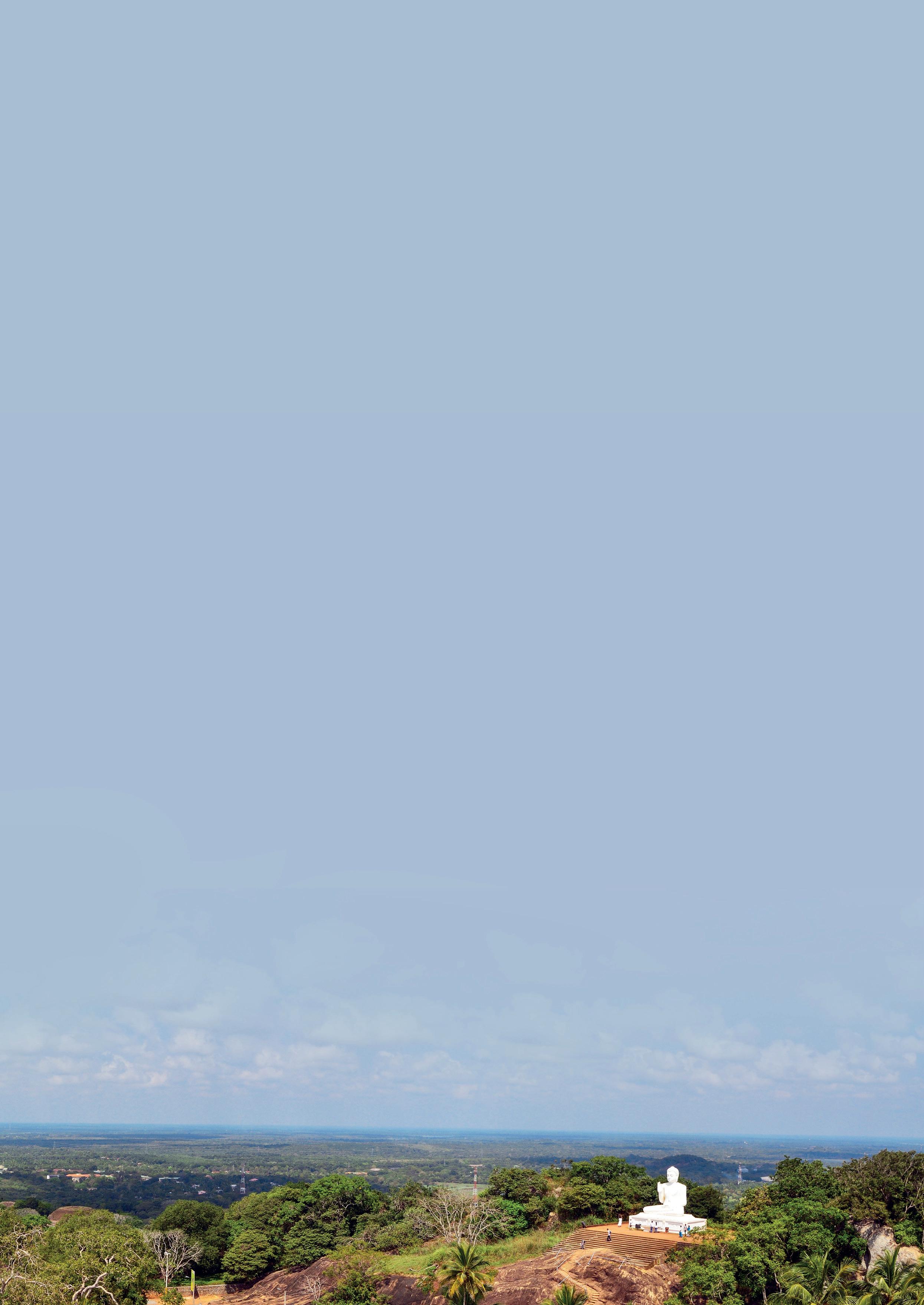
to avoid national bankruptcy. So far this process has developed favorably. Understand that there are three countries acting as our main sponsor: India, China and Japan. Through the IMF Executive Board in Washington, a draft agreement has been made negotiated, which must now be submitted for approval to the President of Sri Lanka and me on our side, and to the sponsoring countries on the other side. India has unofficially agreed to the new arrangement. I expect that in February or March 2023 the agreement can be officially signed. It helps us that Japan will be the chairman of the related IMF international region."
On your Twitter account, you indicate that you are combining this PM responsibility with the Ministry of Public Administration, Home Affairs, Provincial and Local Government. Q: How stable is the political situation in Sri Lanka to take on this workload?
DG: "I should point out that we have had a democracy since 1927, therefore parliament is an established institution in Sri Lanka. However, we suffered 20 years of civil war in the last century between the Sinhalese people and the Tamil Tigers. After this period that depleted the economy, we suffered from the Tsunami in 2004, which claimed 35,000 lives. These circumstances weakened the country. The corona pandemic and accompanying lockdowns have had a severe impact on our tourism industry. Meanwhile, climate change has affected our agricultural production. All this has led to national social tensions, which erupted last summer. Protesters turned against the president elected by parliament and he was forced to flee the country. Images of the rioters looting the presidential official residence went viral. In response, the two main parties in parliament decided to form a business cabinet, with a new president appointed from the opposition and myself as prime minister for the UPFA. We will be in office until 2024, when, according to Sri Lankan law, new elections will be held to install the new president for a six-year reign. I can say that the political situation has calmed down, allowing us to focus on some huge challenges. One is to cleanse the stateowned enterprises in this country of corruption and mismanagement. The national treasury has pumped far too much money into these heavy loss-making companies. I will make sure there is well-trained, better management."
In addition, UPFA's political principles such as social justice, human rights, freedom of education and expression, rights of information and freedom on social media are very recognizable and attractive to Western democracies. Q: What is Sri Lanka's current social policy?
DG: "Like everywhere else in the world, the population of 22 million people in Sri Lanka faces inflation and food shortages. We were forced to roll back strict fertilizer banning regulations and there has already been a dramatic improvement in the forecast for the next six-month crop in March 2023, with rice and tea plantations as the main agricultural activities. In the slipstream of this national approach, we have installed a home gardening project, allowing families to claim their own small plot of land for growing food to meet their needs. In this way, we are helping the population avoid high inflation. If we manage our agricultural production more effectively, Sri Lanka can become self-sufficient in its food consumption. Meanwhile, we are investing in wind and solar power to make electricity cheaper."
The textile industry provided cheap labor to Sri Lanka, but the added national product of this activity is low. Q: What are profitable export industries that will provide more advanced jobs?
DG: "We need to revitalize our tourism sector. This country has such a wealth of historical sights from past centuries under Dutch and British government and it is the global center for Buddhist heritage. I am happy to report that tourism is picking up. It is starting with airlines flying to Colombo again, including Air France-KLM. For our next generation, I am hopeful that the IT sector will grow rapidly in this country. In this regard, India is our inspiring example. I see a significant number of programmers traveling to Silicon Valley for training; meanwhile, we are in talks with American universities to start training programs here in Colombo. As Prime Minister, I expect that the current coalition government will be able to focus on solving Sri Lanka's key problems, but we must be realistic about the goals that we can achieve within a two-year period. To become truly prosperous, we need another six-year period of political cooperation to have economic and social impact." ♦
Our correspondent in London, Ivo Knottnerus, has not been bored for a moment in the British capital this past year. It was a unique year that will probably never be matched in historical terms. At least the idea that the British are emotionless and aloof was massively belied!
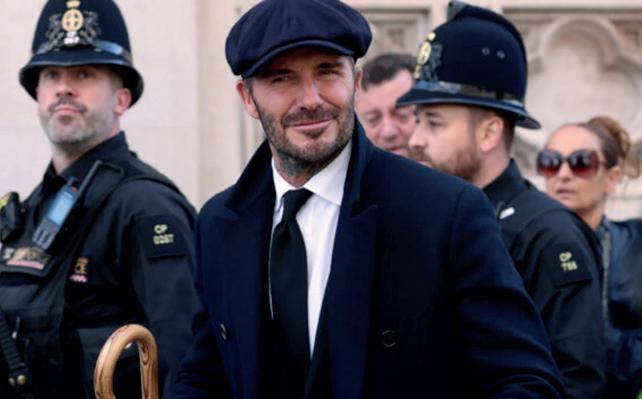
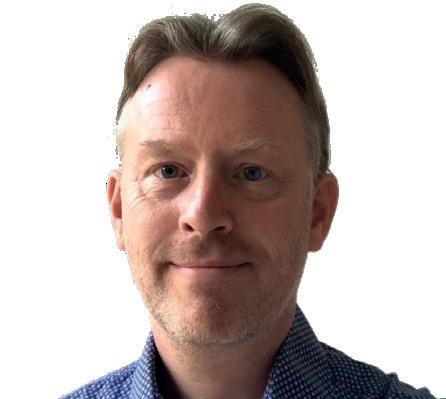
 BY IVO KNOTTNERUS (20010413) MBA
BY IVO KNOTTNERUS (20010413) MBA
LOW: Partygate at Downing Street no.10 The Prime Minister who keeps everyone in lockdown, but then organizes parties of his own at 10 Downing Street. Partygate was a fact. In March, April and May of this year, we in England were really just in lockdown after all. New photos continuously appeared of Prime Minister Boris Johnson appearing to toast with colleagues during the second national lockdown. The mayor of London, Sadiq Khan, interfered in the story. He demanded an explanation from the Metropolitan Police as to why more fines were not issued to Boris. Violations of the Covid lockdown were said to have occurred on a "record-breaking scale." Johnson denied that neither he nor his wife Carrie had received any new fines.
HIGH: The Queen’s Jubilee 70 years on the throne and installing 15 Prime Ministers. It had to be celebrated in a big way. Something the British are really good at, and perhaps after the United States, they are the best at "official protocol." Military parades, traditions, shows, etc. And we got a weekend full of it. It was just very unfortunate that the health of the Queen was very fragile even then. We had to make do with a single moment when Queen Elizabeth 2 appeared on the balcony of Buckingham Palace. However, for four days there was a great celebration by the British!
LOW: the fall of Boris Johnson Back to Partygate. It was ultimately about 15 meetings! I think the turning point was a party on the night before the funeral of the Duke of Edinburgh, Prince Philip, husband of HM Queen Elizabeth
II. People danced, drank and later moved to the garden of No. 10 Downing Street, where assistants demolished a swing belonging to Boris' little son. The next morning England was glued to the tube, to see a completely lonely Queen Elizabeth 2 at the farewell service for Prince Philip. This was because of strict covid-19 regulations. The PM was present in the background. After his party...his farewell as PM drew ever closer. Johnson's premiership was defined by Brexit and Covid. As those immediate challenges waned - or moved on to their next phasethere was no other coherent policy. It lacked the conviction that Johnson stood for and that should bind him to his political allies. I found him a strange, solitary animal in the parliamentary system of Britain.
HIGH: the election of Liz Truss as PM We were delighted at home with a new female PM. Liz Truss won the election over former finance minister Rishi Sunak, who had long been seen as the favorite. Truss received 58 percent of the vote from Conservative members, but Rishi Sunak was the party favorite. Actually, Liz Truss ascended the political ladder too quickly. After cabinet positions under David Cameron and Theresa May, she was foreign minister in Boris Johnson's second cabinet. At the same time, she was Minister for Women and Equality. She was directly compared to Margaret Thatcher, but the Iron Lady had been a lifelong right-winger and member of the Conservative Party. Truss, on the other hand, was a relative newcomer to the Conservative camp. She had previously been a member of the center-left Liberal Democrats. She even
spoke out in favor of the abolition of the monarchy and the legalization of cannabis! She campaigned on lowering of taxes and thereby creating economic growth. It thought to finance that by borrowing a lot of money, tax brackets were lowered, energy prices frozen for two years, all kinds of other tax increases that Johnson had announced were reversed. Didn't it all sound too good to be true?
LOW: the death of HM Queen Elisabeth II I remember well, where I was and what I was doing the moment it was announced that HM Queen Elizabeth II had died on September 8, 2022. I had just come from an appointment near Tottenham Court Road Station and there was a lifesize photo of the still-young Queen projected on an immense screen with the text "Her Majesty Queen Elizabeth II1926-2022" next to it. By then, everyone knew what time it was. London Bridge was down. I already thought there was a "weird" silence on the street as I walked to the tube station. I also had no phone signal. That never happens in Central London, and later I understood that the networks had been completely overloaded. Between September 8 and 19, the day of her funeral, there was really no other news in the newspapers. This was really considered 'not done' while we were anxiously awaiting the new PM's plans regarding skyrocketing energy prices. Truly all offices, stores and restaurants were closed on the day of the funeral, Sept. 19. Unforgettable, too, was the 10-pound-meter line of Britons including soccer icon David Beckham, who said goodbye to their Queen Elizabeth 2 in Westminster Hall. The waiting time was 14 hours!♦
Daag jezelf uit om een verantwoordelijke, effectieve en goed geïnformeerde bestuurder te zijn in een complexe omgeving in uitdagende tijden. Het New Board Program biedt inzicht in g overnance d ilemma’s en draagt bij aan boardroom performance.
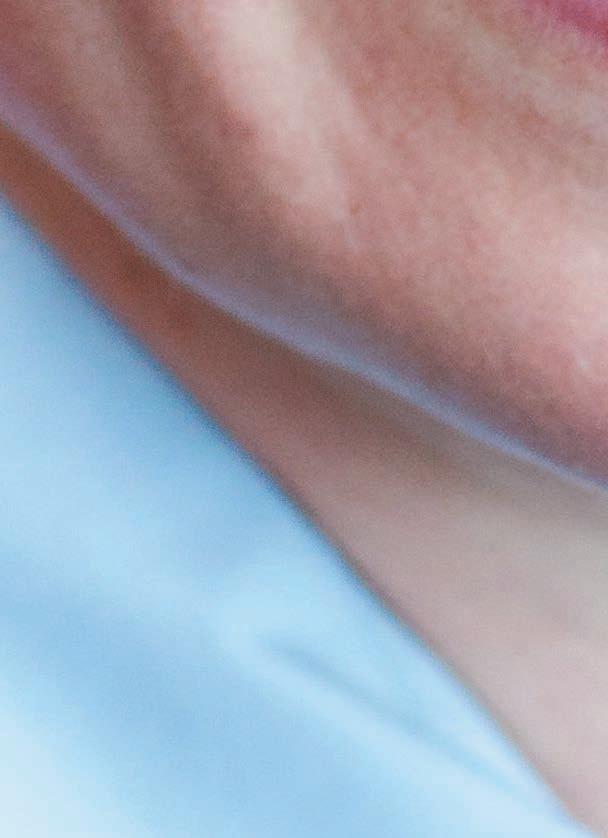
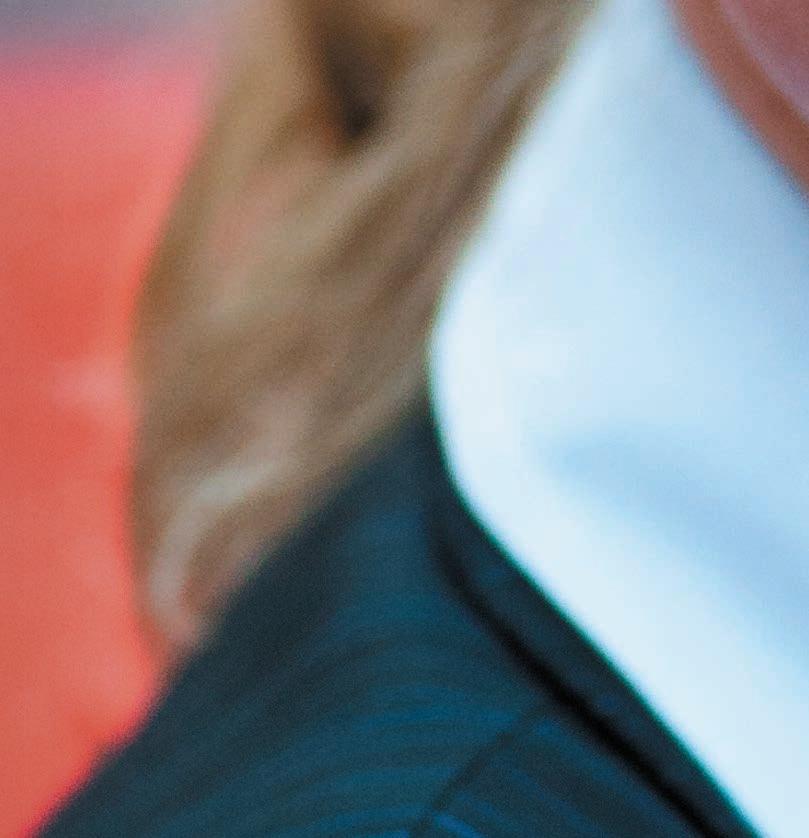

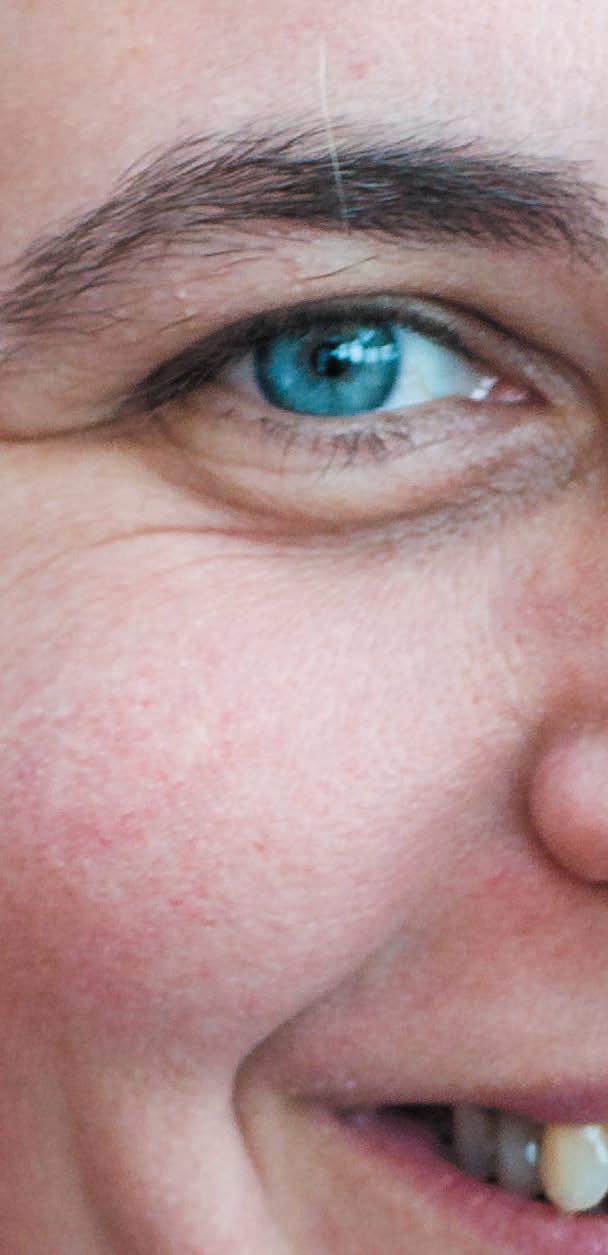
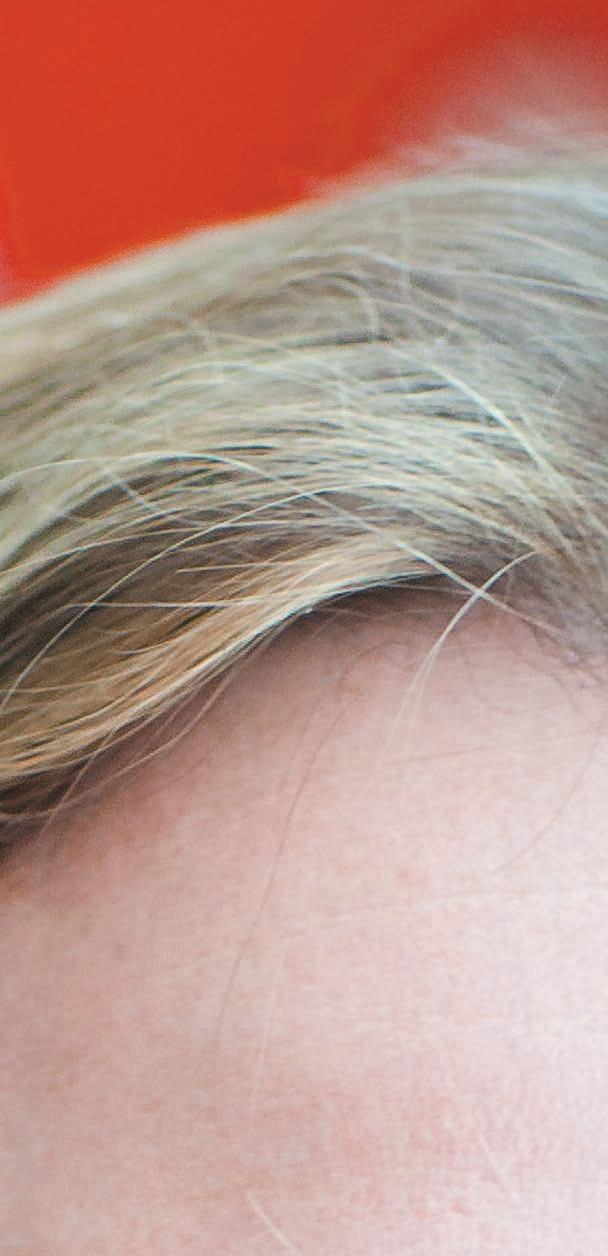
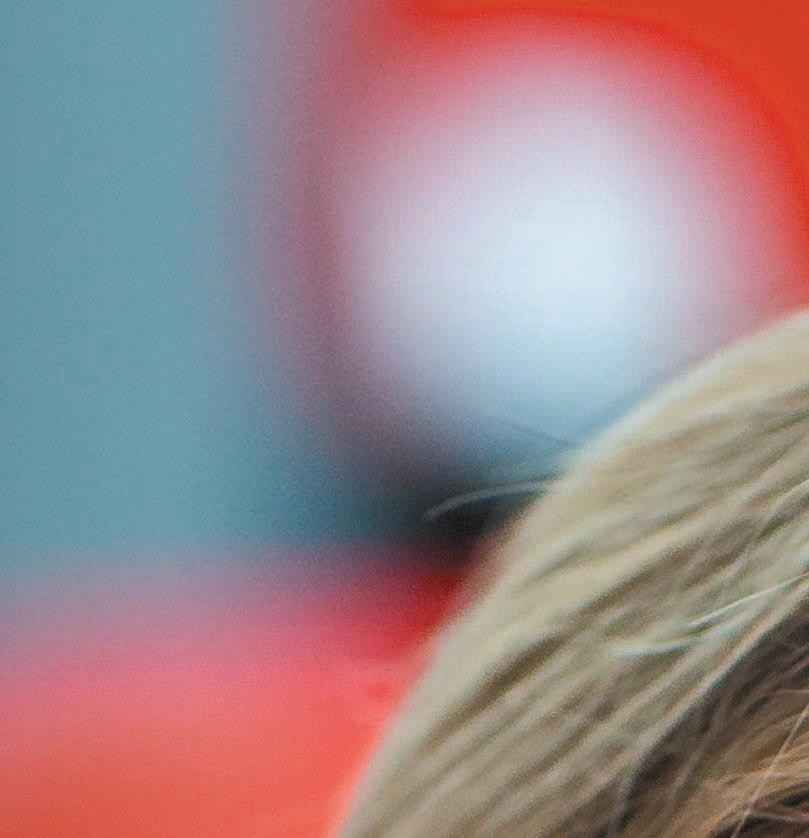
Effectief besturen gaat niet alleen over strategie, focus op stakeholders en het beheersen van organisatorische prestaties en risico’s, maar ook over groepsdynamiek in de boardroom, leiderschap, individuele competenties, motivatie en persoonlijkheid. Het programma richt zich op (aankomende) bestuurders in het private e n (semi-) publieke domein en bestaat uit een

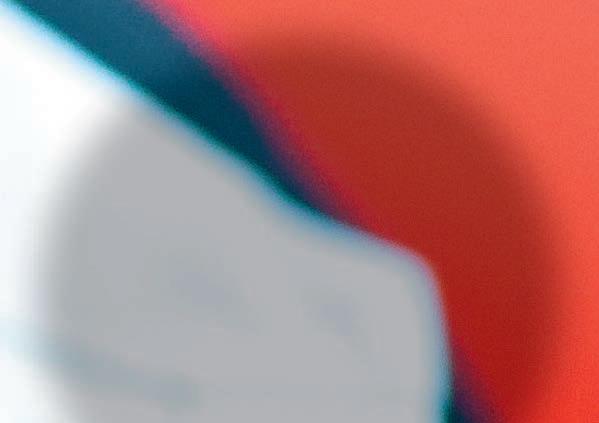
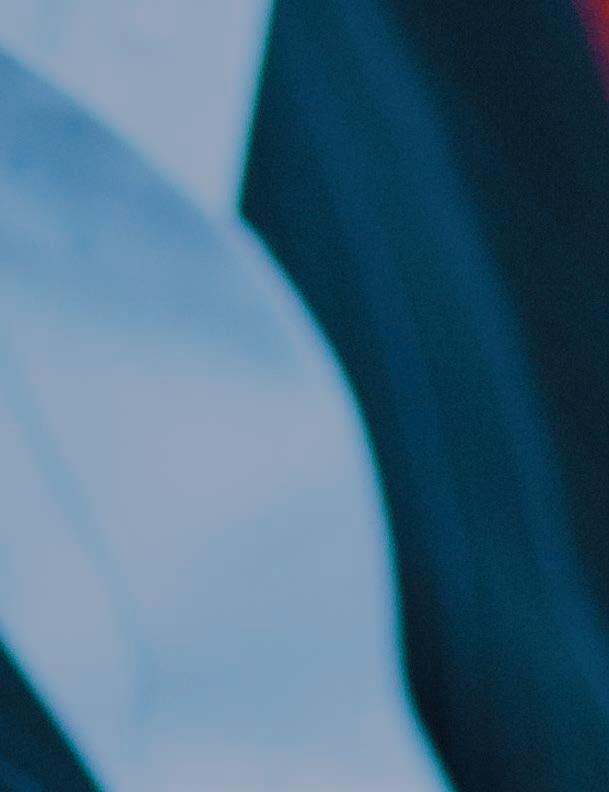
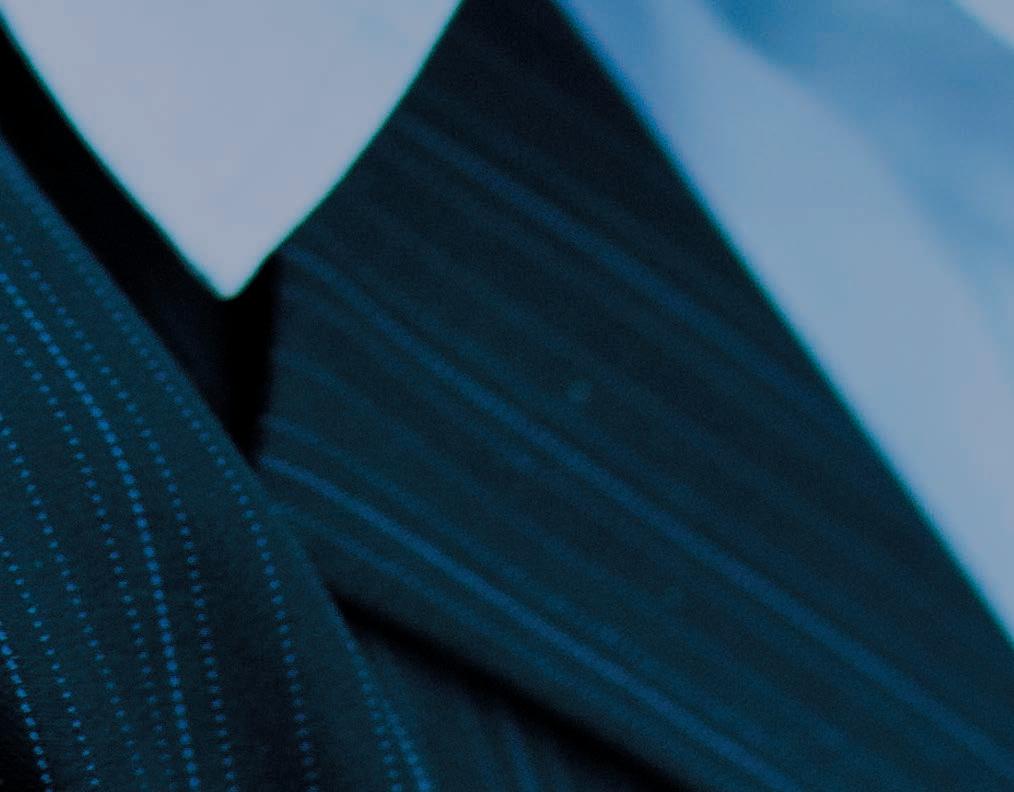
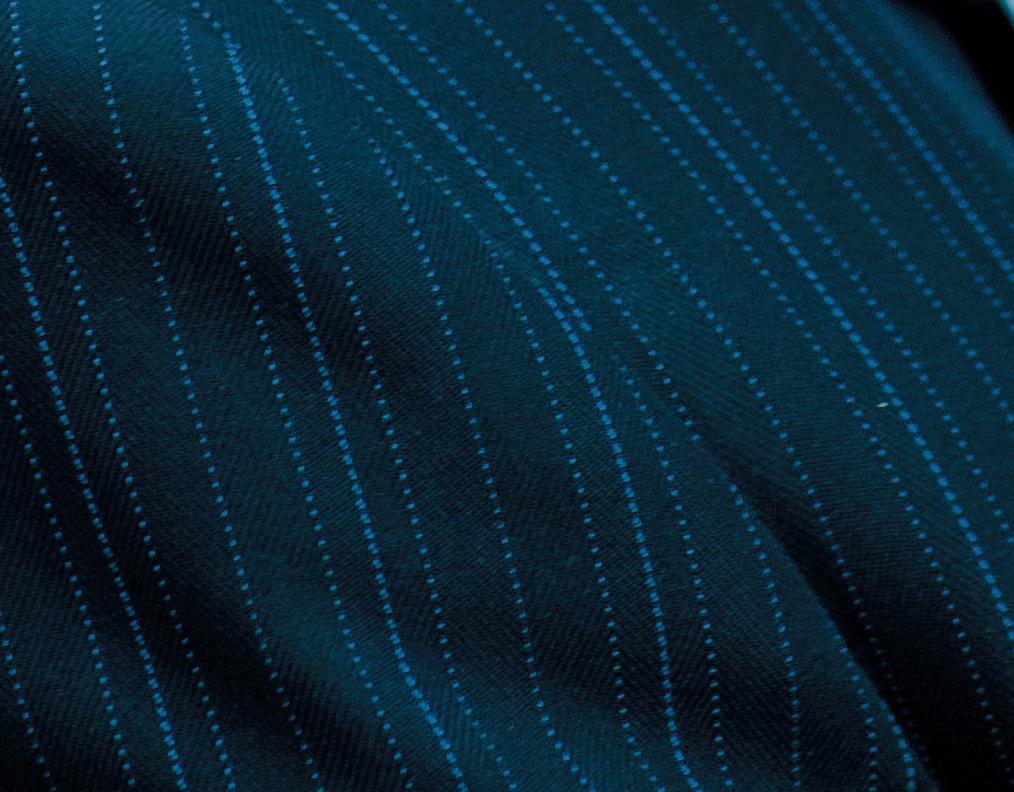
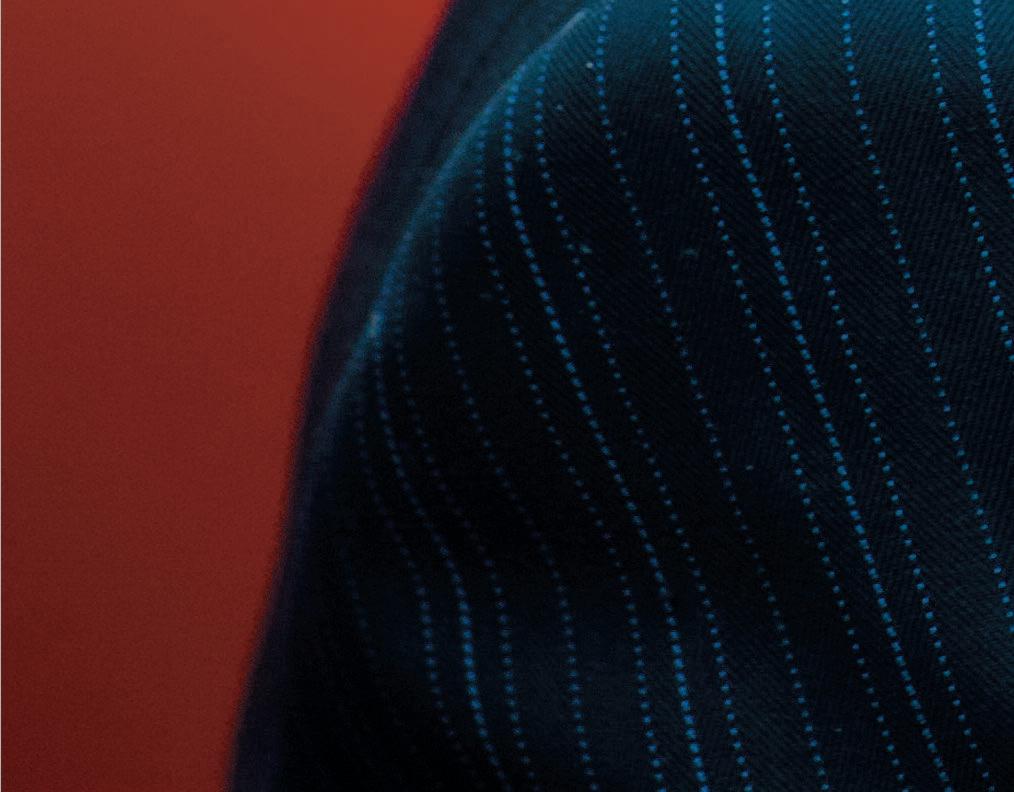
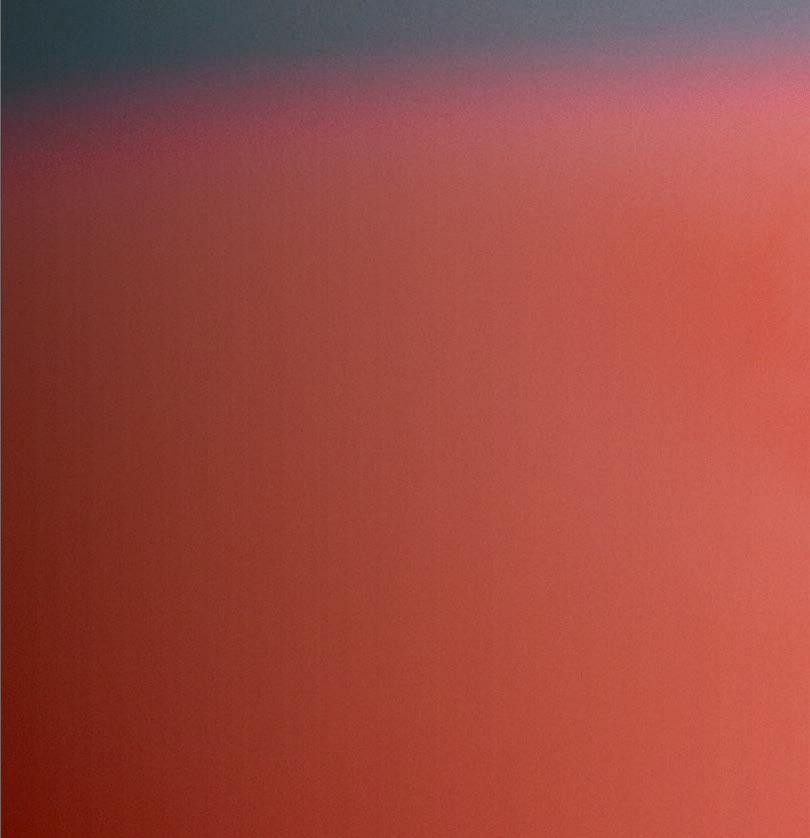
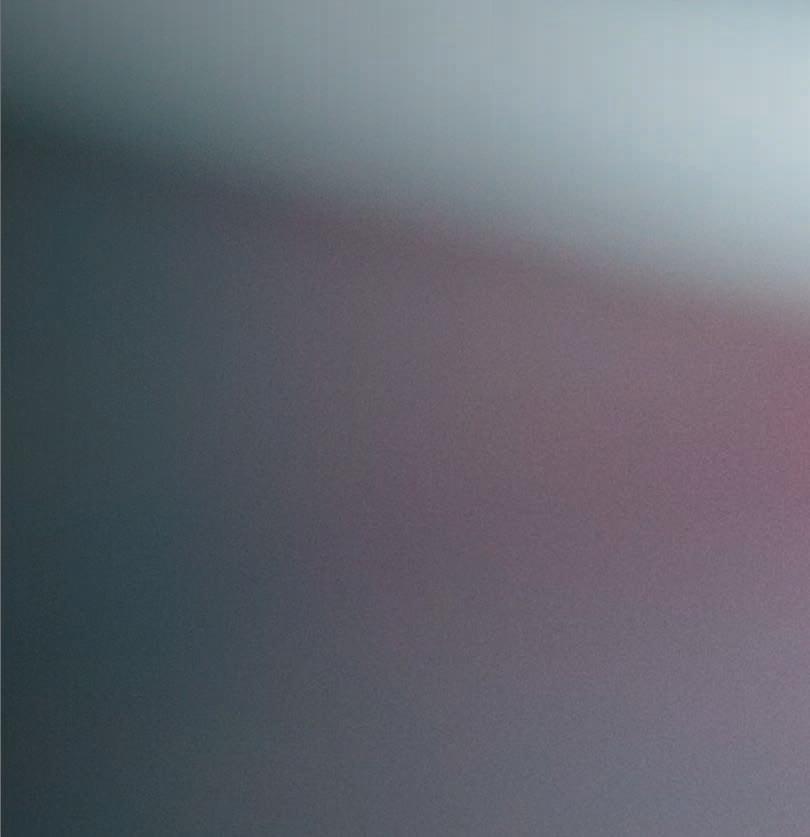
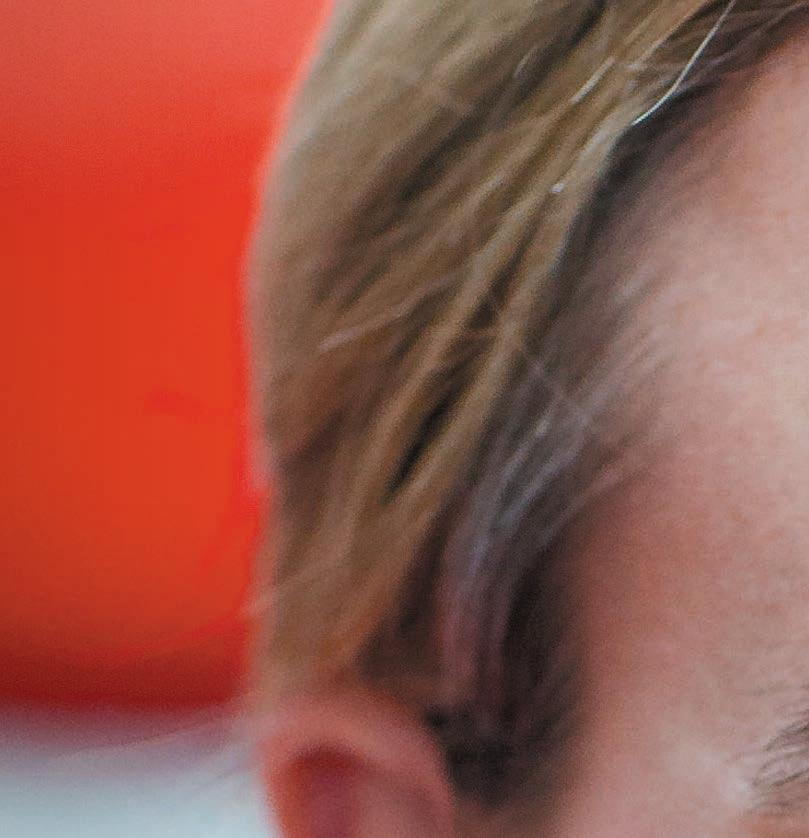
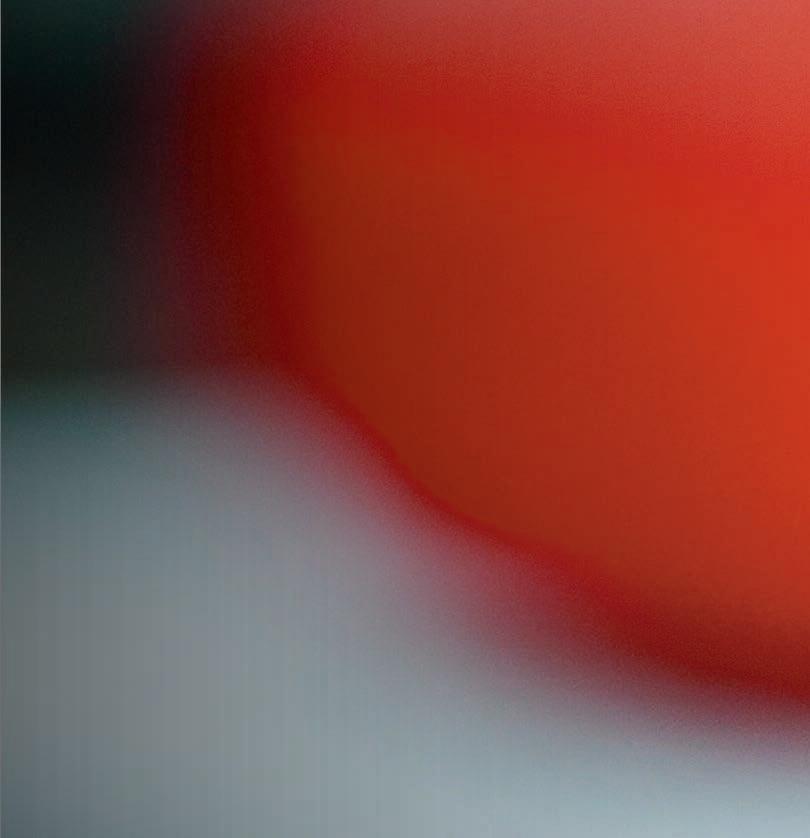
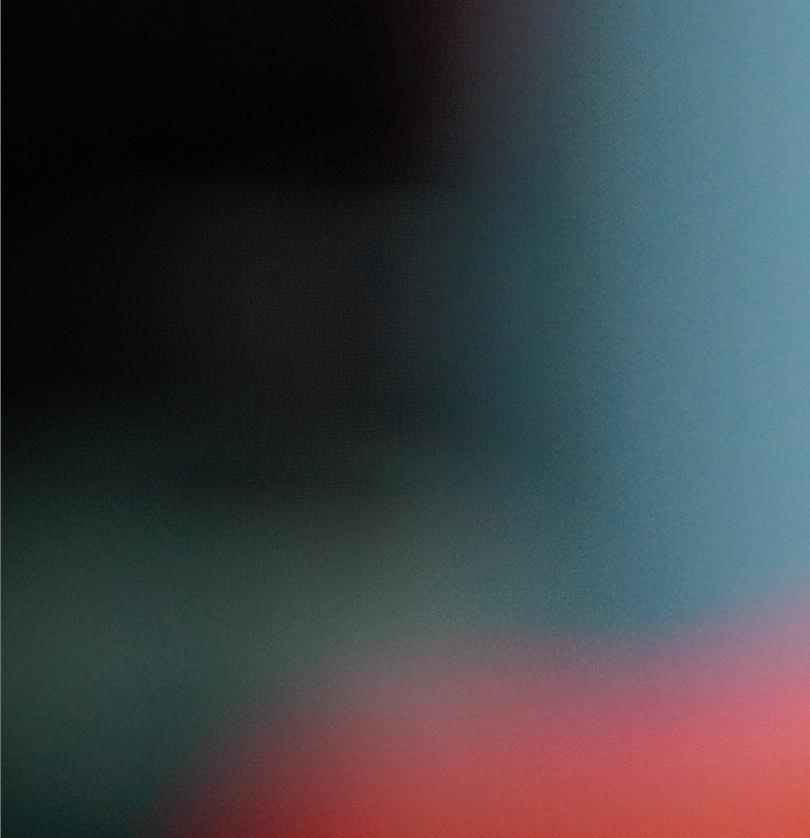
mix van actuele casestudies, interactie met bestuurders en commissarissen en interessante discussies met hoogleraren en sprekers. We dagen je uit om alle aspecten van governance, in het samenspel tussen raad van commissarissen, raad van bestuur en stakeholders, beter te leren begrijpen.

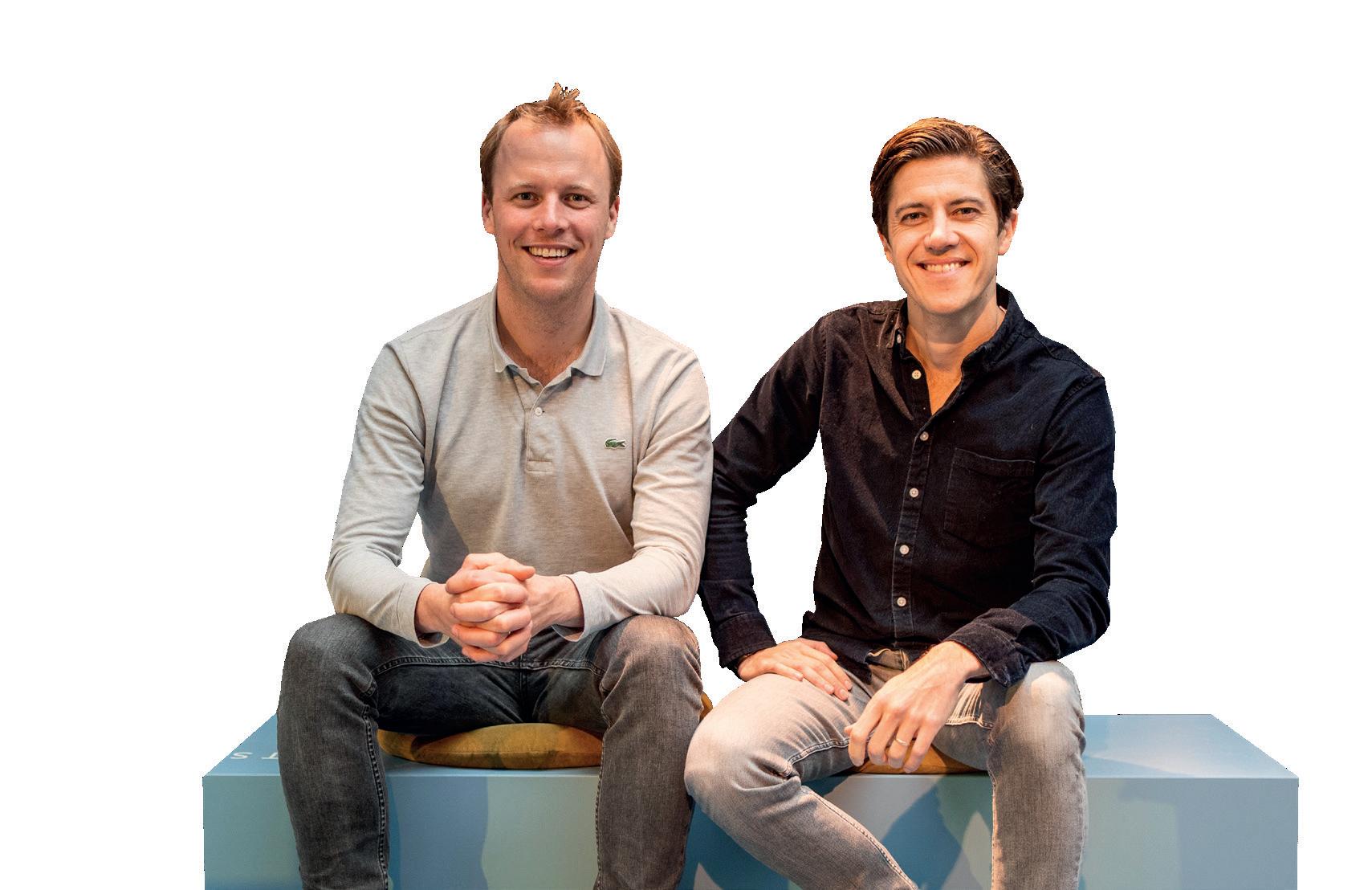
Employees who are comfortable in their own skin are less likely to quit, have less absenteeism and are more productive. OOPKOP brings together quality, certified practitioners with national coverage. The offering is broad with 150 affiliated healthcare providers and ranges from coaching and personal leadership to meditation and breathwork. Employers can offer their employees preventive mental health care choices knowing that treatment ultimately benefits everyone. Van Verre asked OOPKOP co-founder Reinier de van der Schueren (MSc20060100) a few questions.
BY DANIQUE WORMGOOR EN DINE VAN DIJKQ: After Nyenrode, you started working first at Heineken and then at Asia Pacific Breweries. Why did you start working for yourself?
RdvdS: "I come from the Achterhoek from a family of hospitality workers, and after the Hotel and Nyenrode I started working at Heineken. I performed well, but didn't really know who I was and what I stood for. Then I did a coaching program to discover myself. I found out who I was and what I wanted to stand for. Meanwhile I thought, how cool that someone can help me and make me realize what my values are.
I understood that the Achterhoek and running a family hotel had not really been an enabling environment for personal development. The credo at home was: you are who you are
After two coaching sessions I had already received many tools I could and wanted to do something with. I also started to study in mental health. I thought right away more people should be able to take ad- vantage of this.
Why don't people seek contact with other people who have studied for this?
I started applying it with my own team at Heineken and started applying the topic of mental health: personality tests, coaching, horse sessions and all that kind of stuff. I immediately noticed how much I got back in return in engagement, in performance and in staff retention. On my last assignment for Heineken in Singapore, at Asia Pacific Breweries, I saw that people were burned out and that there was a distant relationship between company and employee. Here I did the same thing and also here I saw an immediate difference.
much more with me, became more personal, productivity increased and turnover decreased. Then I thought, why is mental health actually not facilitated at a company as large as Heineken? There is a need for a kind of marketplace for employees where they can select their own programs in the mental health programs themselves.
My companion, Derk van Haastert, I know from Heineken. Derk was the beer buyer of the Amsterdam student body and I was the account manager. We always kept in touch and I brought him into my team at Heineken. Even when I left for Singapore we didn't lose sight of each other. After my return to Amsterdam, a half-hour walk in the Oosterpark was enough to put our idea on the back of a Heineken beer mat. This is how OOPKOP came into being and we started to develop the initial idea."
Q: what does OOPKOP stand for? RdvdS: "OOPKOP is African and stands for 'open mind,' or an open head. It is a platform for mental health. A platform that allows every employer to invest preventively in the mental health of employees."
Q: there are several initiatives in the field of online health care. Why is OOPKOP better than the competition? RdvdS: "The main Unique Selling Point of OOPKOP is that we can offer the most diverse offerings in the field of mental health. It's kind of like a Marketplace with 150 providers, divided into 12 themes. Everyone is different and also has different needs and we can respond to them through this platform.
We are a B2B solution, we partner with the employer and the employee gets an account to individually and anonymously use our online and offline offerings. It is highly appreciated because it is individual and anonymous. We also offer all kinds of programs in different themes. 40% of employees use the platform, but we aim for 60% activity in a year.
Compared to others, such as coaching, psychologist platforms and meditation apps, we have high activity. They typically don't get beyond an activity of 5 to 10%."
Q: Can you give an interim status for OOPKOP, what does the company currently looking like?
RdvdS: "I returned from Singapore in October 2020 and in January 2021 I started working fully with OOPKOP. We went live in August 2021 and in November 2021 we had our first customer. Right now, i.e. October 2022, we are already at 80 customers. Our service is completely in line with this era: Corona, crisis, tightness on the labor market and society themselves causes mental resilience to be massively under pressure. There are lots of therapy providers, but there are very few mental health players in the market.
How many coaches are there? That market has become something of a jungle, but truly professional players offering mental health to businesses are hardly there. There is currently no one offering it in the way that we do.
Our 80 member companies represent some 5,000 employees who can use our providers. In 97% of all pathways completed by users, mental health has improved. We explicitly ask about feedback on it, because measuring is knowing. This also proves that the current offer is the right one. You get the best reviews from employees themselves. That's what we do it for. Socially, you then also contribute something, especially if you look at where we came from: selling beer or rather selling discount beer. We now feel that we are adding value to society."
Q: how do you ensure the quality?
RdvdS: "Quality of our providers is of course essential. After all, it's about health; we never want to get any questions or discussions about this. We are not the medical specialists, which is why we have very strict criteria by which we select provi-
ders. These criteria are drawn up and presented to a balloting committee. This allows us to easily say yes or no to giving providers access to the platform or not. We also have a personal interview with everyone to see if they have a match with the higher educated millennials this marketplace is basically meant for. Due to the necessary media coverage, many companies have applied to us. A waiting list has even developed now so we can also be very critical of our selection process. There has to be a balance between supply and demand. We are looking for unique providers that really enrich the market or something that is in high demand."
Q: who are the backers for the platform?
RdvdS: "In the beginning we financed everything from our own resources. Now we are in the completion of our first investment phase, for which the last tickets are still open. We have already raised €800,000, but we hope to reach €1,000,000. If we don't raise that, that's okay too because we thought we would end up at the €600,000 mark ourselves."
Q: You participated on Dragons' Den, what was that like?
RdvdS: "Our mission is to make mental health as accepted as physical health. We wanted to make it accessible and approachable. So giving a coaching process as a gift to each other, not because there is something wrong or something wrong with you, but because I want you to be the very best form of yourself and external help can help you with that! To make that accessible, we believe in the power of marketing and PR.
We got the chance to participate in Dragons’ Den and we took it with both hands. Our story is well put together so we were not afraid of the judges. We also received an offer, but we eventually turned it down because the investors wanted too many shares. Participation
in this program did get us a lot of media attention."
Q: What is your biggest challenge? RdvdS: "Surely the biggest challenge for me was giving up a bit of security. I was at Heineken on an expat contract so I led quite a luxurious life. I'm not money-driven, but you do have a certain standard of living. Three kids and then you make the choice to give up your financial security. Can I still feed three little beaks then, can I make a salary out of this at all, an exciting time and again that brings stress. But I felt that this product is not a "nice to have" but a "need to have. You really learn then to trust yourself and not let the financial stress take over. Support from your supporters is also important and fortunately I received that completely from my wife. The nice thing is that she experienced a similar journey. She is a medical specialist and started a program from Radboud UMC to make people fitter before they go into surgery. She was not dealing with the financial uncertainty, but was actually also starting her own business. My wife had already realized earlier that I was going to make a career move, then I did."
Q: In what ways has Nyenrode shaped you?
RdvdS: "I always say the Hotel School makes you a positive, hardworking person, hotel lobbies are real gogetters and Nyenrode has given me the depth. At Nyenrode I learned to set priorities, to choose the most important and not to have to analyze everything. What do I want to go for, what is really important. I had already had student life at the Hotel School. I did join a fraternity and that still seems to be very valuable.
Reward for life. Within Nyenrode there are many entrepreneurs that I can learn from, Nyenrodians are also willing to help you. A lot of our investors also come from Nyenrode. During Luctor Life Lessons I also got to tell my story." ♦
If an economist had predicted a year ago that President Putin would unleash a war in Ukraine and that in the process, runaway oil and gas prices would cause a recession, he would have been frowned upon by colleagues and politicians. The Western world was still sitting comfortably on a prosperity bubble.
And now what? Government leaders, bankers and entrepreneurs are rushing to the Arabian Peninsula, because everyone wants to see additional LNG and oil secured. Questions about treatment of women, about the application of Islamic law, about the treatment of construction workers from Asia? They suddenly seem like phenomena on the political fringes. Even from Tel Aviv - wasn't Israel the enemy for decades? - are flowing billions of dollars toward Saudi Arabia.
Van Verre spoke with alumni who experience the reality of Saudi Arabia, Qatar and the United Arab Emirates in particular on a daily basis. There, the world appears much more advanced than "experts" on talk shows would have us believe. It turns out that international business is making adjustments in diversity, inclusion, working conditions and climate policy.
It feels like the upside-down world, but it is reality!
* Kees Hoving (19870052)/Deutsche Bank: healthy rivalry between Riyadh and Dubai;
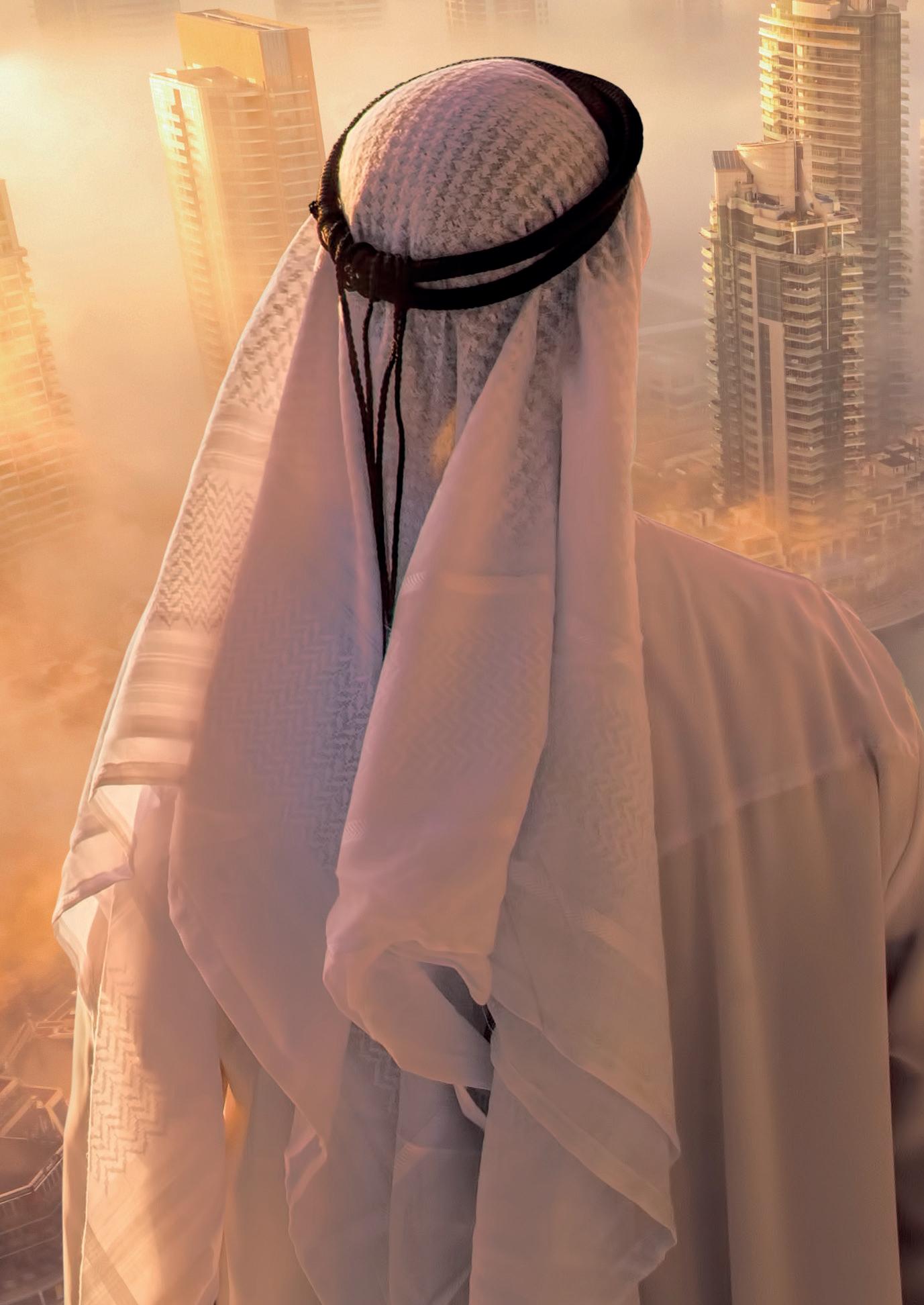
* Study trip NBU students to Dubai with dr. Haico Ebbers;
* Rob Huisman (19890519)/metromanager in Doha: no half measures;
* Klaas Keuning (20139947)/Shell: trained Iraqis for Basra Gas Company;
* Gerard Lubbinge (20040415)/Heerema Marine Contractors: uncertainty among young Qatari;
* Bartel Berkhout (20060402)/Sportsinq & Sports Leadership Institute: Dubai popular training center;
* Charles Menkhorst (19920932)/consultant in Dubai: container port Jebel Ali is world success;
* Remco Brouwer (2013341)/Hamad Medical Corp. Neuroscience Institute: it may cost something in Doha;
* Vincent Bouw (19990310)/Cleveland Clinic Abu Dhabi: mythical atmosphere of Baba Zayed;
* Eric Tolsma (19870531)/power stations expert: power stations for Kurdistan;
* Claudia Dayoub (20170803)/business talent: role model for Egyptian women.
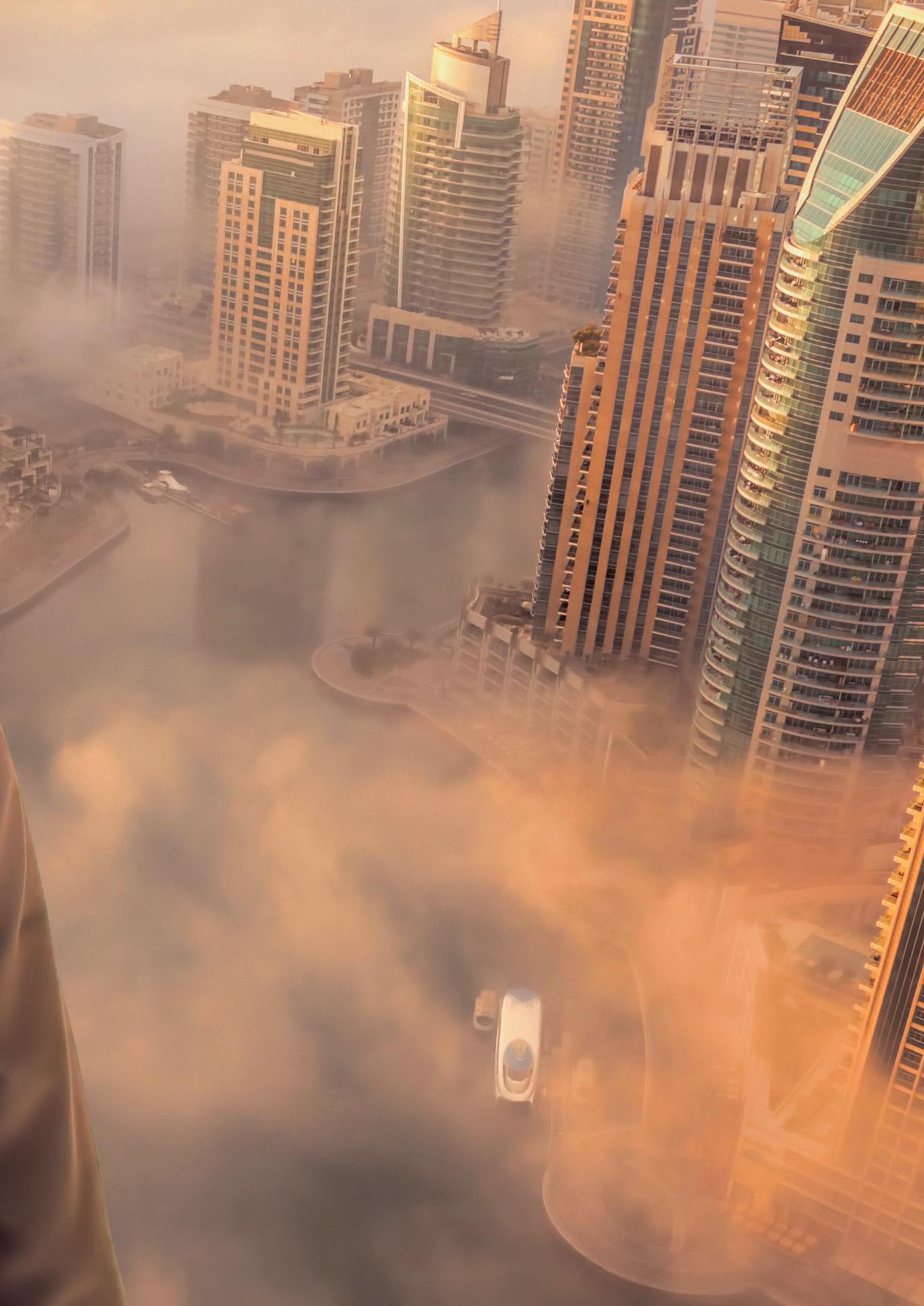
Saudi Arabia, the United Arab Emirates and Qatar are among the richest states in the world. Power is in the hands of a limited number of families who provide the ruling king and sheikhs. There is no democracy, but governance of state funds is at the level of the world's largest multinationals. Private investment companies are advised by former top bankers. In the process, progression in countries is tailored to future generations. In this respect, the Arabs progress. Kees Hoving (19870052), co/ceo of Deutsche Bank Middle-East & Africa explains relations in the Arabian Peninsula.
BY OELE STEENKSQ: Looking at the size of the economies of Egypt, and Iraq respectively, how do they compare?
KH: "The GDP (Gross Domestic Product, ed.) of Saudi Arabia (SA, ed.) is a fat $800 billion, the Emirates now sit at a GDP of over $400 billion. Egypt sits at a GDP of $395 billion, moving from position 2 to 3. Qatar now sits at $166 billion. Keep in mind that Qatar is a relatively small country. Iraq, meanwhile, sits at $190 billion. The countries that have oil resources and export oil naturally have a high GDP."
Q: Is it correct to say that SA is the leading economy in the Arabian Peninsula?
KH: "Absolutely, the economy is as big as the economy of Egypt and the United Saudi Emirates combined."
Q: How long can SA draw on oil and gas supplies?
KH: "My understanding is that they export 70% of their annual oil production; in addition they are large consumers of their own fossil fuel. If SA decided to start using all the oil itself, it could be 200-220 years ahead. If the current export volume of oil remains the same, there is a 50-60 year supply. This of course does not include any new sources of oil in SA. SA has just under 20% of the world's oil reserve."
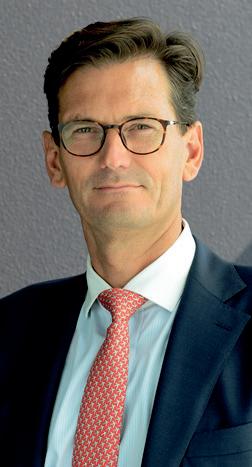
Q: What is SA doing to change the national economic model?
KH: "The Saudi government has a vision 2030 plan, seeking to diversify the economy. Of the GDP, 60% is currently made up of activities other than oil extraction and exports. That in itself is significant. The growth sectors are tourism, entertainment, transportation and mining. There is heavy investment in those."
Q: What are progressive infrastructure projects in SA?
KH: "New cities are being planned. One of the projects is called Neom. That is in the north on the Red Sea; it is to be a city to live, work and relax in. It will be a 'next level smart city' with a top level of health care. There will also be a large vacation park, The Red Sea Project, and a new vacation park called Qiddaya has been developed just outside Riyadh. The Saudis usually flew to the Emirates for their vacations. However, the government of Mohammed bin Salman (MBS) wants to keep its own people at home in luxury parks. There are about 10,000 princes from the royal families. The sons usually go to the United States to study at top universities. The aim of MBS is to employ as many representatives of the upper class as possible and make them fit for managerial positions. The investment in home schooling and universities was already good. This policy should be strengthened by bringing more university education to Riyadh."
Q: To what extent do the Saudis benefit from the war in Ukraine?
"In Dubai, it seems like the United Nations. I find it fascinating."
KH: "SA, of course, benefits directly from high oil prices, although the government doesn't show it. Many countries in the Middle East and Asia; and for example, India, Pakistan and South Africa say the war in Ukraine is not their conflict. Those want to take a neutral stance. While they do condemn the war, these countries don't necessarily want to go into a particular corner regarding Putin's war. And I can imagine that from their point of view."
Q: "So President Putin seems to have good relations with both SA and Egypt; what does this mean for geopolitical relations in the world?
KH: "I think the US and the EU have no choice but to maintain good relations with the states in the Arabian Peninsula. I just came from a big conference in Riyadh called Future Investment Initiative with a high level of speakers; it was about energy, climate, geopolitics and many other issues. Everyone felt free to express what they thought; sometimes it was controversial. For example, there was a table discussion with Jamie Dimon, the CEO of JP Morgan. The CEO of Blackstone, Stephen Scharzman was also there, as was Ray Dalio, founder of Bridgewater Associates; and David Solomon, the CEO of Goldman Sachs. It was mentioned here that it is the Western press that magnifies the tensions between America and SA. Jamie Dimon literally said, "SA and the U.S. are partners and between partners there may be tensions, but the partnership continues. Inevitably, the EU and the US will continue to support the Middle East. The big elephant in the room was China, especially now that Xi Jinping has been reappointed party leader and president of the People's Republic of China."
Q: Does such a summit specifically address the huge footprint China has in Africa? KH: "Yes indeed. The Chinese started systematically bringing raw materials into African states about 15 years ago. At first, no one in the West caught on to that process properly. A catch-up is now being prepared by the Western world, for which the EU has already released 300 billion euros. I will be in Johannesburg in December for a conference, where I hope further details will be announced. America too has now set up a separate investment program for Africa. As for SA's input, King Salman bin Abdoel and Crown Prince MBS especially support Muslim countries in Africa, especially when it comes to mining scarce commodities and infrastructure projects. To that end, SA as the largest country shareholder supports a surety fund, ICIEC, which I also work with, by over 20%. ICIEC takes over part of the credit risk in certain deals in Africa. By the way, the United Arab Emirates (UAE, ed.) is also now interested in investing more in Africa. A similar guarantee fund has been set up here, but it is not necessarily targeted at Muslim countries. In that respect, there are big differences between Dubai and SA."
Q: Egypt has received large loans from both SA and UAE; to what extent has this made Egypt a satellite state?
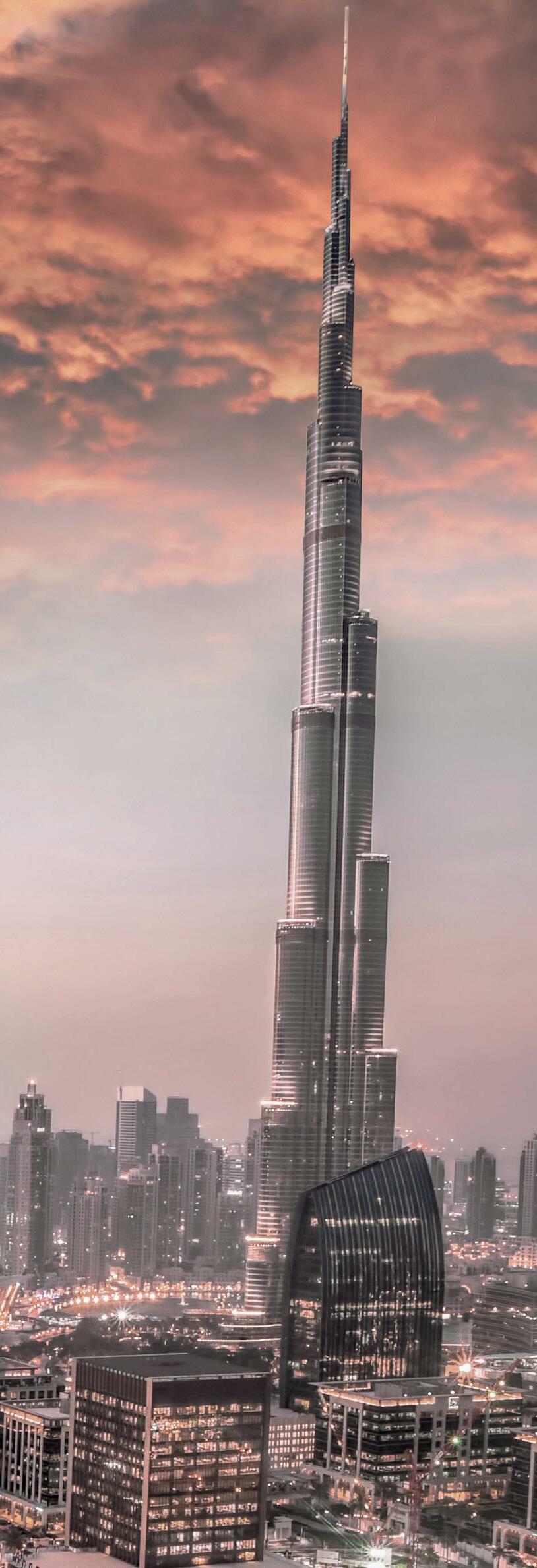
KH: "For Egypt, import prices of energy and food have skyrocketed, while their exports, the tourism industry, with a large share of Russian tourists, have collapsed. Egypt was importing $8 billion worth of goods monthly; that number needs to come down to $4 billion. The country is currently rapidly depleting its foreign exchange reserves, and then you automatically run into trouble. The IMF, meanwhile, is working on a recovery plan. Earlier, SA, UAE and Qatar provided loans to Egypt. Now these have taken the character of payments, for which they get back certain assets in Egypt. In this way, these neighboring Arab countries get a stake in Egyptian banks and companies. The amounts are not so much in the nature of a gift, rather an investment. For the neighboring countries, political stability in Egypt is super important. The last thing they want is for there to be unrest in Egypt again, by which I mean an uprising led by certain political parties, possibly supported by other countries such as Iran, for example."
Q: Recently a large amount of natural gas has been drilled in Egypt; what does this mean for the country's independence?
KH: "Egypt has the ambition to grow into an energy hub in the Mediterranean with the gas discovery, but it requires huge investments to achieve this. It will take at least three to five years before Egypt can actually start gas exploitation. Incidentally, Egypt shares the gas field with Israel, while off the coast of Lebanon gas has also been tapped. Israel and Lebanon, for example, have only recently agreed on dividing lines in the gas field."
Q: To what extent is SA inclined to apply a more relaxed handling with Sunni law?
KH: "Officially, a policy of women's empowerment has been launched in SA. For example, women can get driver's licenses, but I've heard that only a few hundred are available each year. So from that point of view, emancipation is going by mouth. Expats I speak to in the Emirates, but who have previously worked in Riyadh and come back there, confirm however, that society in SA has already changed tremendously. For example, celebrations are allowed, although alcohol consumption is still restricted. It is expected that when King Salmon bin Abdoel dies, MBS will
allow even more freedom. This is certainly related to the desire to receive more tourists in SA."
Q: Can you indicate the importance of Riyadh as a financial center of the Arabian Peninsula?
KH: "The government is working to strengthen Riyadh's financial position. It has stipulated that foreign companies and banks must have their regional headquarters in Riyadh by the end of 2024 to be eligible to bid for government tenders. You see more and more international companies opening headquarters in Riyadh. So senior management must be transferred to SA; on top of that, at least two other countries in the region must be managed from Riyadh. Meanwhile, SA has experienced significant population growth. There are now nearly 35 million Saudis and the ambition is to reach 50 million. That will be an interesting home market for the branches of foreign companies. On the other hand, you can use SA as a business hub towards Russia, Africa and the Far East. Now this function is fulfilled by Dubai. However, there is mutual tension between SA and UAE, because in Riyadh they want to bring some of that business to Riyadh. Right now I have nine countries reporting to me. For myself, this would mean, as co/ceo, moving my office to Riyadh and managing at least two countries from there. Then the rest of the organization could remain in Dubai. I am consulting with other banks on this, because it is not yet clear how hard the Saudis want to play this game. About six months ago, the Saudis published a list of 49 multinationals that would like to come to SA with a regional headquarters. The 200 international clients I serve from Dubai have not yet confirmed to me that they are indeed going. By the way, Deutsche Bank is already in Riyadh with 60 people, making us one of the larger financial parties. There is definitely a direct correlation between our local presence in Riyadh and the business that we get and we see other banks expanding in SA as well."
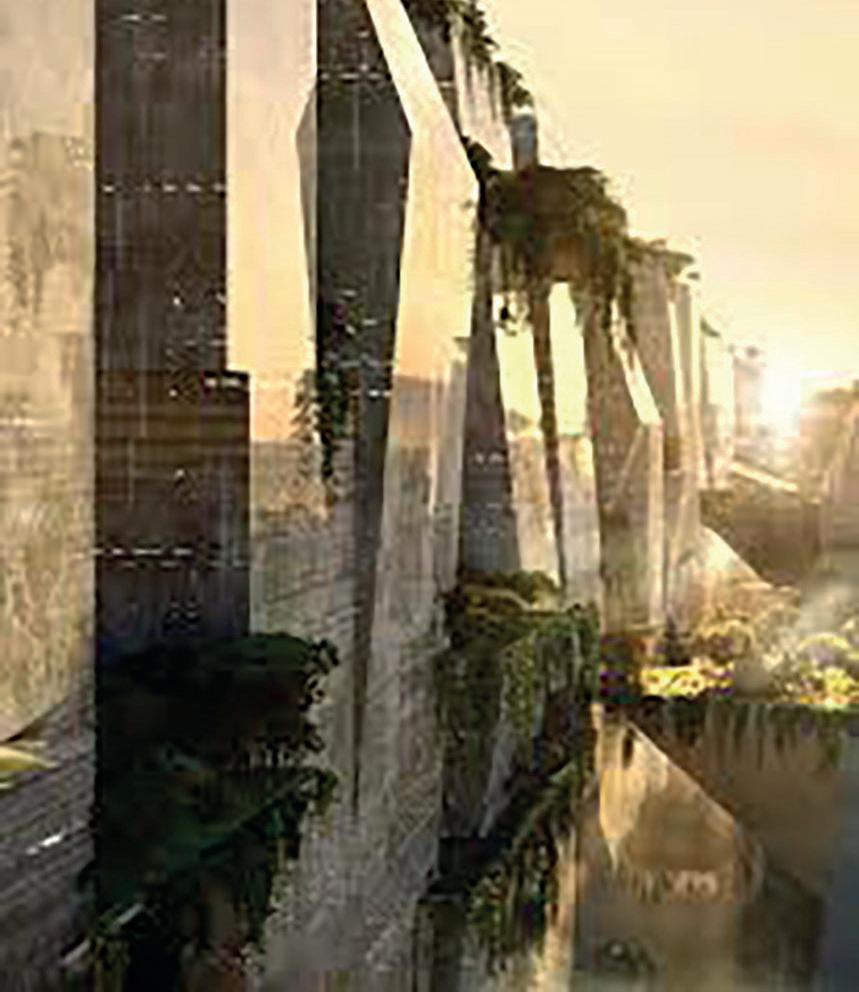
Q: What have been the consequences of the boycott of Qatar by SA, the Emirates, Bahrain and Egypt?
KH: "We have seen before that it is unfavorable for the whole region when countries boycott each other. We experienced that with the boycott of the Arabs against Israel. Now that relations have improved, Israel is investing like crazy in the Arabian Peninsula. It is unprecedented how much money is being pumped into this region from Tel Aviv. What the damage is from the boycott against Qatar is difficult to assess exactly. Qatar has made large investments in Europe and the US. The Qatari are also among the largest shareholders in Deutsche Bank. This is a small country so I think the damage done per capita is limited. It is rather that there has been reputational damage for Qatar, particularly because Qatar Airlines was not allowed to fly over the peninsula and had to use all sorts of complicated approach routes."
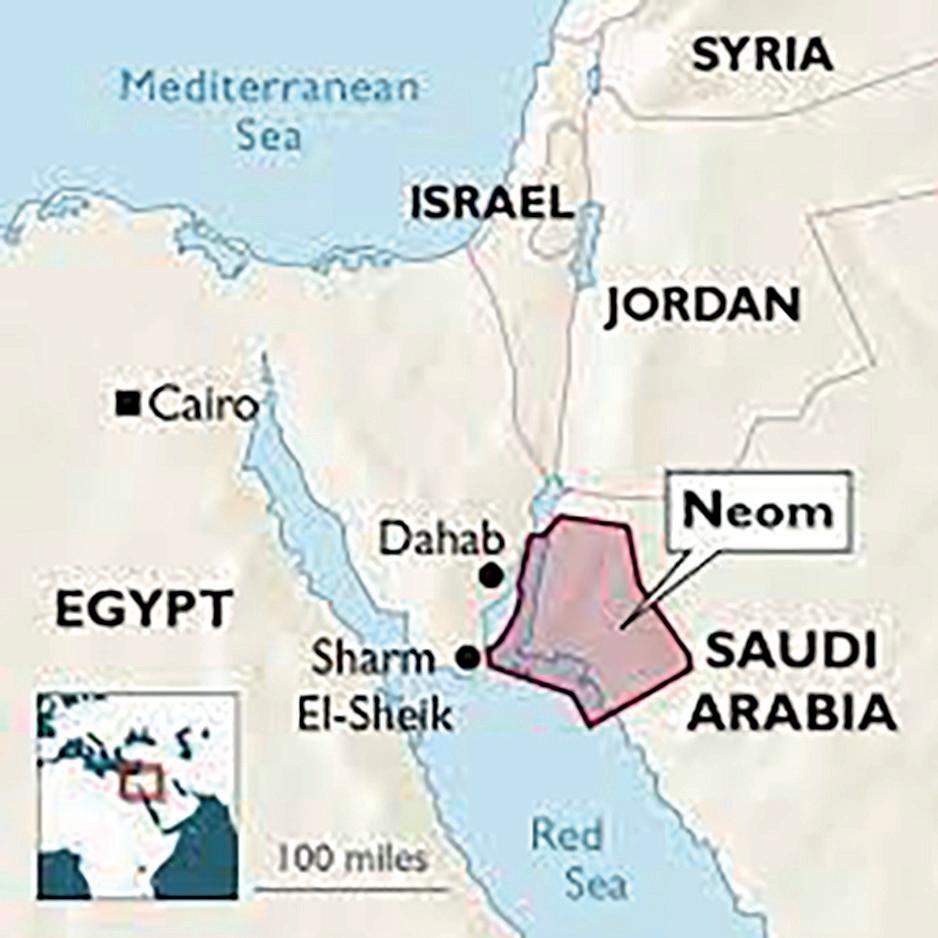
Q: Can you outline the Al Maktoum family's power over Dubai?
KH "The Sheikh Mohammed bin Rashid Al Maktoum and his two sons; that's just the power in Dubai. This state has no democracy, but is run like a corporation. I know some senior officials who work with the sons. They are smart guys, who for every part of business operations are hiring the best experts and consultants. They want the original Emirati to benefit from the wealth and live a pleasant life. Here in Dubai there is also a circle of families who are more or less in control, although the influence of Western companies has increased. If you come to Abu Dhabi, the power of a few families is even greater. Those family members have taken management positions based on lineage and are insanely rich. By the way, the founder of the UAE, Sheikh Zayed bin Sultan Nayhyan of Abu Dhabi, had an important business vision for the Emirates. Half a century ago, he posed with bulldozers in the desert beginning preparations for modern Abu Dhabi. Zayed understood even then that he needed to diversify the economy with the oil wealth. He began by using the oil revenues to build infrastructure. He did that brilliantly."
Question : Dubai has a large list of Emirati private companies with names such as Majid Al Futtaim, Al Ghurair Group, Al Futtaim Group, Lulu Group and Landmark Group. Furthermore, Dubai has as many as 485 Middle-East investment companies. To what extent are these companies accountable to Mohammed bin Rashid?
KH: "You have to look at it this way, the sheikh lets these often very smart guys do their thing unless they do things that go against the general interest of Dubai. Somewhere these people are connected, but you can't always get your finger on that as a Westerner, but it strikes me again and again that things are very well aligned in Dubai. One example is the growth of energyintensive manufacturing, which is booming in Dubai. All the manufacturing industries that have problems elsewhere with skyrocketing energy prices, they want to accomplish here in the industrial area above the city of Dubai. Especially if it is in line with transportation, container industry and shipping. And don't forget that the processing of steel and aluminum is an
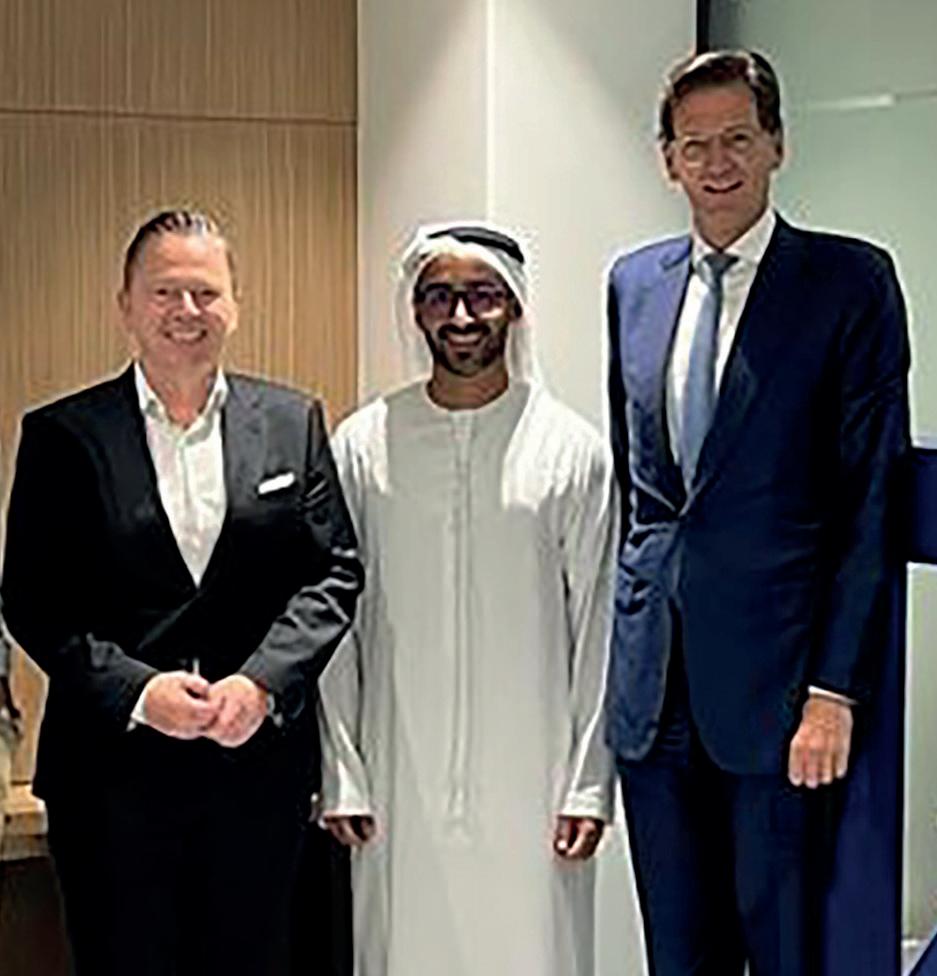 Kees Hoving visits the Deutsche Bank office in Abu Dhabi for consultations with executives.
Right against Israel and Egypt, a new city NEOM is being built; Saudi Arabia's prestige project.
An impression of the new living and working in the desert.
Kees Hoving visits the Deutsche Bank office in Abu Dhabi for consultations with executives.
Right against Israel and Egypt, a new city NEOM is being built; Saudi Arabia's prestige project.
An impression of the new living and working in the desert.
important precursor to the booming construction industry."
Q: Can Dubai be considered the Arab center for academic education and what is on offer?
KH: "There are several foreign universities that have branches here. Well-known names are American Dubai University, the Higher College of Technology, University of Dubai, Canadian University, British University and Rochester Institute of Technology. Top professors from the West are brought there. We see that mostly Russian students come to Dubai and not to Riyadh. There is mutual respect between the two centers, but for now Riyadh cannot match the luxury and personal freedom offered to young talents here. There is healthy competition academically between the two countries. I have heard that the Al Maktoum family is not too worried because Dubai's lead is huge. Although the climate in Riyadh is just a little more pleasant. Remember that from Dubai to Riyadh is an hour and a half flight north. The humidity here is significantly higher than in Riyadh, which has a more pleasant and dry desert climate."
Q: Dubai has 28 hospitals and ± 1400 medical clinics; is it the capital of medical tourism?
KH: "I myself have had to deal with that a few times; fortunately not for anything serious. It's great how quickly you can be helped. For treatment at the hospital, an appointment within two weeks is the norm. At a dental office, you can even get an appointment within an hour. I think the prices charged are not too bad. What matters is the quality of treatment. As an employee of Deutsche Bank, I am helped by German or South African doctors who are here. Grossly, there is a lot of medical supply in Dubai, but the quality is a mixed bag. You do have to know who is going to treat you. Some of the care is indeed geared toward medical tourism, for example, for the insertion of an artificial knee, combined with a luxury vacation. Dubai is not unique in that, by the way; Turkey and Thailand also profile themselves as countries with luxury medical clinics."
Q: Dubai has a significant percentage of British expats based on its history. Does the UK still have more influence on Dubai than other states?
KH: "The sphere of influence today has to do with the international US passport, which requires US expats everywhere to pay taxes to the US. Recently, this also applies to residents of India. For most other passport holders, Dubai is a tax-free country. Indeed, traditionally many British have been based here, followed by French, Canadian, German and Dutch. The English spoken here is also the British dialect. For the British, Dubai is an "easy move. By the way, there is a big run on Grenada. That island state is quite flexible in issuing a passport, allowing Russians and Chinese, for example, to travel more easily - that is, without a visa application - with their new passports, and Americans and Indians, for example, could avoid, but then they would have to give up their original passports."
Q: Dubai is not endowed with the revenue from oil extraction; this is offset by a thriving economy based on trade, tourism, aviation, OG development and the center function between the Western world, Arab countries and West Asia. How can you rank this?
KH: "It has just been announced that Dubai's budget for 2023 will be about $15 billion a year. So that money will not come from taxation, but from the operations of the Al Maktoum family government and local businesses. For Dubai itself, real estate is at the top of the list. They have the land, the desert so to speak. So that costs nothing. They build offices, hotels, apartment buildings and private homes using cheap labor from the Philippines, India, Indonesia or Africa. You can find anything about that, of course. If you buy something off-plan here you have to pay 40% to 50% upfront, the rest you don't pay until completion. That's not because the banks advance an amount, it's just their profit. Those real estate guys must be making huge money here. Then tourism comes in; fly to Dubai with Emirates and book a hotel. Now the thing is that the hotel chains here don't own hotels themselves. They just operate the buildings, because the real estate is mostly owned by Emirati. In the process, the owners also earn from hotel chains that want to upgrade. For example, the Rosewood is now called Waldorf Astoria. Furthermore, the chemical industry, the container industry and the commodity turnaround are major sources of profit here because Dubai is so strategically positioned on the sea route from Asia and to the west."

Q: Looking at Dubai's economic development from a medium-term perspective, what do you think contributes to permanent growth? To what extent are the Emirates capable of developing a sustainable economy?
KH: "What Emirates ultimately wants is to retain people. The visa system has been stretched tremendously. You can get a visa much easier and you can stay much longer these days. I now have a golden visa, a ten-year visa. Here on the streets you don't see old people yet. When expats are about 60-70 years old, they suddenly disappear. Furthermore, the sheikh wants people from
abroad to choose Dubai as their place of residence. That's why local education is so important. The idea of pension provisions is not in the business. They are starting to look at that cautiously. Many expats have not dared to buy an apartment here because the housing market could theoretically go down tremendously. I have now bought two apartments. The cost of living will go up over time, but there are neighborhoods where expats from India and Pakistan live. There you can do all your shopping inexpensively, and eat delicious food by the way. It is an international melting pot here; I live here as if I were in the United Nations of the Arabian Peninsula. I find that super interesting."
Q: In Dubai, there is a drive to be the biggest or the most expensive in the world: the Burj Al Arab hotel of ± 320 meters and a 7-star hotel, the biggest golf course in the world, the biggest shopping mall, the biggest indoor ski hall etc. Can you explain this drive?
KH: "It's all meant to enhance Dubai's appeal. It has to attractive to an international audience here; it's all marketing as a means to focus on the supply of real estate and fuel the local economy."
Q: To what extent is Abu Dhabi, the capital of the Emirates, different?
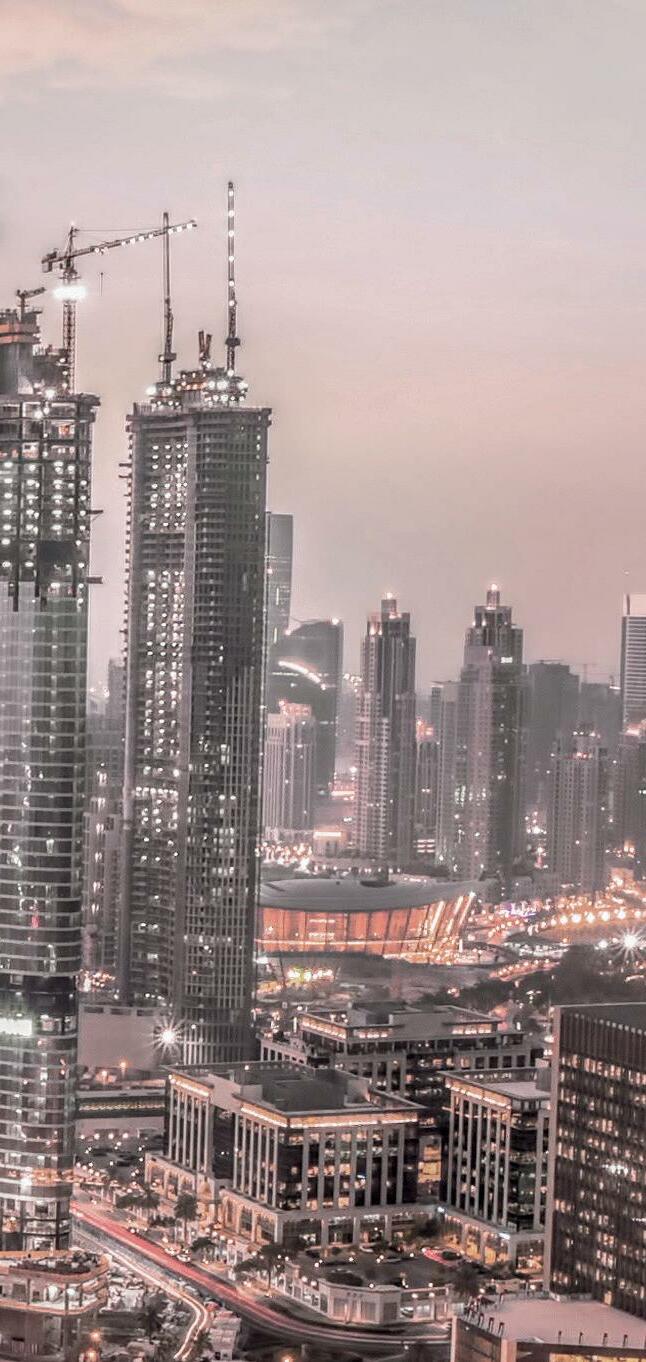
KH: "It is the government center of the Emirates. The atmosphere in Abu Dhabi is very different from that in Dubai. The sheikh there wants the city and the country to project a peaceful image. It is a fancy place. Abu Dhabi is calm, luxurious and very well organized. The city does not have the excesses of Dubai's nightlife. Nor do I have the impression that the sheikh there feels the need to imitate Dubai." ♦
In Oct 2022, a group of MBA students flew to Dubai for the Global Immersion Program. The trip was led by Professor Dr. Haico Ebbers. He arranged for us to visit several companies and engage in discussions with Nyenrode alumni there. The central topic for the trip was sustainability. Companies we visited included Deutsche Bank, led by co/ceo Kees Hoving, Nomura Asset Management, and SMBC. Former finance minister Jan Kees de Jager (19870056) welcomed us to his company Easy Generator. We also had lectures at the SP Jain School of Management, from Haico Ebbers himself and from Tim Rogmans, associate professor of Global Strategy at the Zayed University.
Dubai is no stranger to me. Besides having visited the city several times in my life, I also lived in Qatar for a time. As a result, the Middle East still feels like coming home. Now the focus was on the future of Dubai and what opportunities lie here in the coming years. Is it interesting to work in Dubai? And what role can Dubai play as a business hub between Europe and Asia? The lectures by our professors were complemented by an interesting guest lecture by Baskar Kilana on behalf of IT multinational Accenture. The program also included a visit to "Sustainable City.” A new place, close to the city of Dubai, which is completely sustainable in its energy and food supply. It provided an impressive insight into what cities of the future will look like. As a council member in the municipality of Stichtse Vecht, this was completely valuable to me. Needless to say, Sustainable City was the host of Gitex International. As a 'Dubai expert', I was declared local tour guide of the group. Filling in the free time alongside the 'serious' program was therefore no problem at all: playing golf at the Emirates Golf Club, driving an SUV through the desert, visiting extravagant shopping malls and luxurious sky lounges, we didn't get bored for a second!
BY PRITHVI KRISHNASWAMYI would like to thank NBU Program Management, Haico Ebbers and also Tim Rogmans for organizing this exclusive study trip to Dubai. It was unreal to see the developments in Dubai over the last 30 years to see and how the emirate is capable of creating an entrepreneurial ecosystem.
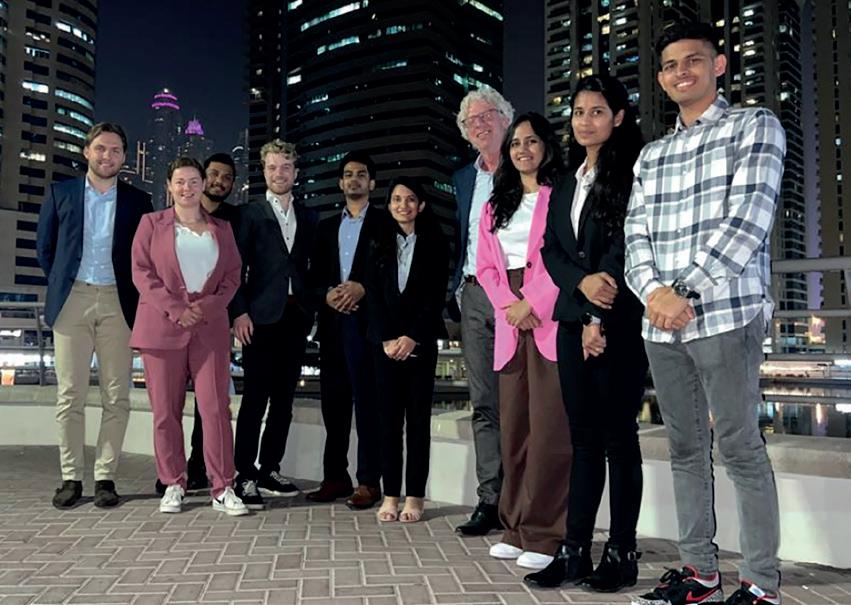
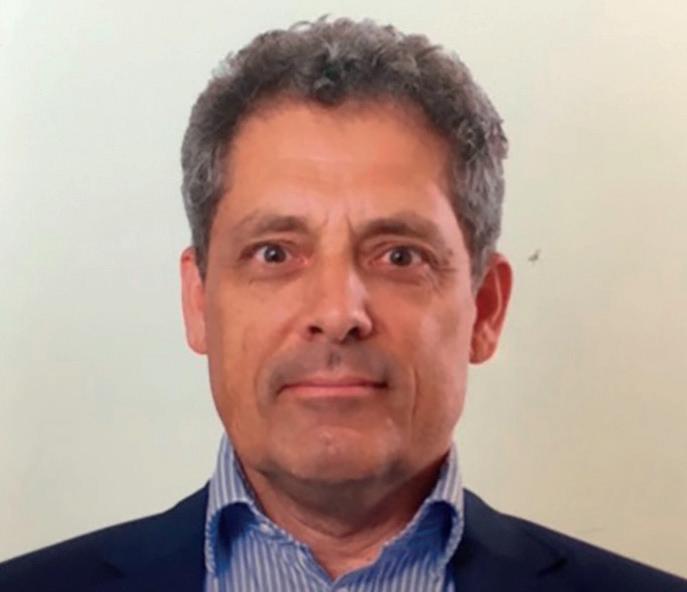
Qatar would be a speck on the globe if the peninsula to the Arabian Gulf would not have tapped a mega gas bubble. The emirate has professionally rigged a refinery for LNG production, a seaport and a fleet of LNG supertankers. With that it has become the white raven in the Arab world, which has just had a boycott of 4 years on it by surrounding states. Ing. Rob Huisman (19890519) is commercial manager of Qatar Railways Company, which has built a 75-kilometer subway line in seven years. " I think it's a relaxed country," said the Nyenrode alumnus.
BY OELE STEENKSQ: You are currently working in Qatar; what preceded this?
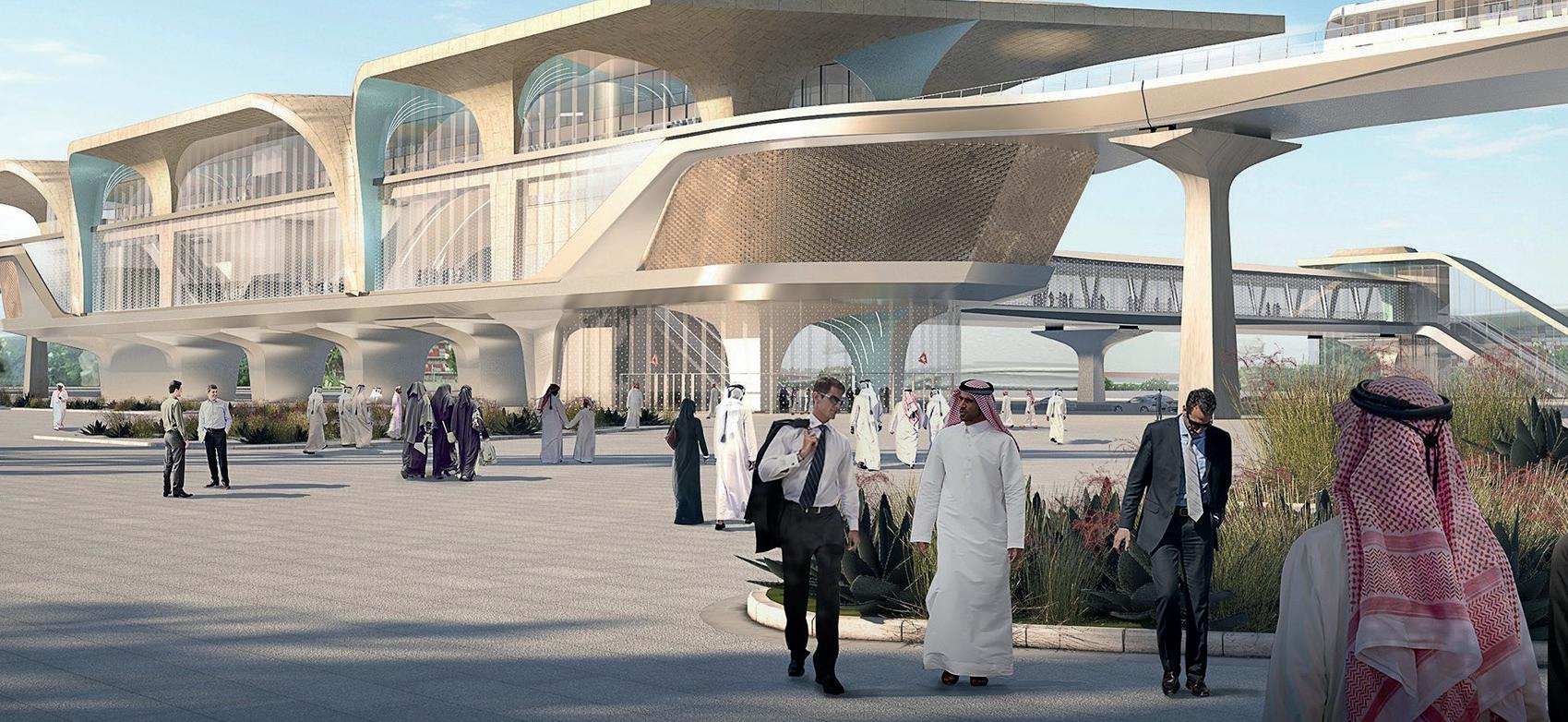
RH: "I studied mechanical engineering and then did a year of Nyenrode (CT). That was an interesting period in many ways. After college, I went to work for the engineering firm of Akzo, as the company was then called. Actually, I never worked as a mechanical engineer sec. Because of my Nyenrode background, I was always asked for management positions. At some point I joined the American engineering firm Fluor in the Netherlands. When Fluor won the management of a consortium for the construction of the A59, I was
assigned to the infrastructure projects branch. The biggest project I did for Fluor was the management of the construction of the HSL south rail line (125 kilometers of high-speed rail line between Amsterdam and the Belgian
border, ed.). There were billions involved, so the project was very interesting from a budget, cost and contract perspective. The HSL project started in 2001; it had a "design and build" phase of six years and then a maintenance phase of 25 years. In theory, I could have retired on that project, but it was not very challenging. A few assignments later, they were developing a rail line in Saudi Arabia (SA) from east to west, from Aman to Djedda. After all, the only infrastructure that SA has, in fact, is a road from coast to coast. Fluor was asked to serve as a project management consultant for the rail line project. A design had to be done and a project plan, with tenders, contracts, etc. In 2016, I spent six months in SA doing contract management for the project. After six months, it turned out there was insufficient budget with the Saudis.
A 1,500-kilometer rail link across the desert, where the Saudis wanted both a high-speed rail link and a freight rail line, costs billions of dollars, of course. The idea was shelved, although I understand the project has been picked up again with Chinese contractors. Exactly how things are going, I don't know, because SA is a tightly run
autocratic country, where it is difficult for outsiders to gauge how the government is thinking and the state coffers."
Q: How did you make the transition from SA to Qatar?
RH: "In 2017, I was recruited by Qatar Railways Company, where I knew some people who were in the senior management. I do the commercial management of the construction of several metro lines, including stations. This is a national metro project, which Qatar started in
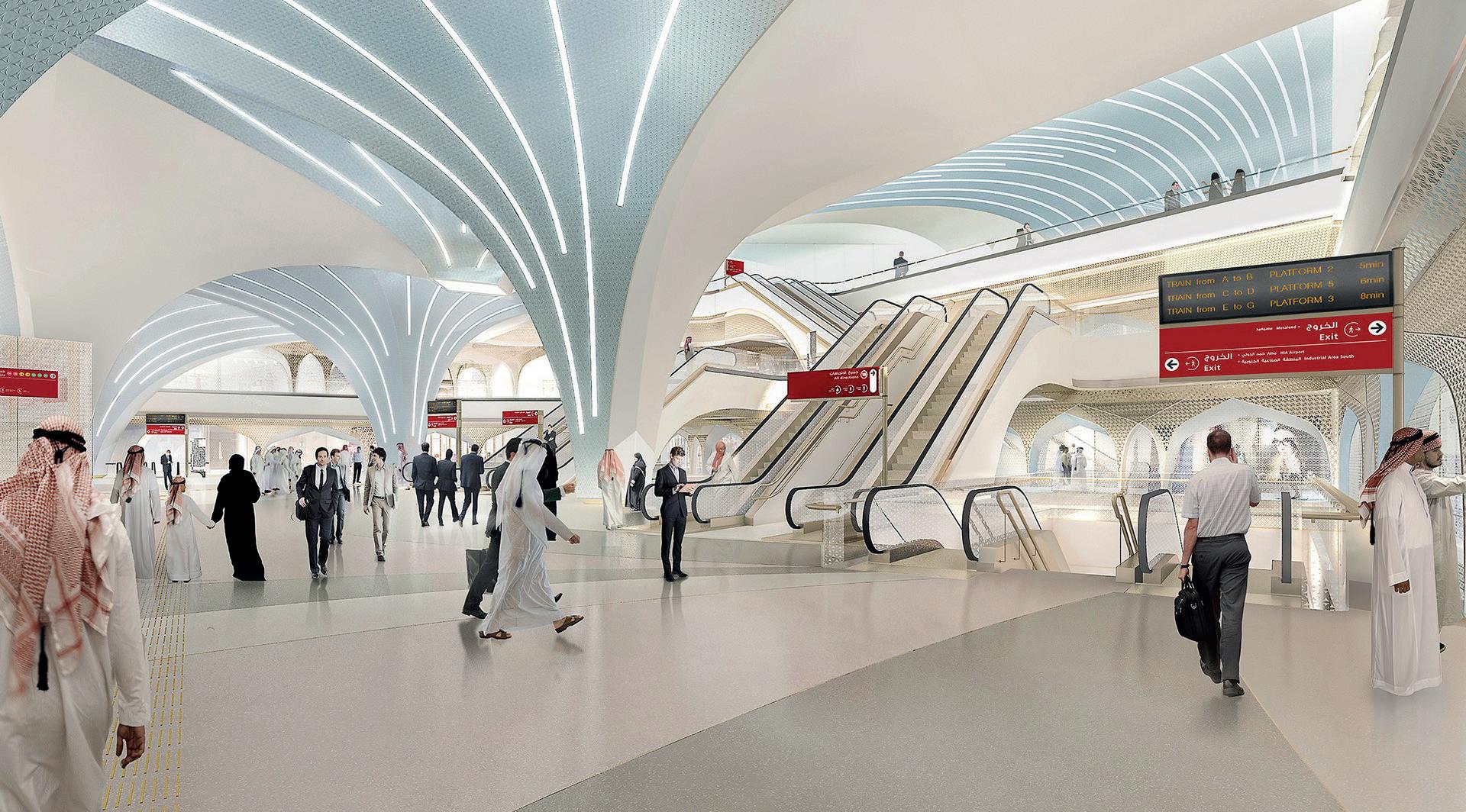
area, where a rail line makes no sense."
Q: What is your take on the background of the FIFA World Cup?
RH: "The fear image of Qatar is that as a nation they will possibly end up like Kuwait. That a neighboring nation, I won't name, thinks, that imaginary border in the desert I don't abide by that any further. In the oil and gas business Qatar was already an established name, but in the world not at all. Most Westerners had no idea where Qatar was before the Qatari were awarded the World Cup. Hosting all kinds of world
2012. The goal was and is to connect the eight stadiums where the FIFA World Cup Soccer will be played. The plan is to be able to transport 500,000 visitors a day. About $20 billion has been invested in the project, as delivered so far. Incidentally, $5 billion has been invested in the stadium construction and 125,000 hotel rooms have been added. You have to realize that in 2012 there was no public transportation in Doha, aside from a single bus line. And there were no tunnels either. Now there is 75 kilometers of rail line with 37 stations in the city and the periphery, where the smaller towns of Al Khor, Lusail, Al Wakrah and Al Rayyan are connected along the east coast. Eighty percent of the stations are underground. This has all been accomplished in about seven years, as the metro is actually running as of 2019. The operation of the metro system is owned by Qatar Railways, so this is a permanent income model for the state.
Currently, QRC is working to expand the network north and south. If you go west you end up in a desert
championships and major sporting events, has proven to be a perfect sign to give Qatar a certain standing in the world. For example, last year I went to the Formula One race in Doha. It took the emirate a long time to get that race here, but now Qatar did manage to secure a five-year Formula One contract. Interesting to note is that the circuit for it was built back in 2004. Furthermore, the World Cycling Championships have been here and we have hosted the Diamond League competitions for athletics. We also have top tournaments for swimming, tennis and golf. That you build a subway network, that you expand highways from two-lane to five-lane, that you increase hotel accommodation so much, it all fits into the strategy of putting Qatar on the world map. When the emirate sets its sights on something, no half measures are taken."
Q: Would you comment on the allegations that thousands were killed during stadium construction for the FIFA World Cup?
RH: "I certainly want to say the necessary
things about the working conditions during the construction of the subway. I can be quite annoyed by the Dutch press that seems sensationalist. Just to get to the facts; I am senior commercial manager, and have oversight of more than half of the $20 billion this project has cost. The contracting groups work primarily with workers from India, Pakistan and Bangladesh. The thing is that the expats were put forward by specialized recruitment agencies. So I see the employment contracts that were entered into, but I can't look into the history behind those employment contracts. We did conduct spot checks to see if the employment agencies were complying with the legal requirements when concluding employment contracts. By the way, we introduced a legal minimum wage last year to further improve working conditions. Yes there have been deaths, but less than a handful. When I look at the patriotic coverage, it is as if they were taken off the construction site in bunches. We paid strict attention to safe working and working conditions on our projects, for example, that people only went in with safety shoes and that crash helmets were worn. Constantly, we conducted labor inspections. If a worker wasn't wearing a helmet, he got a warning; on the second offense, it was straight out. Looking at the subway projects, I absolutely do not recognize that image of thousands of deaths. I had worked in Qatar before for Fluor; that was in 2013 and 2014. Back then, the emirate was already aware of the need to improve working conditions for expatriates. At that time, the government effort focused mainly on improving housing."
Q: Should Qatar's native population actually work? The domestic product per capita is a whopping $70,000. RH: "Good question; it's only 350,000. You have Qatari who are very smart and concerned about the fate of their nation. They put their heart and soul into their work. Then there is a part of the population that thinks if I get money from the state, I'll be fine. Those Qatari think they have the greatest right to drive the most expensive Porsches and that everyone should pull over for them. But those are absolutely not the natives who are in charge here. Those professionals have closed the ranks well. They run the country very tightly and neatly manage the huge revenues from natural gas extraction. But the wealth
is unprecedented. You don't have to doubt whether his Rolex is genuine. Consider further that the Qatari pay nothing for their utility connection; it's free. In the apartment where I live now, there is no gas meter, but there is a standard gas stove. For electricity I do have, by the way, and that's quite a bill on an annual basis, because the air conditioning is constantly on. Water is also not free, because every drop that comes out of the tap is desalinated seawater."
Q: What is it like to do business with Qatari?
RH: "The CEO of Qatar Railways is also the minister of municipality in the country. Think half a ministry of the interior. That man is highly educated and he certainly didn't become a minister because he has the right last name. So his name is not al Thadi and is a businessman who really doesn't give anything away. He has received the proper technical training. By the way, the emirate is ruled by Emir Tamin bin Hamad al Thani. As mentioned, under his rule, capable people are at the helm for the important things. The upper classes in Qatar still send children to top universities in England and the United States, but meanwhile leading universities have opened branches here in Doha. So university education is becoming accessible to more young people, spreading career opportunities better."
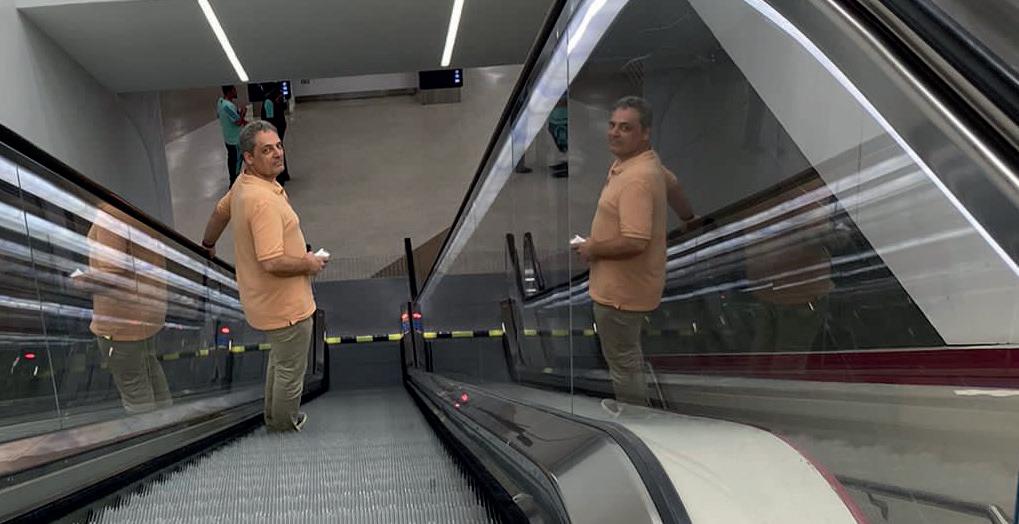
Q: what influence does Islam have on social life and on business life?
RH: "The biggest difference with SA is that in Qatar there is freedom of religion. There is no way to describe how big that difference is. In SA, everything closes five times a day. In malls, the shutters go down during prayer times. I was in Ryadh in a compound for expats, so social life there was very limited. There had also been some attacks earlier, making the army armed with machine guns a regular part of the street scene. To go to the office you have to pass a checkpoint and to go back to the compound you had to go through another checkpoint. This was for your safety, but it caused personal tension. Situations like that we don't have in Qatar, although, if you live next to a mosque, you do get called to prayer five times a day. You can apply for a liquor license here as a Westerner and buy a bottle of whiskey at a state store. Pork is
also available at the same store, as long as you are not a Muslim. Furthermore, there are many Western hotel chains here, where you can just order liquor. Social life takes place partly in hotel bars. However, I also often meet up with friends on the beach. If the coast guard is not around, you can have a quiet beer with each other there."
Q: What must you necessarily not do in Doha?
RH: "In a minor collision with a Qatari, you shouldn't get out and start cursing. That is clearly applying for a one-way ticket to prison and then out of the country within 24 hours. I'm not saying that the Qatari's word always counts more, but you shouldn't treat them unhealthily. You should also not make the wrong gestures, because something like that does indeed go wrong. Also, you should not drink a bottle of water in your car during Ramadan. Because during that period, police control is a lot stricter. For public intoxication you can be picked up by the police and you may sleep it off in jail, but then you are sent home with an admonishing speech. I have lived in Qatar for seven years and have always found it a relaxed country."
Q: Political tensions existed between SA, Egypt, Yemen, Oman, and the United Emirates on the one hand and Qatar on the other, leading to a boycott of Qatar. What did you notice about the boycott, from 2017 to 2021? RH: "The tensions can be traced to the
differences in Islamic teachings. SA and other states are based on Sunni teachings, while in Qatar Shiite Islam is adhered to. In addition, Qatar is a lot freer and more developed in a Western cultural sense. This state takes an independent stance, while a state like Dubai is more on the leash of SA.
Furthermore, Qatar would not have shown the right attitude according to SA, in condemning Islamic terrorism from Iran. That's quick to say, of course, but Qatar and Iran share the gas field under the Arabian Gulf. So the emirate had to be careful in judging, let alone condemning, such a powerful country. The fact that Qatar supports the Islamic Brotherhood does the issue no good overall, as SA supports the other side. SA closed the border with Qatar overnight in 2017. Then it was make or break for Qatar, as sovereignty was at stake. The boycott was announced on a Monday, after which the shelves were completely empty by Monday evening. The next, everything was back there in the supermarket. Now the issue has been settled and we can fly in all directions from Qatar again. The fact that until before the boycott in 2017, most imports went through SA, created a backlash in Qatar. The Dubai seaport was the transportation hub for the entire Middle East and that link has all but disappeared. I fear for the other
states, that Qatar ultimately gains the most from the issue. The Qatari built their own seaport south of Doha between 2010 and 2015, which is now fully operational. Goods previously shipped from Dubai's container port are now shipped directly to Doha. For supplies of dairy, vegetables and
owned. The entirety of investment companies is a tightly managed pyramid, suspended by the government."
Q: What does Qatar mainly do with Europe and the U.S. when it comes to LNG exports?
meat, the Qatari have also taken no half measures. They have started flying in 5,000 Friesian cows. At a very rapid pace, they have created their own agribusiness out of the ground. Of course with help from the Netherlands, because many a consultant in the field of agriculture and horticulture was flown in from our country. In two years they developed that entire industry. The milk you now buy in the supermarket just comes from Qatar."
Q: Qatar has a fixed exchange rate for its currency, the rial, with the U.S. dollar. How important is this to the economy?
RH: "That exchange rate is crucial to the economy. Since the country receives by far the most revenue from oil and gas exports in U.S. dollars, it is not that difficult for Qatar's central bank to maintain that peg. Only during the period of the blockade, it took an extreme amount of money to support the rial. Now the money is really flowing in through LNG exports. Not for nothing, German Chancellor Olaf Scholz visited here, after which Tamin bin Hamad al Thadi proclaimed after two days that Qatar is going to invest billions in Germany."
Q: Can you indicate how far Qatar has penetrated as an investor in the Western world?
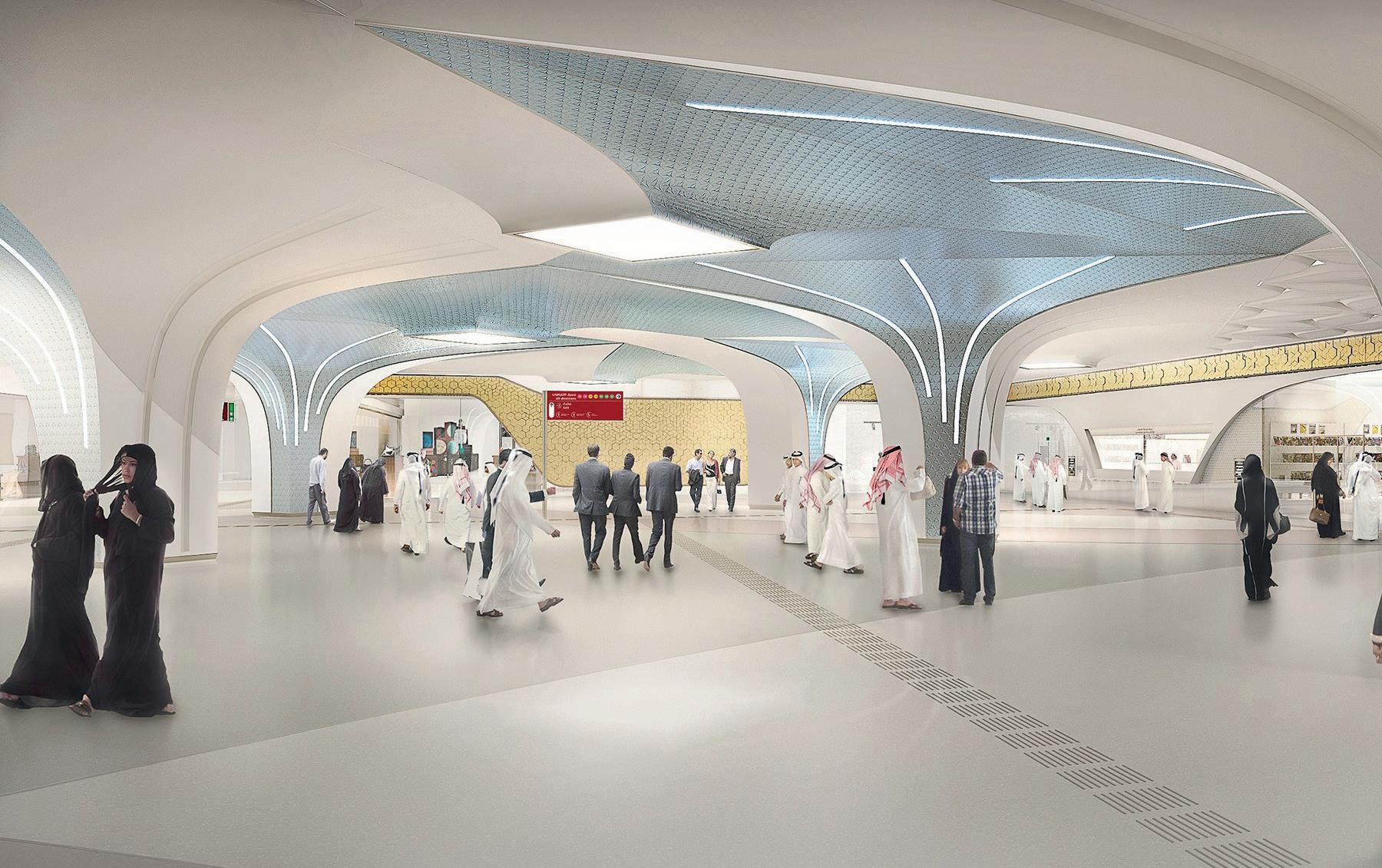
RH: "All foreign holdings are managed from the Qatar Investment Agency, including all-slate of investment companies have been put up. Qatar's influence now extends very far. 15% of Volkswagen, for example, is owned by Qatar. Soccer club Paris st. Germain is owned by Qatar. The famous Harrods department store in London is Qatar-
RH: "Originally America was the main buyer, but when shale gas extraction became a big business there, Qatar had to look eastward, because at that time the Qatari could not suddenly supply three times as much gas to Europe. Asia was then an emerging major market, thus large long-term contracts were signed with China and Japan. Now Germany, in particular, is desperate for additional gas and Scholz's visit did produce results. However, it is not as if Qatar can suddenly turn the gas tap twice. Furthermore, Qatar is not interested in connecting to pipeline systems. The emirate has invested heavily in liquefying natural gas, and it has had a fleet of LNG tankers built to transport that fuel around the world. It has also built the necessary port facility here to service the tankers. That investment has to be recouped."
Q: Air pollution is a problem in Doha; what are the causes?
RH: "Don't forget that 90% of Qatar consists of desert. If the wind blows from a westerly direction then there are considerable dust clouds in the city. That dust is a bigger problem for residents in human terms than CO2 emissions. The fact that Doha has a three times higher CO2 production per inhabitant than an average western city is due to the use of air conditioning and
the desalination of seawater. The cars being driven also produce more emissions than the average Western fleet. In addition, of course, along the coast you have that huge oil and gas industry. From October to April the temperatures here are bearable and the climate is quite stable. Then you can go cycling, for example, which I like to do. In the end, you only have about four months when it's not nice outside."
Q: What do you gain from your Nyenrode education in your current job?
RH: "I started, of course, at an engineering firm, where I still relied heavily on my technical knowledge. As I moved more and more into upper management, I benefited more and more from my CT training. Without that complementary baggage from Nyenrode, this position would not have been attainable."
Q: Can you tell something about your private life?
RH: "I am married and have three children. My wife has a job in the Netherlands and the children are in the various universities there. The whole family has a residence permit for Qatar. I go back home once every two to three months for a week. Conversely, my wife comes over from time to time, for example, she is coming to Qatar in half a month for a week. By the way, she has explicitly stated that she is not interested in the World Cup. It is not an ideal situation, but the challenging scope of the project and the accompanying emoluments more than compensate." ♦
Working in Iraq means dealing with bureaucracy and syrupy officials, but the country has a younger generation with ambition to build an international position. The amount of oil and gas in the ground should guarantee the development of a modern country.
Klaas Keuning (20139947) was able to work intensively for Shell for two and a half years on a local procurement team for the Basra Gas Company. He went out with guards, but did not feel unsafe. His team included Iraqi talents whom he trained for future management positions.
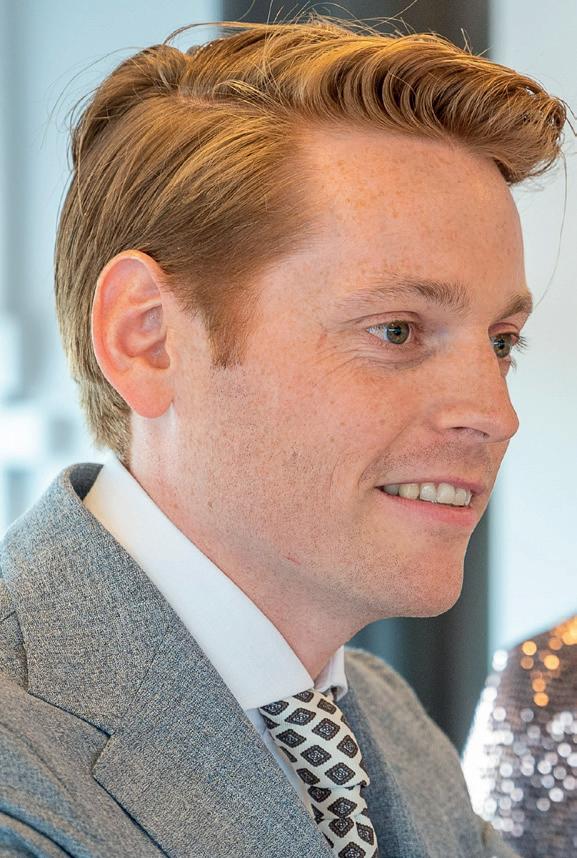
Q: You work for Shell and have worked for some time in Basra, Iraq? What was your position?
KK: "I worked in Iraq for over two and a half years as a procurement manager. I flew in from the Netherlands, worked 12 hours every day for a month and then I flew back and had four weeks off. I was responsible for purchasing materials, from paper to all the materials Shell uses for local production from valves, spare parts for compressors to even storage tanks. In the beginning I did it all myself, but I was able to put together a team of Iraqis who worked for me. I had to train them so they could eventually take over my job. The level of education of these Iraqis was decent, although you can't compare a degree from a university or college there, with the Western standard. Around the outbreak of the covid pandemic, I was sent home and changed jobs. I was also ready for a new job, because the rigidity of working in Iraq was beginning to bother me. Upon my return, I spent a year participating in the reorganization that had been initiated to deal with falling oil prices due to the corona crisis. For the past year and a half I have been working in an offshore wind team, again on the supply chain management side."
Q: Oil production in Iraq is owned by state-owned Iraq National Oil Company. How does this model work for an energy company like Shell?
KK: "Shell was in it in two ways. We were operating an oil field owned by Iraq National Oil Company. We had full
operations there, meaning that almost one hundred percent Shell employees were active there. I myself worked for the Basra Gas Company, which does not do oil, but is purely engaged in processing gas, the gas that was first flared off we now convert into gas that can be used for power generation, among other things. It was an Iraqi state-owned company, but now Shell has shares in it. Shell has 44% of the shares, Mitsubishi 5% and the Iraqi state 51%. Officially, the company is run by Iraq National Oil Company, but Shell is in it as a venture partner. To provide support, Shell provided what we call "secondees.” Specialists were loaned to help build the company. From the beginning, the idea was that I would transfer my knowledge to a team of local employees."
Q: Can you indicate the current importance of Iraq's oil production?
KK: "That's a very big business; you have an oil extraction field in northern Iraq, in the Kurdish part of the country. In the south is the second big field around the port city of Basra. Iraq is number two on the list of largest producers within OPEC. It is the main source of income for the Iraqi state. They have fought a number of wars and oil extraction is the way to finance that. However, there is hardly any refining industry. Despite large oil exports, the country is a net importer of oil products. It is a peculiar situation that Iraq exports oil to the other Gulf states, where it is refined, then Iraq imports the oil products, such as gasoline, diesel and kerosene."
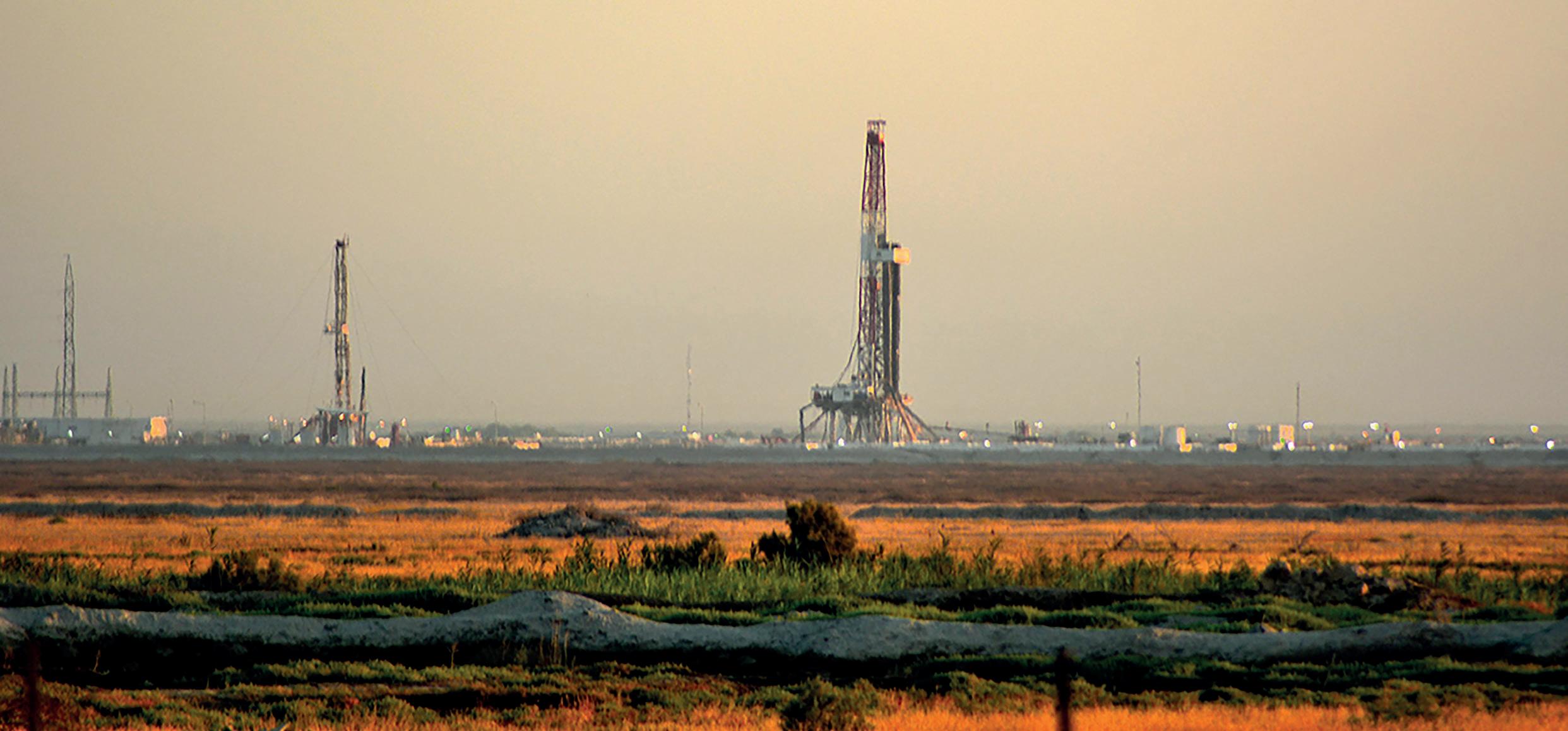
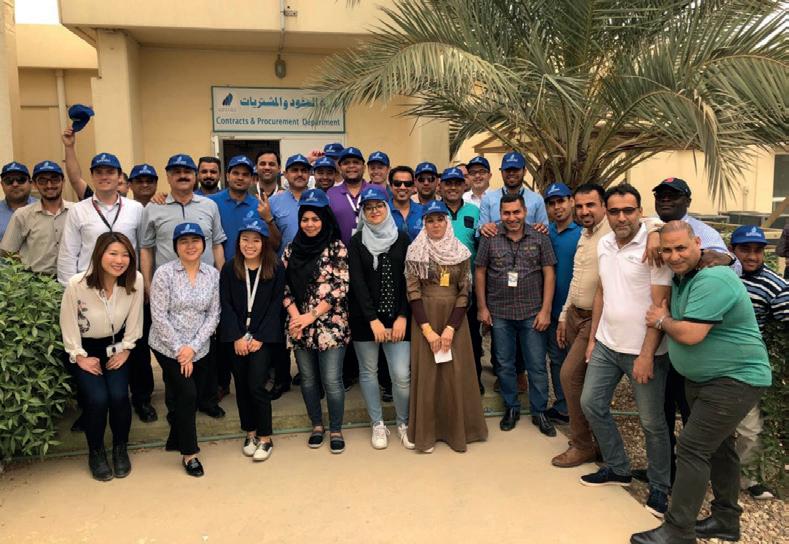
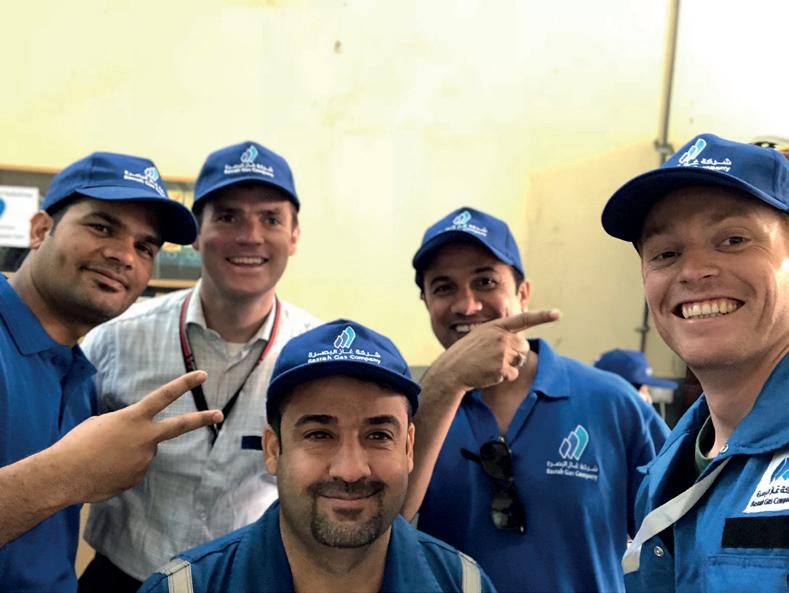
Q: At the turn of the century, Iraq built up a massive national debt of $120 billion. This debt was partially reduced through a Paris Club treaty. To what extent did you think that the country was in monetary distress?
KK: "There was a lot of unrest in the country because the social system was not in order. Corruption was frequent, which led to frustration among the civilian population. This in turn caused internal fighting.
Three years ago, the residents of Basra (population 1.5 million, ed.) took to the streets en masse to protest. These were protests that could get quite out of hand. I did not feel that there was a threat to Western institutions, but Shell did not take any unnecessary risks and constantly provided the right security. I experienced a few times that, as a precaution, I was not allowed to travel to Basra. The biggest problem for Basra residents was that the power grid was not stable. There were many power cuts. This was especially in the summer when it gets above 50 degrees in Basra. Most Iraqis have air conditioning in their homes. If those don't work it becomes untenably hot in homes. And in winter it can get quite cold in Basra, to just above freezing. Although gas is extracted around the city, Basra has no network for heating using natural gas. One would think that a country with so much oil and gas should be able to power every household. Basra Gas Company worked to solve this problem by processing gas into a product that you can reliably generate energy from."
Q: Unlike Qatar, natural gas production plays a lesser role in Iraq. Can you explain this?
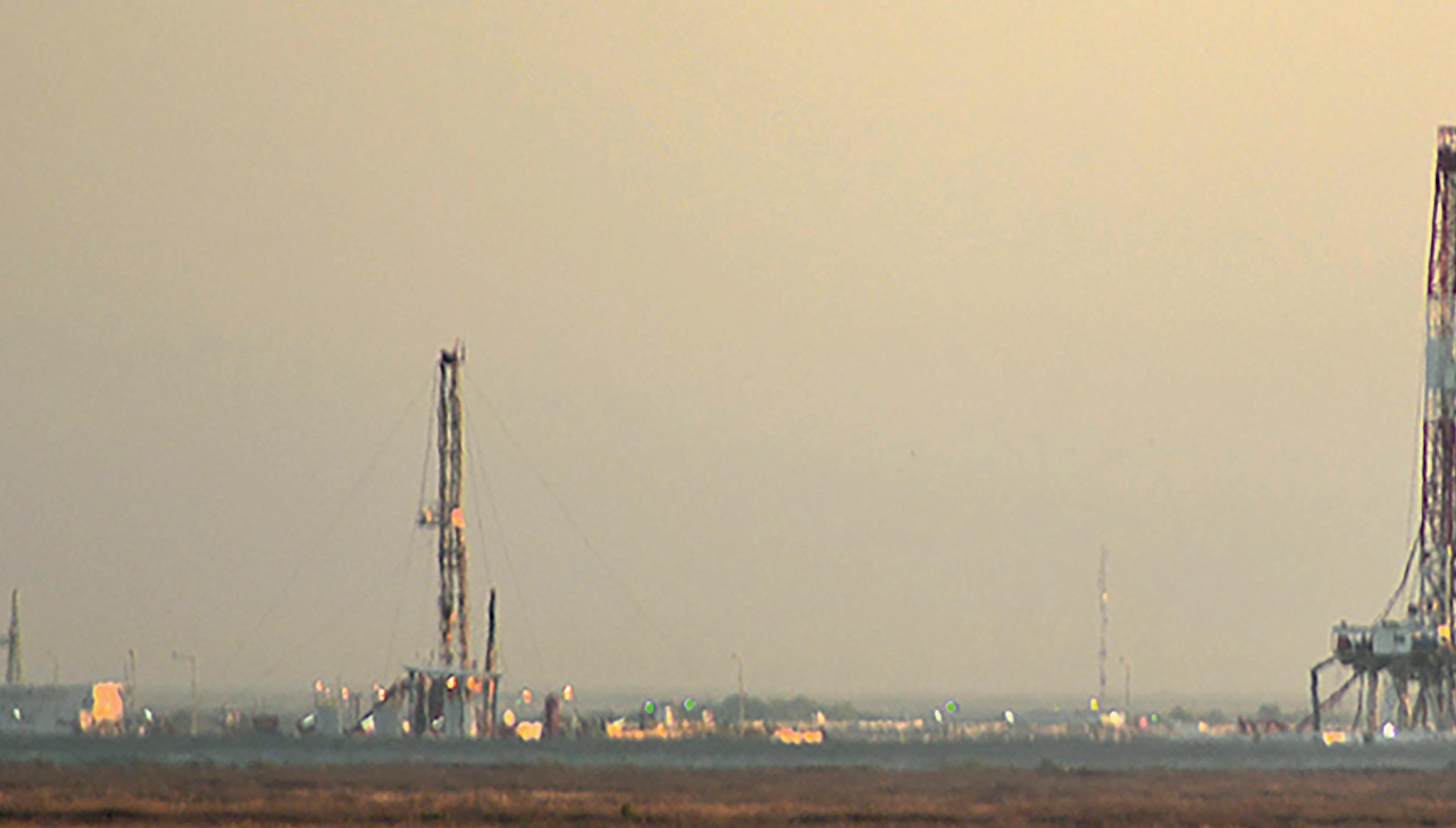
KK: "Qatar is very big in gas. It's really huge what natural gas reserves are in the ground there. But gas is definitely an interesting market for Iraq. Natural gas is released there as a byproduct during the extraction of petroleum. For a long time, this gas was flared. However, Basra Gas Company started capturing the natural gas and we channeled it to our two production plants in Basra. There the gas was converted into what is known as dry gas. Then we converted it into LPG, intended for both domestic use and export. And we made natural gas condensate used in chemicals. We managed to quadruple gas production in five to six years. In 2018, production peaked at more than 1,000mmscf/d, enough to power 3 million households."
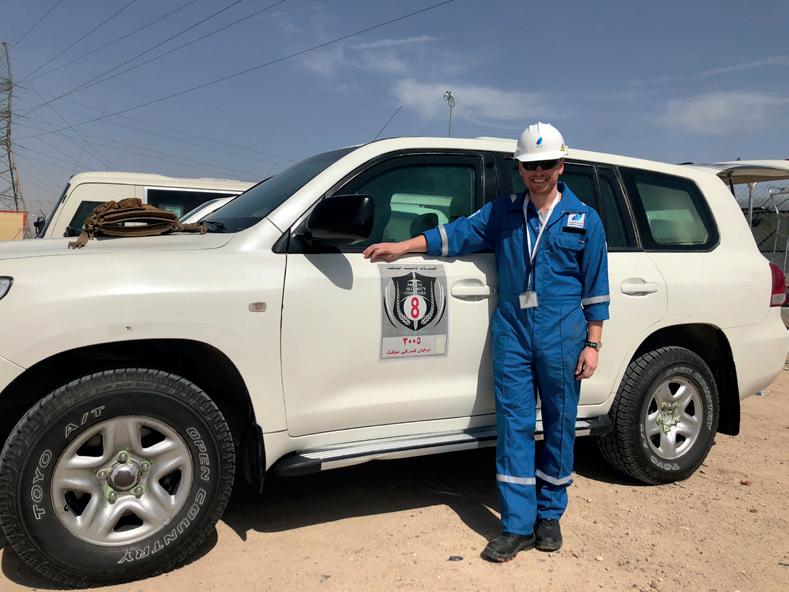 Klaas Keuning was a manager and mentor on behalf of Shell for Iraqis working for the Basra Gas Company.
Klaas Keuning was a manager and mentor on behalf of Shell for Iraqis working for the Basra Gas Company.
Q: 60% of Iraqis are employed in service delivery, does this indicate a bureaucratic system?
KK: "All the Iraqis we worked with internally were ultimately civil servants, because they were on the payroll of a state-owned company. There were certainly local companies operating in Basra, and from Shell we tried to encourage this. Of course, Shell works with international contracts for sourcing materials, but we were working specifically on what could be produced locally for us. We found good local suppliers who were not foreign-owned. We also worked with local trading houses that could do some of our sourcing and could take care of storage.”
Q: How can you characterize the city of Basra?
KK: "Basra is the second largest city in the country with a population of one and a half million. It is a sprawling city with a lot of low-rise buildings. Most residential houses are built of yellowish sandstone, but you have very modern buildings there as well. The soccer stadium is really state-of-the-art, because soccer is important to the Iraqis. The roads are of reasonable quality, although you have to watch out for potholes. Otherwise, a lot of trading takes place on the streets. Everywhere you see market stalls along the roads. People live more outside, although that in summer is mostly in the evening. The temperature can reach 52 to 53 degrees, but there is low humidity and lots of wind. You can best compare the situation to a hair dryer constantly blowing in your face. In winter, the temperature drops down to four to five degrees at night."
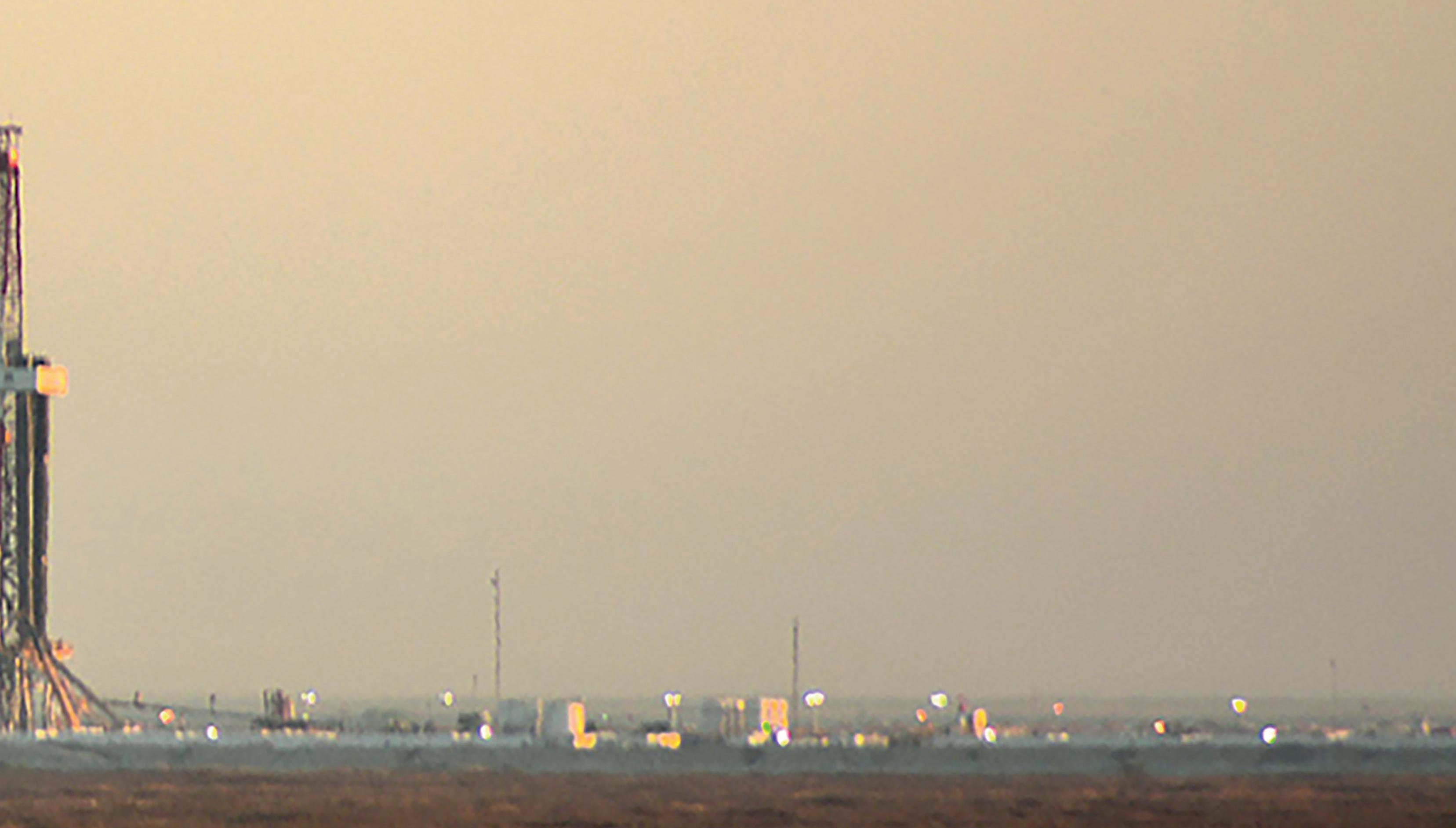
Q: How safe is it for a Westerner on the streets of Basra?
KK: "We were not allowed to go into town alone; it was done with security. If I had to visit a supplier, I also went there with security. It was not that ISIS was an immediate threat, because it was more in the north of the country. As an employee of a multinational company, you are basically a security risk. You are a Westerner, so it was more about the usual risks you experience in any developing country. I, myself, however, never felt unsafe. I found the Iraqi people to be incredibly friendly and welcoming."
Q: Syria and Turkey have built dams on the Euphrates and Tigris rivers, respectively. To what extent do these states control Iraq because of its water supply?
KK: "In any case, this was a big problem in Basra. Around the city it was once a green oasis, but because of the
dams, the water supply has decreased tremendously. This has created a barren plain. I wouldn't call it a desert; it's a big dried-up mud puddle. Nothing really grows anymore. The landscape is now defined by oil extraction plants."
Q: Historically, with Babylon, the first world city was founded in Iraq as the center of science and literature. Today's Arabic language originated in this region. What do you notice about this cultural legacy now?
KK: "Iraqis are very proud of their culture and their religion. They like to tell you about Islam. Ramadan was very important. We were encouraged as Westerners to participate in it. I found it extremely difficult to not eat and drink for a day. The Iraqis often brought breakfast for us, because that's how they charged themselves to get through the day, and they enjoyed letting us taste local specialties, such as falafel, foul, dates, masgouf and even sheep's head."
Q: What can and cannot be done in Iraq's social life? KK: "Although Iraqis are incredibly friendly, they are conservative by Western standards. For example, it is not normal for men to shake hands with women. Most women walk around veiled. Men and women live separate lives to some extent. It is very much appreciated, however, if you immerse yourself in the culture and learn a few words of Arabic, for example."
Q: Looking back on your time in Iraq, was it a great time or was it tough? KK: "Both, I think. I absolutely loved the experience, from which I learned a lot. I could wholeheartedly support the goal of turning a residual product, into something beautiful. Still, it was tough because business is a lot of bureaucracy. You have to talk to a lot of people to get things done. It doesn't mean there weren't results. When I arrived, tenders were routinely issued if we wanted to procure a product. In two and a half years, we were able to bring local parties into our operation and entered into longer-term agreements with them. The local guys working on my team were really able to make strides. Not that they could run the business right away, but there were some talents among them who are definitely going to be able to do that over time. The Iraqis I've worked with really have the motivation to make their country an international success, after all the internal entanglements that have damaged the country quite a bit." ♦
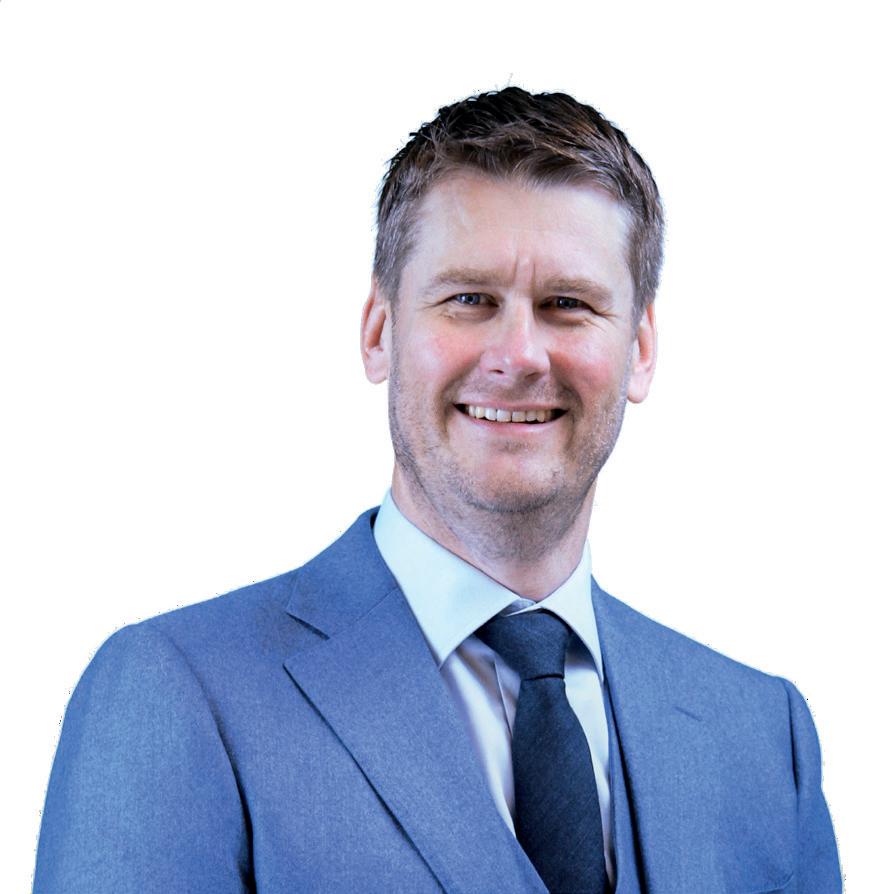
Qatar is not only in the news because of the FIFA World Cup, but also because of the supply of LNG needed to ease the pain of its energy conflict with Russia. The mini-state will increase gas exploration one and a half times. Ir. Gerard Lubbinge MBA (20040415) is setting up a local organization in Doha for Heerema Marine Contractors because when it comes to transporting and installing oil and gas platforms, Heerema is a niche player of international stature. "Thanks in part to my Nyenrode MBA, I can better understand the background and culture of the Qatari."
BY OELE STEENKSQ: You are Country Manager Qatar East for Heerema Marine Contractors. Which countries are part of the work area?
GL: In 2020, Heerema executed two projects in Qatar and I was asked to open an office in Doha. We are now one and a half years with about 10 employees represented in Qatar, our main working area. Indeed, the conditions in Qatari waters and the size of the platforms to be installed fit well with
the characteristics of our equipment. We have large vessels that require a minimum water depth. Our preference is to transport and install large and heavy platforms, because we can distinguish ourselves in this segment. In general, the waters of Saudi Arabia and the United Arab Emirates are shallower and the platforms to be installed smaller, and therefore our added value is lower. Nevertheless, we are also looking at opportunities in these countries. Furthermore, we are keeping an eye on developments in Iran. Qatar's gas field borders that of Iran, below the bottom of the Arabian Gulf. The moment this country would open- up, after the boycott by President Trump, there is quite a lot at stake for Western investors. Total Energies had advanced plans to develop South Pars, but parked them during the boycott."
Q: What is challenging about working in the Arab world?
GL: Actually, everything here is different from working in a Western culture. For that you have to go back in history. The Qatari are clans from the desert, accustomed to harsh living conditions and a dangerous environment. This is reflected in their basic attitude; suspicious, cautious, risk-averse. Not long ago, they rode camels through the desert. In case of contact with other clans, they would first reach for the gun, then talked. We're talking about a century ago at most. The Qatari are a minority in their own country; in total there are over three hundred thousand of them. Subtract the women, children and elderly men, and you are left with a small club to run this country. They have a large span of control and relatively little experience; the country has only been independent since 1971. They quickly rise to high positions and that does make it difficult for technical companies. You have to go to a lot of trouble to explain things that are accepted in the international oil & gas world. There are Qatari in high positions based on their origin, and not necessarily because of knowledge and skill. But there is also a group of young Qatari, educated in and familiar with Western foreign countries. They are highly motivated to contribute to the future of Qatar."
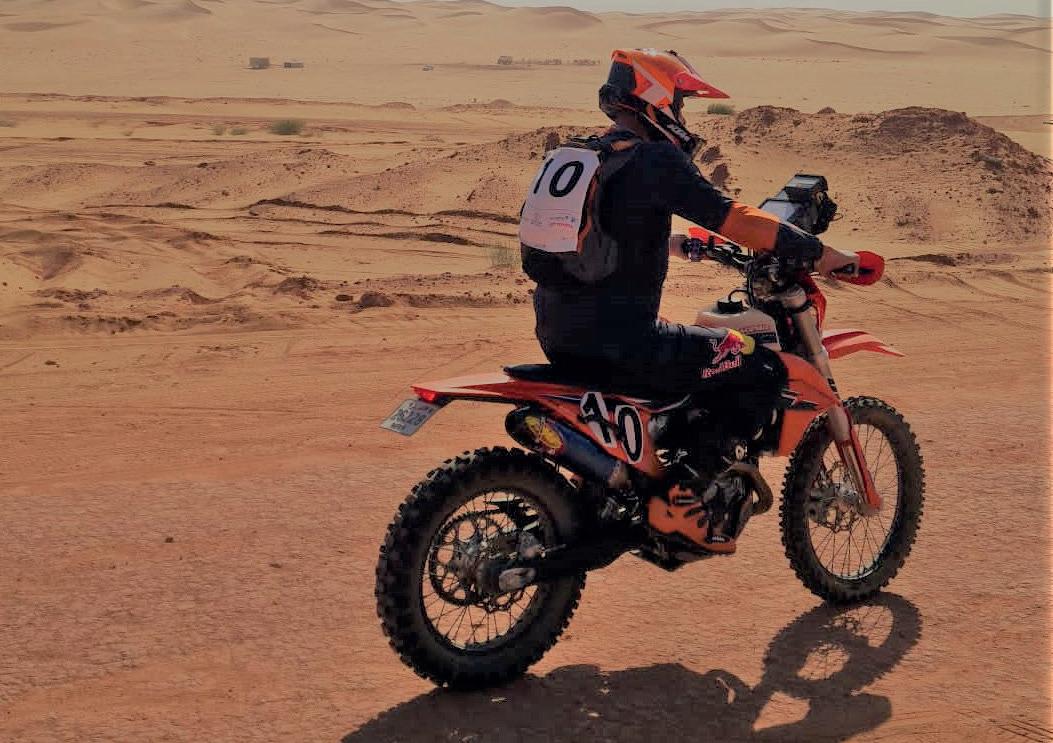
"I share passion for the desert with the local population."
"I have a lot of explaining to do here."
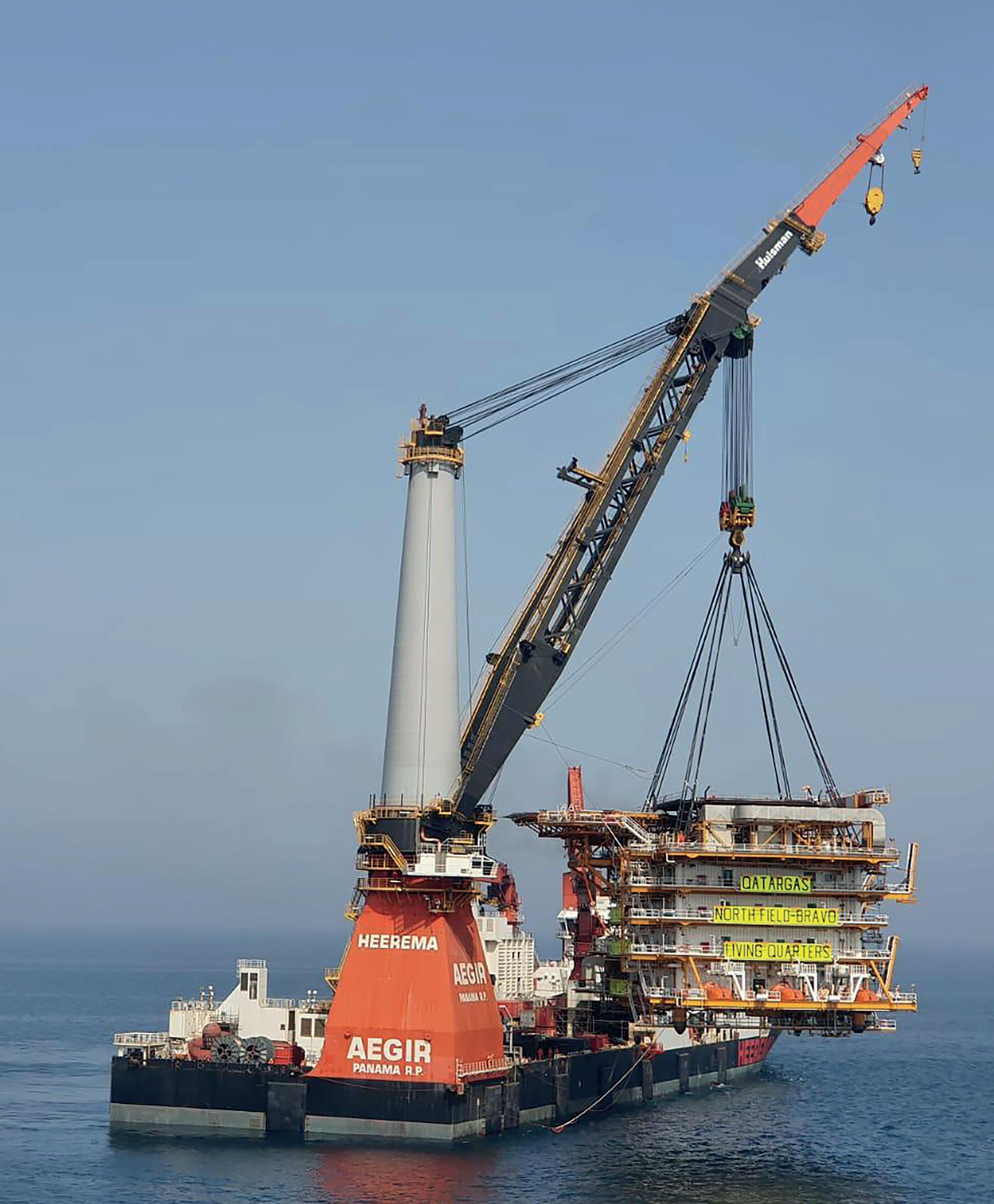
"A group of young Qatari hold high positions within state-owned companies, but you are testing their insecurity!"
Q: How does the gas industry in Qatar work?
GL: "The major Qatari principals are Qatar Energy, Qatargas and North Oil Company [70% Qatar Energy and 30% Total Energies]. These companies do business with so-called EPCI Contractors. These are international contractors such as McDermott from the US, Saipem from Italy, Larson & Toubro from India and fabrication yards from Vietnam, Singapore, Malaysia, China and South Korea. We do business primarily as a transportation and installation subcontractor to these parties, but of course we get to deal with local interlocutors. Then you notice that there is hardly any constructive cooperation between the Qatari and contractors, the focus is mainly on costs."
Q: You are Country Manager Qatar, what project or projects are underway in Qatar?
GL: "Next year we will bring the world's largest crane vessel SSCV Sleipnir to the Arabian Gulf, to execute two projects in Qatar and one in Saudi Arabia. And possibly another project in Qatar will be added. But Qatar has decided to increase its total energy production from 77 million tons per year to 126 million tons per year by 2027. This involves immense investments, for which tenders have begun. Very recently, Saipem announced that it had received a $4.5 billion contract from Qatargas, the largest contract ever for this Italian company. We hope to be able to contribute to the implementation of several major projects from 2025 to 2032. By the way, you also have to remember that production reduces the capacity of a gas field. To maintain production, so-called compression complexes must be installed. And to increase production, additional production platforms must be installed. There are seven to nine compression platforms planned with associated production platforms. For a compression complex, a total of about 100,000 tons of steel are required. As Heerema, we specialize in the transportation and installation of these large constructions, whose topsides weigh more than 30,000 tons. We have the ships and transport barges to transport, launch and install the jackets (the steel truss foundations) and topsides (for production or compression), via elevator or float-over. Few companies worldwide are able to do this."
Q: Is there local competition?
GL: "From Qatar itself we do not face competition, but there are some smaller fabrication yards. In the Emirates, we do have competition in the form of National Petroleum Construction Company. That is an Abu Dhabi state-owned company, which includes a dredging company. I do have to say that there is still some underlying suspicion between Qatar and the Emirates, due to the boycott by Saudi Arabia, Egypt, Bahrain and the United Arab Emirates (2017-2021, editorial). Qatar will be very reluctant to award large crucial projects to an Emirati state-owned company. This is considered too risky. For smaller projects, this applies to a lesser extent. On the other hand, the Abu Dhabi government is also investing heavily in future offshore oil and gas production in Abu Dhabi. To that end, the Abu Dhabi National Oil Company recently purchased a so-called drilling contractor."
Q: What is the international market like?
GL: "We transport oil & gas installations from Asia in particular, which we then install offshore here. In that combination, we are a unique niche player. However, we do face competition from suppliers of installation parts. In this industry you work in an international, but limited playing field, where you are competitors one day and partners in a joint project the next. We need each other because these are unique and large projects that require capital-intensive equipment."
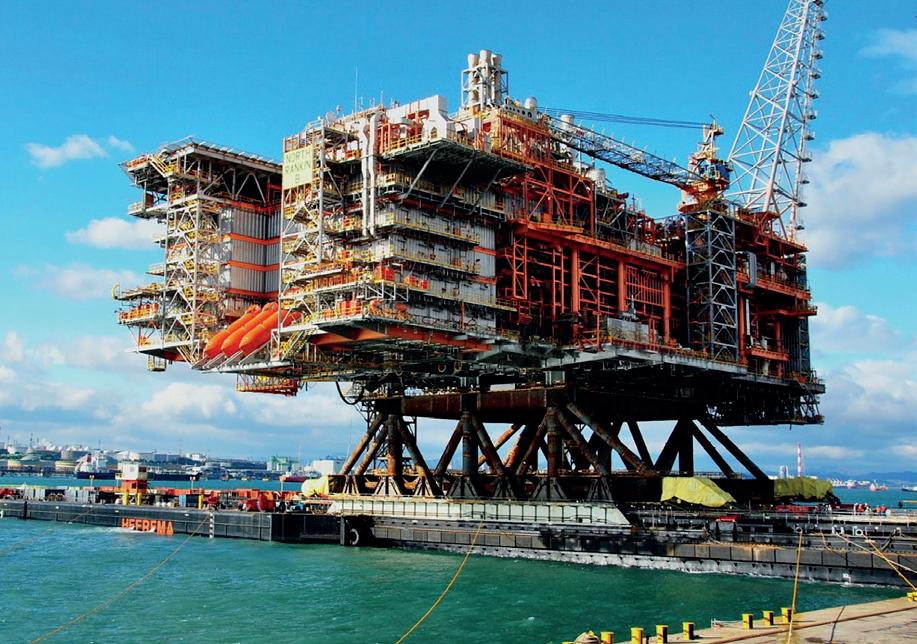
Q: What do you notice about an energy transition in Qatar?
GL: "The Qatari are certainly working on that. They have plans for reducing their carbon footprint. Very recently, QatarEnergy and partner TotalEnergies opened the 1.8 million solar panel Al Kharsaah solar plant, providing 10% of Qatar's energy needs. In addition, Qatar is active in hydrogen production, primarily from gas. Combined with carbon capture and storage, this is called blue hydrogen. In the long term, Qatar will use solar energy to produce green hydrogen as well. And with its extensive network of LNG customers, Qatar is well positioned to play a major role in the global energy transition. But consider that at its current gas production capacity, Qatar still has 130 years to go before supplies run out. They do want to unlock that wealth, in part to finance new developments."
Q: The legal and contractual aspects of the assignments are probably demanding; can you elaborate on that?
GL: "We do contract management mainly in-house. We try to apply English law as much as possible when entering into contracts with EPCI contractors. So we try to stay away from the applicable Islamic law of Qatar, because the limitation of liability there is formulated more vaguely than in British law. However, the Qatari prefer to see a single lump sum under which all risks fall to the contractor and subcontractors. We cannot accept that. And in the new reality with and increased demand for our services worldwide in both oil & gas and renewables, this provides an interesting dynamic."
Q: Are you pushed to hire local people for the projects in Qatar?
GL: "That is being tried with a program called TAWTEEN, which is aimed at spending more revenue in Qatar, through procurement of products and services and training and hiring Qatari. It sounds nice, but implementation is not easy. Affordable Qatari with relevant experience are very scarce. To execute our projects, we use our own specialized people, including our employees in Doha."
Q: You previously worked for Boskalis in Abu Dhabi; what is the difference between that country and Qatar?
GL: "The United Arab Emirates are further ahead in time. Here in Qatar, everything is more conservative, both in terms of Islam and in terms of doing business. This is actually such a small country, where a handful of clans or families, are in charge. The Emirates has developed more in the Western direction in recent years. I see it this way, Dubai is a metropolis, Abu Dhabi is a city and Doha is a big village."
Why did you switch from Boskalis to Heerema Marine Contractors?
GL: "Boskalis is originally a dredging company that also wanted to move into the offshore market. To this end, the company acquired the companies Smit and Dockwise. Together with joint venture partner Lamprell, I contributed to Boskalis having a so-called longterm service agreement with Saudi Aramco, enabling this joint venture to bid for EPCI tenders in Saudi Arabia. Boskalis ultimately did little to follow this up and shifted focus, leaving very limited offshore activities in the region. By mutual agreement, I then left Boskalis and transferred to Heerema, which is just right for the opportunities that the region, and Qatar in particular, offers for offshore projects. In retrospect, this was a good decision."
Q: You were educated at TU Twente and did an MBA at Nyenrode; what has the Nyenrode study brought you in practice?
GL: "As an engineer, you are technically focused and think that everything is about technology. Through Nyenrode I started to see things more broadly, especially because you were lecturing with people from the marketing and financial world, with whom I hardly had to deal before. They were completely different in the game. I now benefit from this exchange of experience and know-ledge, because I see the interests of the Qatari better and understand their position. You have to want to understand their culture, be patient, be reasonable and remain polite without letting go of your own vision. You certainly cannot come in with the familiar Dutch finger to make things clear. The Qatari have every right to determine what the rules are, they are simply the boss here. On the other hand, there is a lot of insecurity among the Qatari. They know they cannot develop their country on their own. It is a bit against their pride to express that. By the way, I experience Arabs as hospitable, helpful, interested and absolutely pleasant in personal dealings."

Q: Did you take your family to Qatar?
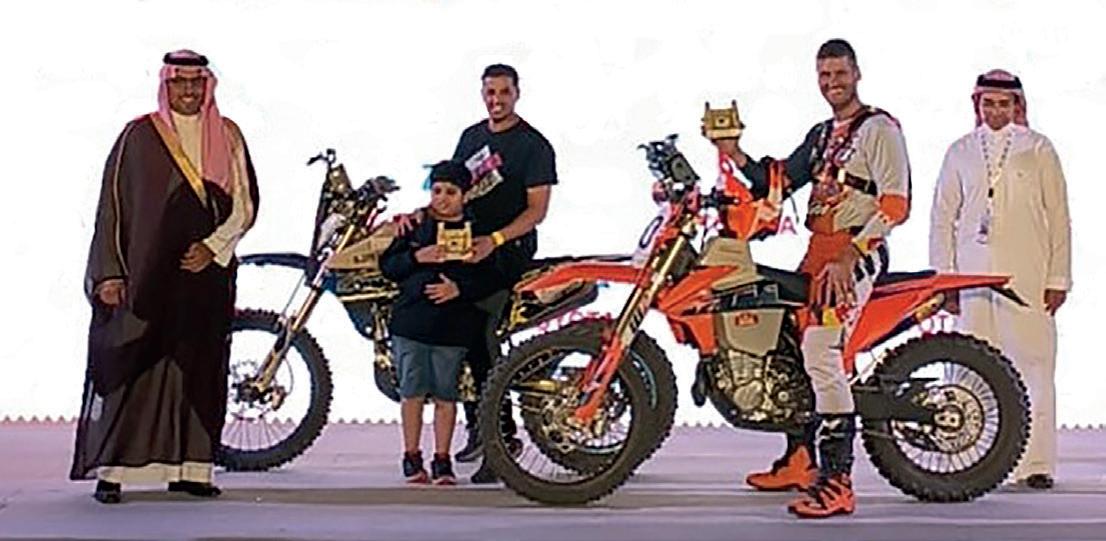
GL: "Yes, I am here with my wife and two daughters, who are 11 and 13 years old and go to an international school. It's an advantage that they can't do too many things here, which as parents you'd rather not have them do. On the other hand, we have to deal with the issue of what women can and cannot do. It is also difficult to keep our Dutch norms and values and at the same time respect the Qatari. Such issues are part of being an expat."
Q: Can you have a normal social life in Qatar?
GL: "My wife and I did find Abu Dhabi more relaxed. Here you have a state liquor store, for which you can get a pass, with the necessary formalities, to buy alcohol. That is also tied to a limit, although that's more than enough for us. But they do know what you buy and how often you do it. In Dubai these days you can just buy booze in certain sections of supermarkets. It's typical of expat life in a place like Doha, that every weekend you have brunches and you go and spend your money in shopping malls. That's not my life; I don't come here for that. I have another hobby. I have a dirt bike and I ride it in the desert. Last week I did my first rally in Saudi Arabia; in two days I drove 300 kilometers over sand dunes. I am a great lover of the desert. That's what makes the Arabian Peninsula unique. When I talk about that to the Qatari, you see their eyes light up, because that's their background and that's where they feel senang, or happy. During a rally like that you see things like togetherness, hospitality and friendliness."♦
First desert rally in SA: place No. 15!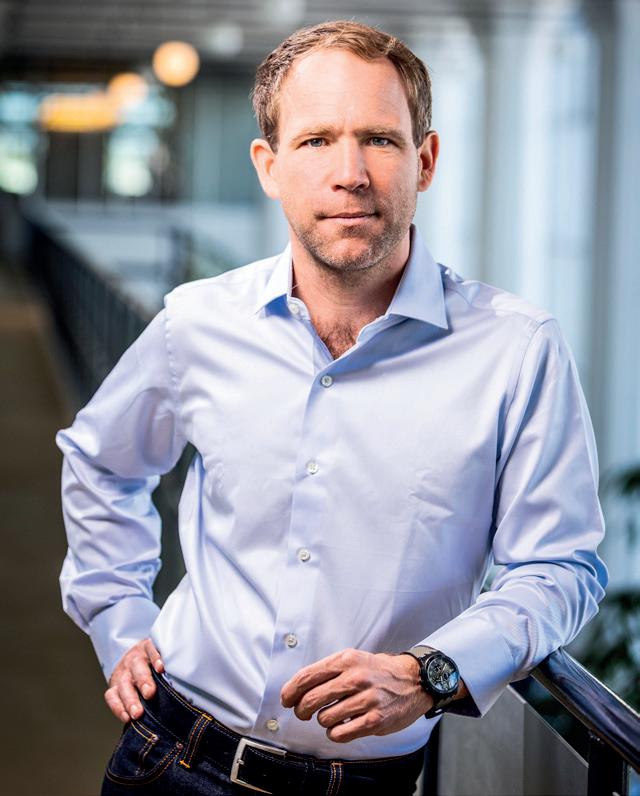
The states of the Arabian Peninsula like to put their oil and gas dollars gladly into top international sports and the development of sports at home. It seems as if Saudi Arabia, the United Arab Emirates and Qatar want to outdo each other on the world stage, but those who look deeper see that sport is a geopolitical tool to protect these countries from international disapproval, political pressure and medium-term military threats. For example, as director of SPORTSINQ and its affiliated Sports Leadership Institute, I am involved in national sports development in the tiny Emirate of Sharjah. Indirectly, Nyenrode is part of our consultancy. Van Verre presented me with 20 relevant questions that give readers insight into the fascinating sports world of the Arabian Gulf states.
Why are wealthy states in the Arabian Peninsula investing in setting up national sports associations?
The short answer is that the Gulf states are seeking new sources of income and ultimately want to be less dependent on oil extraction, which has made an incredible amount of money over the past 50 years. Sports and tourism are spearheads in these countries' long-term strategies. However, there are also deeper (geo)political reasons behind the choice to get into sports that vary from state to state. Consider, for example, exerting influence at the international level through European clubs or by organizing World Cups to strengthen their own security in the region. The invasion of Iraq over 30 years ago and instability in the region are still an existential concern for the sometimes very small and militarily vulnerable emirates. But another important reason - especially for Saudi Arabiais also to be able to project one's own image positively to the outside world (legitimacy) and fuel rivalry among the Gulf states.
Which states are at the forefront of this trend?
A recent PWC report has identified the Middle East as the fastest-growing sports region in the world for the next five years with an average annual growth rate of 8.7%. The United Arab Emirates (UAE) has been developing large-scale sports projects and infrastructure for decades as part of its new future ambitions. In Dubai, for example, you have an entire "Dubai Sports City" district built around sports, where teams and athletes come from all over the world to train.
Everywhere you see tennis courts and large indoor sports facilities as standard features in new construction projects.
Countries like Saudi Arabia (vision 2030) and Qatar are now joining very quickly: with the arrival of several major sporting events, such as Formula One, the Asian Games in 2030, and all-new golf tournaments, these countries are transforming in no time into absolute sports hubs. But also the advent of e-sports industry, the emphatic focus on women's sports and the digitalization of sports (e-betting, sports cryptos, fan tokens and digital fan engagement) are giving a huge boost to this development.
Which sports resonate with the native Arab population?
Soccer is by far the number one sport in the Middle East followed by a number of other Western sports such as tennis, golf and basketball. Of course then you also have the traditional sports like camel racing, wrestling (especially Iran), "falconry" and sailing which is still widely practiced.
Is there sufficient potential for 'own' athletes?
Potentially, there certainly are, but The way in which sport as practiced in the Netherlands by almost everyone everywhere at the club (or individual) level practiced there is still in its infancy. Exercise, vitality and obesity are a major problem in many regions. And sport is still primarily a men's sport. Building sustainable "talent pockets" with sufficient recruitment of young players will take time, but it is certainly going to happen. You can see emphatically that local sports governments are now willing to invest in this. But this starts with the basics: in schools and small local clubs.
Arab countries have made huge investments in top foreign sports; can you indicate for which top competitions this has happened? In recent years, a lot of money and time has been put into attracting well-known foreign sports competitions and building the corresponding infrastructure. See below the list. Furthermore, we are still looking to bring future sporting events to the Middle East where the absolute dream is to bring in the Olympics: recently, Saudi Arabia made a pre-bid to enter the Winter Olympics over largely entirely artificial slopes and snow in the middle of the desert: talk about change!
Formula One Abu Dhabi, Bahrain Grand Prix 2022
NBA Games Abu Dhabi soccer
Dubai World Tour Golf Championship
Dubai World Cup Horse racing
Grand Prix Qatar Motor cross
Qatar Open ATP
Diriyah E-Prix Saudi Arabia
Riyadh Dakar Race
Riyadh Marathon Asian Games
FIFA WC 2022
Can you name five iconic soccer
clubs owned by an Arab country/ corporation?
Newcastle United is owned by the Public Investment Fund (Saudi Arabia); Manchester City is owned by the Abu Dhabi United Group; Paris-Saint Germain (PSG) is owned by Qatar's Nasser Al-Khelaifi; Aston Villa, is owned by Egypt's Nassef Sawiris; and Sheffield United, is owned by Saudi Abdullah bin Mosaad bin Abdulaziz al-Saud.
What advantages can Arab states derive from owning such top clubs? This is a very interesting question: in fact, most of these clubs are making structural financial losses if you just look at the annual figures. Yet there are a lot of parties who are aces at owning these clubs. They see more earning potential than just the usual revenue sources such as television rights and income from spectators: they see the club as a fine-grained ecosystem where value creation takes place at different levels. Look at Paris Saint Germain (PSG), for example. Its revenue model is based in part on establishing a luxury fashion brand, whereby the merchandise of PSG clothing generates a lot of sales worldwide. In doing so, they have partnered with Nike's Jordan Air and many other companies, including - not surprisingly - many sponsors from Qatar, such as Qatar Airways and the Accor Group - which in turn is largely owned by Qatar. The country also owns part of the French soccer TV rights. They also bet on the revenue model behind buying and selling players and talents to other clubs also owned by Qatar. Buying specific players like Neymar and Messi fits into that strategy. They are ambassadors of the World Cup in Qatar. Neymar is also competing in the Paris Olympics in 2024. Everything is connected and it all fits into Qatar's 2030 geopolitical strategy.
Recently, Saudi Arabia launched its own professional golf circuit, where prize money is categorically higher than on the European or American tour. What does this mean for golf?
This means that an absolute bomb has been placed under the existing golf system resulting in a series of lawsuits and a realignment of the current golf system. It is alleged that Tiger Woods was offered $800 million to participate in this new LIV golf tournament but declined the offer. Other well-known
golfers did take up the offer, creating a rift between LIV golfers and non-LIV golfers. All this has forced the existing PGA organization to implement change at breakneck speed, with the main point being to increase the prize money in the PGA Tour significantly. In addition, players who have left the PGA tour for the LIV are under constant legal pressure. Furthermore, there is a public debate in the USA that American players in particular cannot just engage with Saudi Arabia.
And what does this mean for the image of Saudi Arabia?
So far, the introduction of this new golf tour seems to have backfired: discussion of this has only reinforced the focus on human rights and does not bring the desired outcome that you do see in other sporting events. So it is not so easy to give an unequivocal answer. Whether or not sportwashing is effective, it varies greatly by sport and the actual underlying intention of the countries.
Does the interest of Arab investors focus only on top male sports or is female top sport coming into focus? An interesting reversal is visible here. In Saudi Arabia, for example, women were not allowed to go to a soccer stadium, and now women across the board are encouraged to play sports with huge investments in fitness schools and specific facilities for women's sports. Major women's tournaments in wrestling and shooting are also being now emphatically brought to Saudi Arabia.
If you look at climatic conditions, what top sports can be held in a desert climate?
The short answer is almost all sports: it's amazing to see how these countries are able to host events for golf, tennis, soccer and even soon skiing in the
stadiums are of course brand new with state-of-the-art facilities and huge VIP and fan engagements. Many of these stadiums are torn down and shipped to other countries afterwards, in other words there is sharing in Qatar's wealth.
What do you expect from the climatic conditions, under which to play?
immediately after the 2010 World Cup allocation: will drunken fans be monitored and, above all, will action be taken against overt displays of LBGT? Until very recently, this was emphatically cracked down on: my suspicion is that during the World Cup they will loosen the reins somewhat, as long as the state itself cannot be directly discredited.
desert. The reality, however, is that many of these sports often take place in the early morning or late evening. Most sports are definitely not suitable for daytime exercise with temperatures well above 40 degrees. Most locals therefore exercise indoors in refrigerated halls. The question, of course, is how sustainable all this is.
What opportunities are there for foreign investors to participate in top Arab sports?
There are unprecedented opportunities for foreign investors and companies. The Middle East is in a gigantic socioeconomic transformation in which sport has a central driving role for multiple future-site strategic pillars: tourism, events, urban development, sustainability and societal projects. Consider, for example, Saudi Arabia's Vision 2030 plan, where the underlying Quality of Life program aims to get as many residents as possible moving and living healthy. They do this by investing massively in sports, attracting foreign athletes and organizing their own sporting events.
As this Van Verre comes out, the FIFA World Cup in Qatar is halfway over; can you name three pluses to hosting the World Cup in such a rich country? Previous experiences in South Africa and Brazil show that hosting of a World Cup has a huge positive effect on the popularity of soccer of the organizing country. For the coming years, many new passionate soccer talents will emerge from Qatar and surrounding countries. It is the first time that the World Cup is organized in winter, a novelty that may be repeated more often in the future and offers many practical advantages for various reasons. It is also the first time that the entire World Cup will be played in a central location, where all the stadiums are reasonably close to each other, which can also give a potentially cozy atmosphere. All
Much has been said and talked about the hot conditions in Qatar, yet the average temperature will not be too bad, especially in the second month of December of the tournament and during the evening games with temperatures between 24 and 28 degrees. So that does not compare to the nearly 40 degrees of the Tokyo Olympics or even the World Cup 4 years ago in France. Humidity will remain high, but they promise with internal cooling systems inside the stadiums to make it pleasant. It remains to be seen if this all actually works. In any case, the temperatures bear no relation to the extreme conditions under which many construction workers have had to work in recent years with sometimes temperatures as high as 45 degrees outdoors.
To what extent does air pollution play a role?
Until recently, Qatar was in the top ten list of countries with the worst air quality in the world and a front-runner in the Middle East: mainly due to a lot of construction work and huge oil and gas production in the small country. While this has decreased slightly over the last year, it will still be a gigantic challenge to start reducing this during the World Cup, when 1.5 million guests are expected, all of whom will be traveling much within the small city. The state did ask most of the residents to go somewhere else during the World Cup and not work. In any case, it will still be a big challenge to start keeping their carbon footprint promises. Qatar has repeatedly boasted of promising to be the first carbon neutral World Cup in the world. This is going to take a lot of creative accounting....
How strictly will supporters' behavior be monitored?
This, of course, is the big question that everyone is asking and was already expressed as one of the big concerns
Much has been made beforehand about the conditions under which construction workers from the Far East and India worked on the stadium construction. Do you expect this issue continue to cause negative publicity during the World Cup? Yes, from the very first moment this, of course, the most controversial issue. The many tens of thousands of guest workers mainly from India, Nepal, Philippines and Bangladesh who had to work in appalling conditions and were recruited under the infamous "kafala" system to come to Qatar sponsored, but once there found themselves without passports and unable to go anywhere. Under massive international protests, this system was changed and there are multiple agencies overseeing it, although it is strongly believed that the system still exists de facto. In February 2021, The Guardian came out with the infamous article that stated that 6,500 construction workers had now died. While this number is strongly disputed, it is widely believed that there are many deaths, not least indirect casualties (heart attacks etc.) due to the extreme heat and resulting fatigue. I expect that during the World Cup the international community does draw attention to this and I also expect some unannounced protest actions by international human rights organizations for this. I also expect a number of teams that will (in)directly protest. Look for example already how Denmark wants to play with a complete black shirt without logos and name as a tribute to the deceased construction workers. The strategy of Qatar is to very quickly respond to this in substance each time by coming up with counter arguments. It will be interesting how FIFA will deal with last minute protests specifically during/around the matches. It will of course be interesting to see if the Dutch government delegation will say anything about this.
What happens after the World Cup with the stadiums and housing facilities in Qatar?
This is the big question. A number of stadiums are already known to be demolished, including the famous container stadium. From a number of other stadiums, the Qatari say that they are going to move them to other countries, especially African countries, as a gift for what they have done to make the World Cup in Qatar possible.
Do you think that after the World Cup there will be a kind of vacuum for top sports in Arab League, or will there be instead a prestige struggle to host more World Cups to be organized? This is just the beginning. In recent years there has been an estimated $70 billion invested in sports in the Middle East and in my view this is only going to increase, this is certainly due to the rivalry between the Gulf states but also by the opportunities to use sports as a vehicle for future social and political ambitions.
Can you indicate what assignments the Sports Leadership Institute has won in the Arab world?
Our company SPORTSINQ and affiliated Sports Leadership Institute focuses on leadership and management development in sports. We started this once ten years ago at Nyenrode and are now an international platform at the intersection of sport, leadership and education. We build programs for (international) sports associations, including, for example, for the small Emirate of Sharjah -which is right next to Dubai. For them we create a leadership program for young future sports administrators and former top athletes. We train them both locally there and here in the Netherlands, introducing them to the Dutch sports ecosystem with visits to clubs, associations and knowledge institutions, including Nyenrode! This with the ultimate goal that Sharjah will be able to take sports to a higher level. ♦
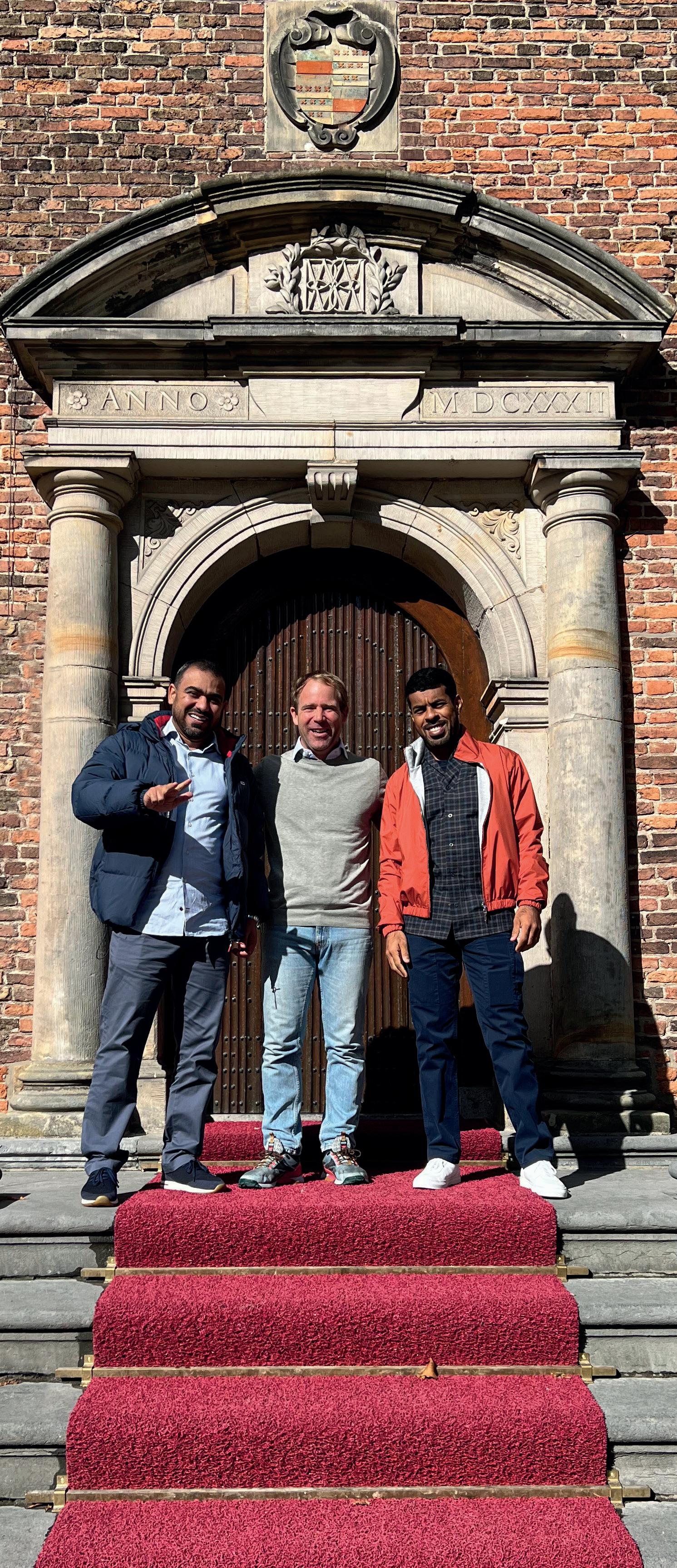
Dubai's container port has developed over 40 years into a strategic hotspot for international trade between the Far East, Europe and the United States. Alumnus Charles Menkhorst (19920932) was supposed to work there for 3 years for APM Terminals - the international port group within the Maersk concern. Things turned out differently, he held CEO positions at several major port companies, saw three children grow up with his wife and recently started his own port consulting company. After fourteen years, Dubai remains for him a magical place to live, to work and enjoy.
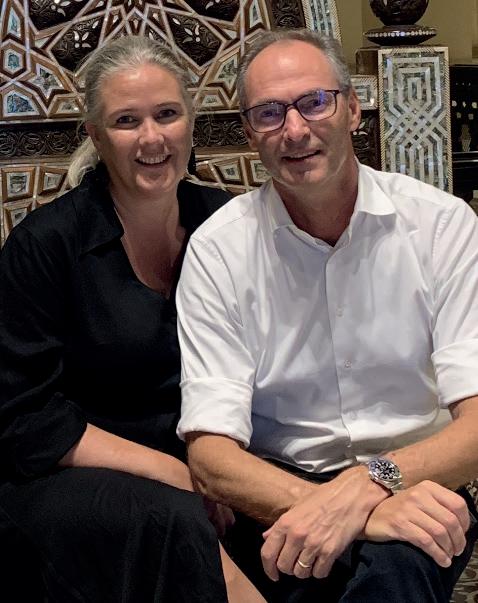 BY OELE STEENKS
BY OELE STEENKS
Q: Dubai has the No. 7 container handling port in the world with the Jebel Ali container port. Can you indicate how this position came about?
CM: "There are a number of reasons why Jebel Ali has become one of the largest ports in the world. Firstly, Jebel Ali is in a strategic location: not too far from the East-West shipping routes and centrally located in the Arabian Gulf for the Arab countries bordering the Gulf, Jebel Ali is a distribution point; Many goods enter the Gulf through Jebel Ali and are then shipped to other ports. Dubai also had a clear vision to develop one of the largest ports in the world. Jebel Ali was commissioned in 1979 and is located south of Dubai toward Abu Dhabi. Before that, a small city port, Port Rashid, which now houses only a shipyard and a cruise terminal. Sheikh Mohammed bin Rashid al Maktoum and his family were ahead of their time with the construction of the JAZFA logistics park adjacent to the port, which is a freetrade zone. Goods unloaded in this zone are not directly subject to the imposition of import taxes. That only has to be paid when carriers transport the goods to customers in the Gulf region. As a result, many regional distribution centers have come to Dubai. In the case of forwarding goods to destinations in the Far East, import taxes only apply there. Thus, JAZFA offers a great business advantage in international trade. Furthermore, Jebel Ali has been able to ride on the economic growth of the Middle East, including the United Arab Emirates. This is certainly true of the internationally oriented and dynamic emirate of Dubai. The past few decades have seen spectacular growth in both population and economy. This has caused the demand for goods, mostly imported through the port, to grow explosively over the past 15 to 20 years. These include building materials, consumer goods and food items. Much of the latter category is brought in refrigerated containers, called reefer containers."
Q: Can you indicate the logistics between the U.S., Europe, Dubai and the Far East?
CM: "Almost all major container shipping companies call at Jebel Ali; there are scheduled services to many ports in Asia, Europe, Africa and America. The container shipping companies operating large vessels, called mainliners, call at the port, where containers are unloaded and loaded. These are then transported by feeder ships to smaller ports also called transshipment as opposed to gateway transport which has the port and immediate hinterland as its final destination. Dubai is now the largest transshipment port in the Middle East. On a China-Rotterdam ocean service, mainliners often call at three to six major ports, for example, Shanghai, Singapore, Colombo, Dubai, Jeddah, Tangier and Rotterdam. That outlines Dubai's crucial strategic position."
Q: Can you talk a little more about the logistics network in the Arabian Peninsula to and from Dubai?
CM: "JAFZA is now the largest free trade zone in the world. Many multinationals have built their regional distribution centers in Dubai. This has ensured that many goods arrive in Dubai by container, are stored, and then distributed by road or by ships to their final destinations in the Gulf region. Rail transport is expected to play an important role in the future; a rail network, Ethiad Rail, is currently being built. It will be 1,200 kilometers long and will connect the seven emirates of the UAE. Even more interestingly, Etihad Rail will connect with rail networks in Oman, Saudi Arabia, Qatar, Bahrain and Kuwait. This will create a rail network throughout the Gulf Cooperation Council (GCC) region."
Entrepreneurship in THE ARAB WORLD
Q: From a geopolitical perspective, how safe is Jebel Ali in relation to tensions with Russia?
CM: "There are international regulations in the area of security to send goods to the European Union or to the United States. These include the security of entry to the port, called entry and exit procedures. There are also Western regulations that are observed for scanning containers entering and leaving the port. And, of course, there are strict cyber security requirements."
Q: How do port costs compare with other international ports?
CM: "DP World, the operator of the Jebel Ali port, is a modern global port group that constantly invests and innovates. Jebel Ali often serves as a location where DP World tests and implements new concepts and solutions, hence the port has state-of-the-art facilities. Costs and rates are in line with the market."
Q: What does the Dubai container business look like in terms of revenue and number?
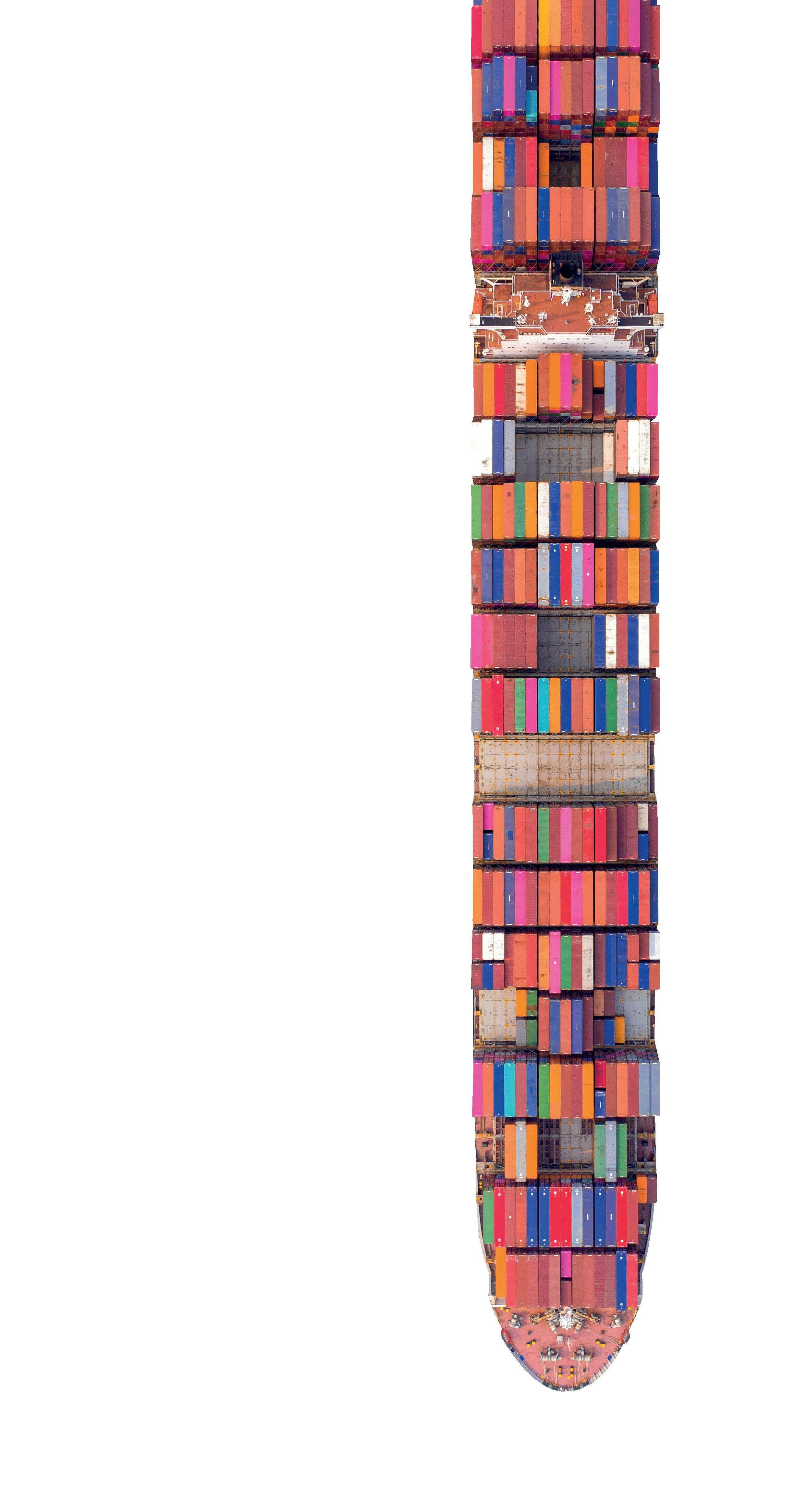
CM: "Jebel Ali has a capacity of 19 million TEU or twenty foot containers. A total of 13.7 million containers were handled in 2021. Worldwide, DP World handled 91 million containers, making the Dubai-based company a top-3 global port group. DP World has also had its own container shipping company, Unifeeder, for several years. Through multiple acquisitions, Unifeeder is present in large parts of the world."
Q: What is your role in the maritime logistics industry?
CM: "After my IDP education at Nyenrode, I started working for DHL in 1992. After working for the Dutch headquarters for two years, I worked for their Express and Supply Chain divisions in multiple positions in Europe and America. In 2009, I switched to the maritime logistics sector, for which I moved with my family to Dubai. After more than 15 years of managing international port companies, I recently decided to set up my own port consulting company in Dubai. I work for two major clients: a global strategic consulting company where I advise/knowledge share on maritime supply chain projects. I also work as a Global Industry Advisor Ports for an international fast-growing 'infrastructure investment' company on the acquisition of new ports. When desired, I help to structurally improve the results of these acquired companies by serving on the Board of such a port company as Non-Executive Director on behalf of the shareholder."
Q: How do you like living in Dubai?
CM: "The original plan was to go to Dubai for 3 years. We recently entered our 14th year; in short, we still like life in Dubai. Whereas we left for Dubai in 2009 as a family with three young children, the children have since graduated and are living on their own in Europe and Canada. What I like most about Dubai is the business climate; business is conducted in a no-nonsense manner, where personal contact and result-oriented work are paramount. The fact that I am starting to speak the Arabic language better and better is much appreciated by the local Emirati people. Privately, my wife and I still love living here; Dubai has become a dynamic metropolis where every weekend feels like a mini vacation."
Q: What are your favorite hot spots?
CM: "Dubai has a great selection of art studios and museums. The Al Quoz area in particular has a surprising amount to offer. Furthermore, Dubai is a paradise for culinary lovers; new restaurants open every week in this emirate of 3.5 million inhabitants. In the area around the international financial center (DIFC) you will find many fine restaurants. Finally, when the wind is strong, you can find me on the water at Jebel Ali to kiteboard." ♦
Probably nowhere are the rules of Islam as strict as in an Arab hospital. Alumnus Remco Brouwer (2013341) gained experience in Saudi Arabia as head of nursing departments and is now business manager of the Hamad Medical Corporation Neuroscience Institute in Doha, Qatar. He provides insight into the day-to-day operations, where it is clear that suppliers who can win trust are more important than price-fighters. Meanwhile, commercial parties have to comply with lots of regulations, while Qatari have their own interpretation of contracts. "On the other hand, it may cost something here," Remco Brewer said.
What is your background from the Netherlands?

RB: "My background is college nursing at Saxxion Hogeschool in Deventer; then Policy and Management in Healthcare at Maastricht University. I then obtained a PTMsc at Nyenrode, where I graduated in 2016. After having jobs at Gelre Ziekenhuizen in Zutphen, the Oogziekenhuis in Rotterdam and the Maxima Medisch Centrum in Veldhoven, I decided to gain experience abroad for a few years. However, I didn't want to end up on a mattress somewhere in Africa, so then you soon end up in the Middle East. Through a recruitment agency, I started in Jiddah, Saudi Arabia (SA). I worked there at King Abdulaziz Medical City hospital as a ward manager."
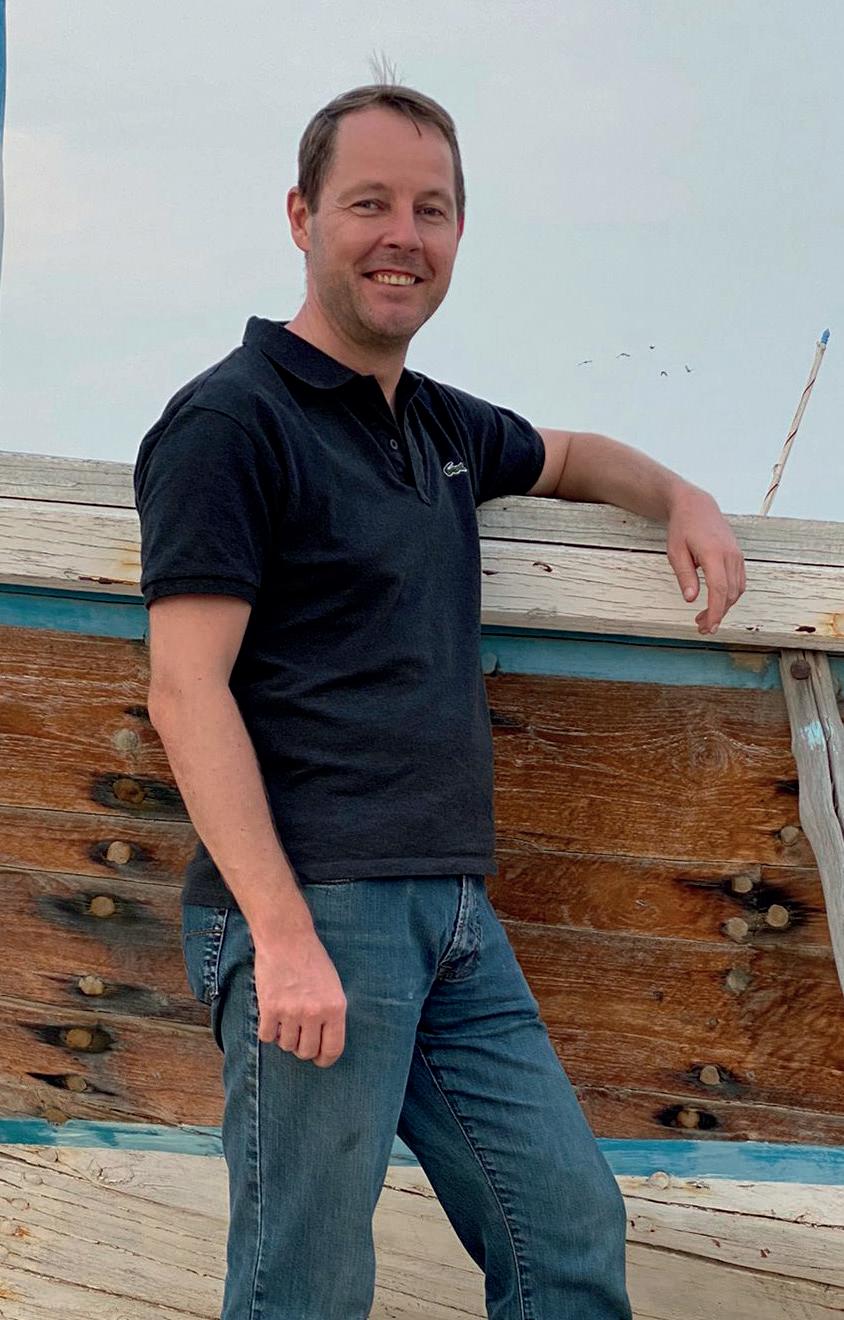
Q: What can you share about your Saudi experience?
RB: "The transition from Holland to SA, was the biggest step I made. You end up in a rollercoaster experience. All the social, cultural and personal experiences you had in the Netherlands no longer exist. Both work and daily life are completely different there. You live in a compound with colleagues next to the hospital. It was far away from the center, so the location alone made you quite isolated. It made a difference that I am a man, but for female colleagues the transition was even greater. They had to adjust in terms of dress, wearing an abaya. In general, you had to be careful with the things you said and how you behaved. Let me give you an example: if a man and woman are not related, like brother and sister or are not married, they should not be alone with each other in an enclosed space. If a nurse wanted to have a confidential conversation with me, you had to make sure the door remained open. If not, people could think things were happening that are not allowed,
such as a man and a woman touching. Even a pat on the back could be completely misinterpreted. So the manners between men and women are very different compared to the Netherlands. If you get caught by security, you have a problem. A nurse from Malaysia had a friend from SA. They were not allowed to stay together in an enclosed space; that included cars. They were in the car together anyway and for some reason they were stopped by the police. The papers showed that they were not a married couple and that was not allowed. The woman from Malaysia would have a big problem, while the man from SA got off with a warning. As department manager in such a situation, you are much closer to the private lives of your employees than is usual in the Netherlands. Then you get a call from the police, there is an employee of the hospital here in the cell. As the employer, the hospital is the sponsor and responsible for the employee. As the department manager, you are then often the first to be contacted. So you go to the office to plead on behalf of the employee. She gets off with a serious warning. If it happens again, the consequences are more serious, such as fines and possibly a prison sentence. She had to solemnly promise that such a thing would never happen again."
Q: So is working in SA fun?
RB: "I always say, if you find it difficult to live and work in such an environment, keep the honor to yourself, be proud of yourself for taking the step to work in this region, and go back to the Netherlands. It makes no sense to be irritated by the social and cultural regulations that have an important basis from Islam. If this stresses you out, it is difficult to work in nursing, but to function throughout SA's daily life."
Q: Why did you switch from SA to Qatar?
RB: "That was a career move. I was manager in Djedda of some nursing departments. Now I am business manager of the Hamad Medical Corporation Neuroscience Institute, which is part of the Hamad Medical Corporation, which has as many as 13 hospitals under its management. The corporation is directly attached to the Ministry of Health in Qatar, which is ultimately responsible for the operation of the hospitals. Over the past decade, general hospitals have been built in Qatar's smaller towns. In Al Wakrah, a town of about 80,00 inhabitants, there is a hospital that in the Netherlands would fit in a city like Amersfoort, i.e. twice the size. Each hospital stands alone with a board of directors, medical staff and nursing departments. This does happen according to a certain profile determined from above. Since health care is free, medical facilities are widely used. Furthermore, the aim is to have all medical care in the country, including highly specialized care such as neurosurgery. Since last year a new department of epilepsy surgery was started in the Neuroscience Institute. If a treatment or surgery cannot be done in Qatar, it is decided whether a specialized doctor can be flown in or the patient flown abroad. This is really new for the region. For example, we recently had a child from Kuwait who was helped here."
Q: Dubai has a number of commercial hospitals dedicated to treating foreign patients, who are specially flown in for treatment. Is this medical tourism also developing in Qatar?
RB: "Meanwhile, there are also hospitals that are not run by Hamad Medical Center. These are the Turkish Hospitals, El Ahmadi Hospital and Sidra Hospital, which has pediatrics as the focus. Private clinics focusing on medical tourism have also opened in Doha. It is all about the commercially interesting procedures: selective, not medically urgent such as cosmetic procedures and non-complex, which means the organization does not have to invest as much in equipment, to be used for complications during and after the procedure. I regularly see advertisements that a specialist in Doha was the first to do a certain surgery in this area. Something like that really only happens at Hamad Medical Corporation and at Sidra. Surely other private hospitals don’t have the ability to be able to cover the investments in medically exclusive treatments with the proceeds from these treatments."
Q: Does neurosurgery require you to attract physicians from abroad?
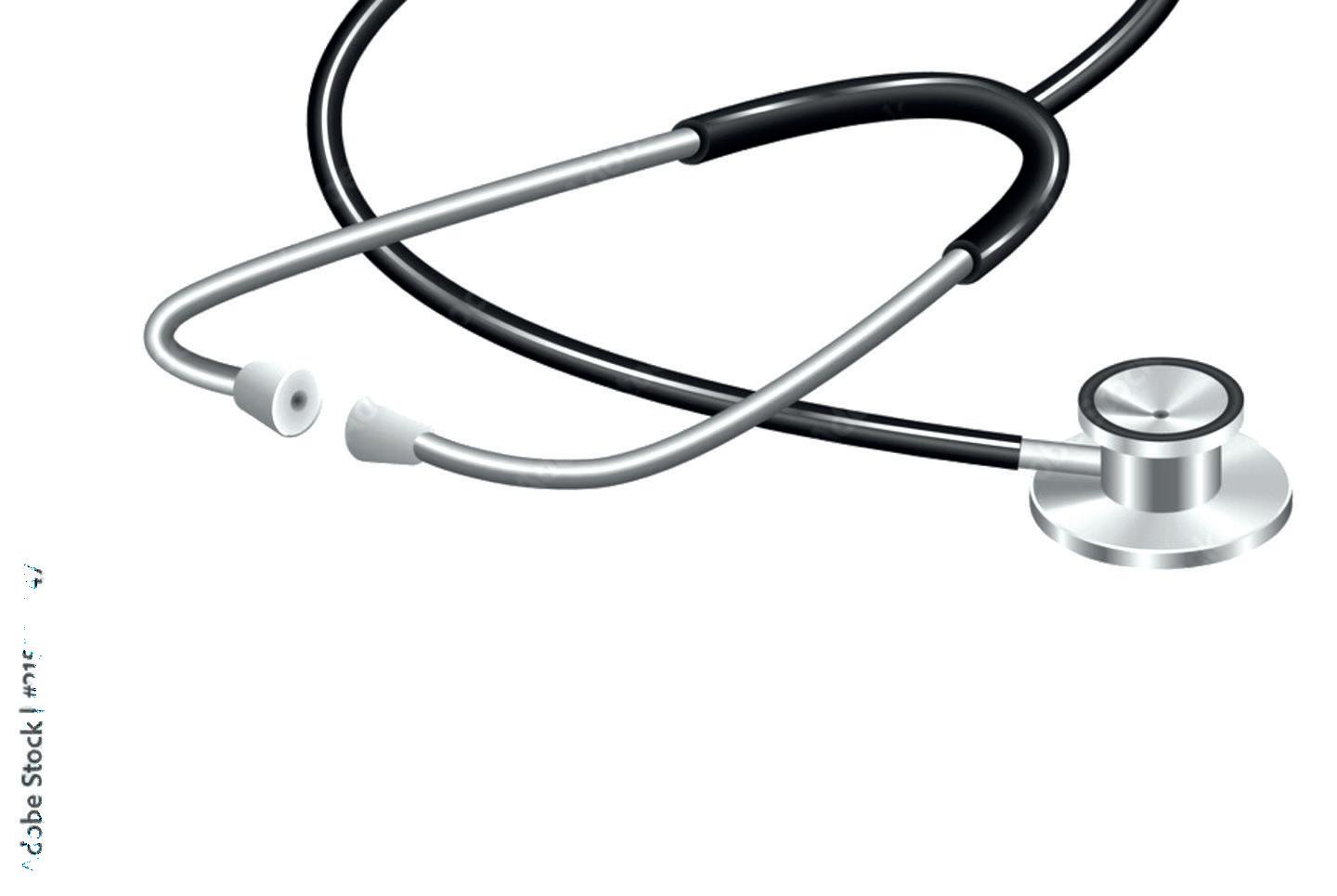
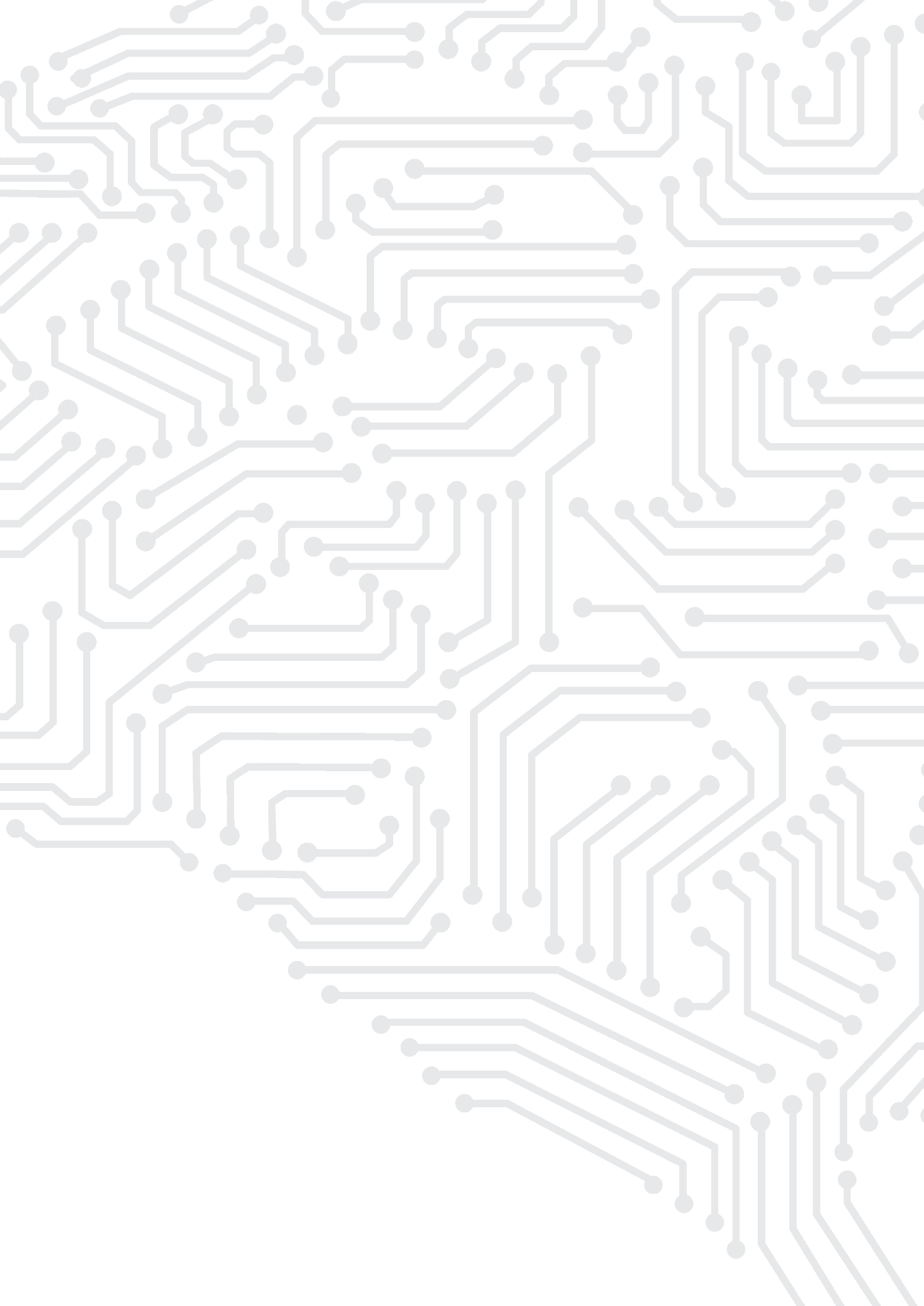
RB: "The somewhat more experienced neurosurgeons come indeed from abroad. Meanwhile, Qatar has its own academic medical school. Prospective specialists are usually sent abroad for their internships, particularly to the US and Canada. There are premium hospitals with which partnerships exist There they can work on their
AMC and the UMC, ed.) An excellent example of our quality, is the trauma center in Doha, which is top of the bill both in terms of equipment and furnishings. There are only single rooms that are furnished with luxury furniture, with the best beds available and with wide corridors. It really may cost something here."
Q: Are there particular hospitals that collaborate?
RB: "HMC collaborates with Max Plank Institute for Medical Research in Heidelberg. This mainly involves cardiac specializations. A few months ago a delegation came to visit from Antwerp University Hospital. They were invited to exchange knowledge about managing a larger hospital organization. Currently, the thirteen HMC hospitals are reasonably independent, whereas for reasons of efficiency, they should be managed more centrally. That will push the quality level even higher."
Q: What do you notice about Islam in HMC hospitals?
RB: "A lot. Islam is not only a religion, but also a way of social and cultural coexistence. The simplest example is that here you have separate wait-spaces for women and men. The outpatient clinics also have a separate area for women. The female health staff can always help men and women, but male staff must handle female patients with caution."
Q: Several interviews reveal that you should not speak with a raised voice to Arab men and certainly not point. What have you noticed about this?
RB: "They don't like that in Qatar either. They are not backward and understand well that Westerners are critical. But the Arabs are the ruling power and they feel they are entitled to their own views, to Islamic legal rules and to enforce them. You cannot always take the most efficient path as a manager. The management has to fit the Islamic culture, which is also a top down structure. At the top are Arabs who decide how lower levels should do the work, which in many cases wastes considerable money. Now the difference is that Qatar has only 350,000 native residents and as many as 2.5 million expats. When you hit the streets here, it's almost like being in India or Pakistan. It causes the Qatari to be more open to other cultures and there are less stringent requirements for women's clothing. Women are not required to wear headscarves. Body-covering clothing, however, is a prescription. Shorts and dresses are allowed on the street, but to just over the knee as the minimum
lower limit. Local men are usually dressed in white robes and women in a black abaya."
Q: What can you tell about the business practices that you have to deal with?
RB: "The purchase and import of medical equipment goes through local agencies. When an international manufacturer or trading firm wants to do business here, it is common to sign an agreement with an agent in Qatar. Or with a firm in which Qatari have a majority stake. By law, the local party must have at least 51% of the shares. So as a foreign commercial party, you have to think very carefully about how this construction works and to what extent you are protected from malpractice. When I want to buy equipment from, say, the United States, those manufacturers are keen that they have only one agent in Qatar, otherwise local agents start competing with each other. That would cause considerable problems, especially since here it is laid down by law how free competition in the Qatari market is to be encouraged and protected. So I do business with different agencies representing different brands. Conversely, if I put out a tender for a particular medical device, I get offers from agents representing different brands. I am otherwise shown only the purchase prices that our supply chain people have negotiated. At what price the local agents purchased the equipment, and thus what their margin is, remains invisible to me. On top of that, the supply chain department can negotiate an extra margin on its own for replenishing a central pot. The difference between the offer price and the final purchase price flows back into the central pot where windfalls, i.e. purchasing cheaper than budget, can offset setbacks such as unexpected and unbudgeted necessary replacement of equipment. So there is a purchasing organization as part of HMC, for supplying all thirteen hospitals. It is one of the things that could be arranged a little more efficiently."
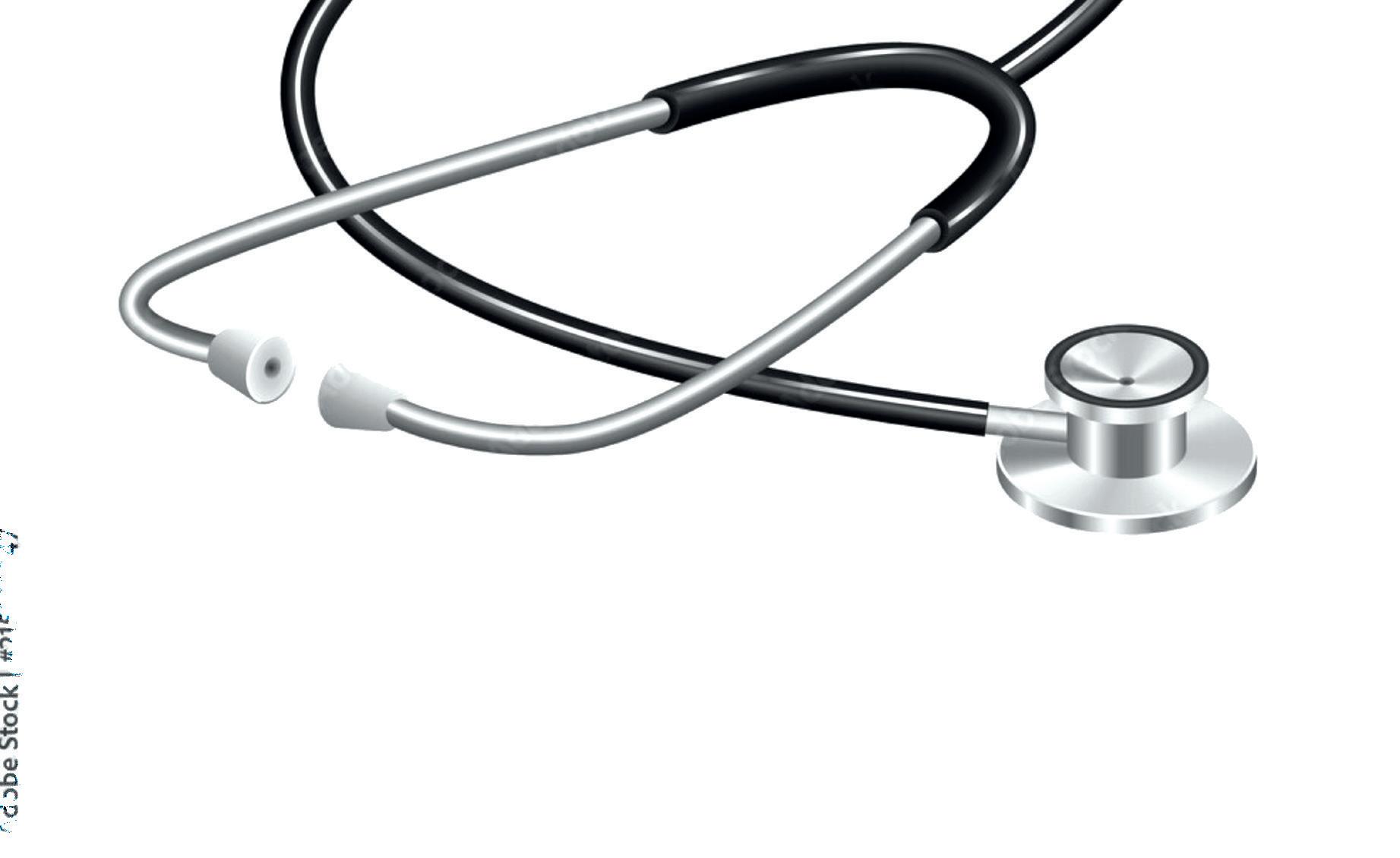
Q: How can you as a foreign party cover against fraud in Qatar?
RB: "The legal side of deals you have to describe extremely precisely. In general here, suppliers have an extensive list of obligations. However, internal audits and external audits from the Ministry of Finance and Health Care take place. If there are ambiguities or abuses around contracts, they must be explained. So viewed this way, it is also better for
Qatari to follow the rules to avoid fines and the like. Especially as an employee who is employed by an organization, because they will be held accountable for why they acted and decided the way they did. And no one wants to get into trouble here. All this is to encourage a free market, because as a supplier you want to have a fair chance against competitors, especially if the purchasing party is a large party in the market."
Question: as a supplier, is it better to engage a local lawyer?

RB: "That is absolutely a must. All contracts are written in both Arabic and English, but Arabic is the leading language. Again, Sharia law is the starting point for the legal system, supplemented by legislation appropriate to modern issues."
Q: How does this play out in labor law?
RB: "That is certainly an important issue. Personnel I hire are of course subject to the local law of Qatar, but in practice you have to deal with the social, hierarchical and cultural customs and backgrounds of expats. For example, we have nurses from the Philippines, who are used to a highly hierarchical culture. Those people won't do anything on their own initiative. They will action only when you expressly order them to do so, because you are seen as the boss who makes the decisions. It plays an important role here that expats are afraid of losing their jobs. As a initiative and responsibility, but you hardly encounter that here. If mutual trust increases, then conversations can stimulate employees to bring ideas and show that you value them and do something with them. On the other hand, if you give clear instructions, the Filipino employees will do it for you. You don't have to argue with them.♦
The Cleveland Clinic is a hospital in Abu Dhabi that is among the absolute best in the medical world. It is a joint venture between American academic standards and prestigious Arab capital. United Arab Emirates founder Sheikh Zayed bin Sultan Al Nahyam was the founding father! Now alumnus Vincent Bouw (19990310) works there as director of Learning, Talent Development & Total Rewards. "Islamic culture focuses on respect and tolerance, but you have to realize that you are a guest here."
BY OELE STEENKSVincent Bouw worked for IBM for nearly a decade and says he was formed within the IBM culture. He chose the adventure in Malaysia, where he started a one-man consulting firm called Papillo Novare. This was with success as he received assignments from almost every country in Southeast Asia, right down to China. He specialized in making leaders more effective and in management teams in the role of consultant/trainer. His reputation even took him to Australia and for the first time to the Middle East. One of his clients was Coca-Cola.
That concern asked him to join as head of organization and development; keywords were learning, talent performance and culture. It was a position that was rolled out across Malaysia, Singapore and Brunei. After about five years, he had to make a choice between an international position in management at Coca-Cola or an option to come to Abu Dhabi to work for Cleveland Clinic.
Question: why did you choose the Cleveland Clinic?

VB: "First of all, I had personal reasons. Early in the year 2019,
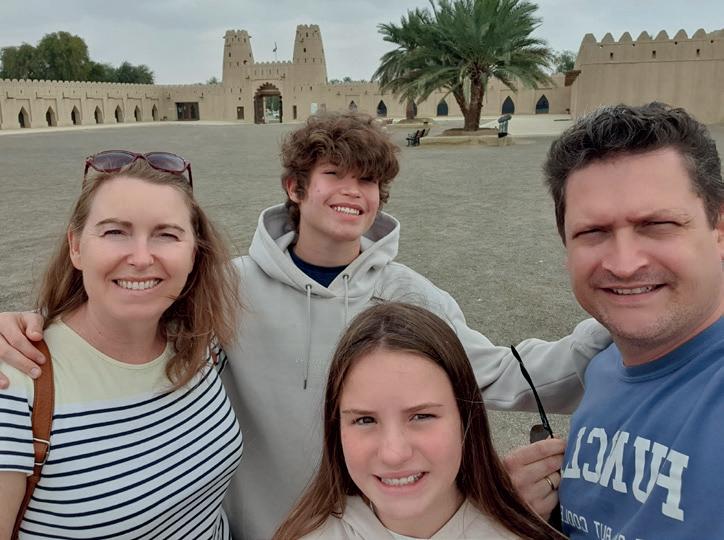
my father passed away, leaving my mother alone. In fact, my brother also works abroad. In case something went wrong with my mother, I thought the distance between Malaysia and the Netherlands was just too great. From Malaysia to Amsterdam is a thirteen-hour flight, while Abu Dhabi is halfway there. It gave me the opportunity to visit my mother and family in the Netherlands a little more often. Second, I was at Coca Cola Bottlers, which is a business unit that can be very hectic and stressful. The Bottlers has a different culture than the Coca-Cola company.
I was just ready for a new professional environment. And to be very honest, the money was a lot better than in Malaysia."
Q: What does the Cleveland Clinic mean for Emirates?
VB: "Cleveland Clinic Abu Dhabi has a unique status. The founder of the United Arab Emirates (UAE), Sheikh Zayed bin Sultan Nahyan, traveled to the United States and sought out the Cleveland Clinic. It is a nonprofit academic hospital that goes to extremes to save a human life. He was so impressed that he brought an annex of the hospital
to the Emirates. It was his vision. Not only is it one of the best hospitals in the world; it also has the atmosphere of Sheikh Zayed around it. The man founded the UAE 51 years ago. He is hugely respected and revered; the Arabs call him Baba Zayed, "father of the Nation.
The hospital is funded by the Mubadala Investment Company, Abu Dhabi's state investment company. MIC has entered into a joint venture with Cleveland Clinic. The Americans provide the medical model, while Mubadala provides the financial input. There are people working in the hospital-house 5500 people. Including 400 doctors and 600 other medical staff, 1500 nurses and 1000 administrative staff. In addition, 2000 contractors work in support functions. The hospital is organized into institutes, which can be compared to centers of excellence. There are seventeen of them in all.
When it comes to cardiac surgery Cleveland Clinic is the absolute world leader. Other specialties include neurosurgery; gastrointestinal and liver diseases; and eye diseases." ♦
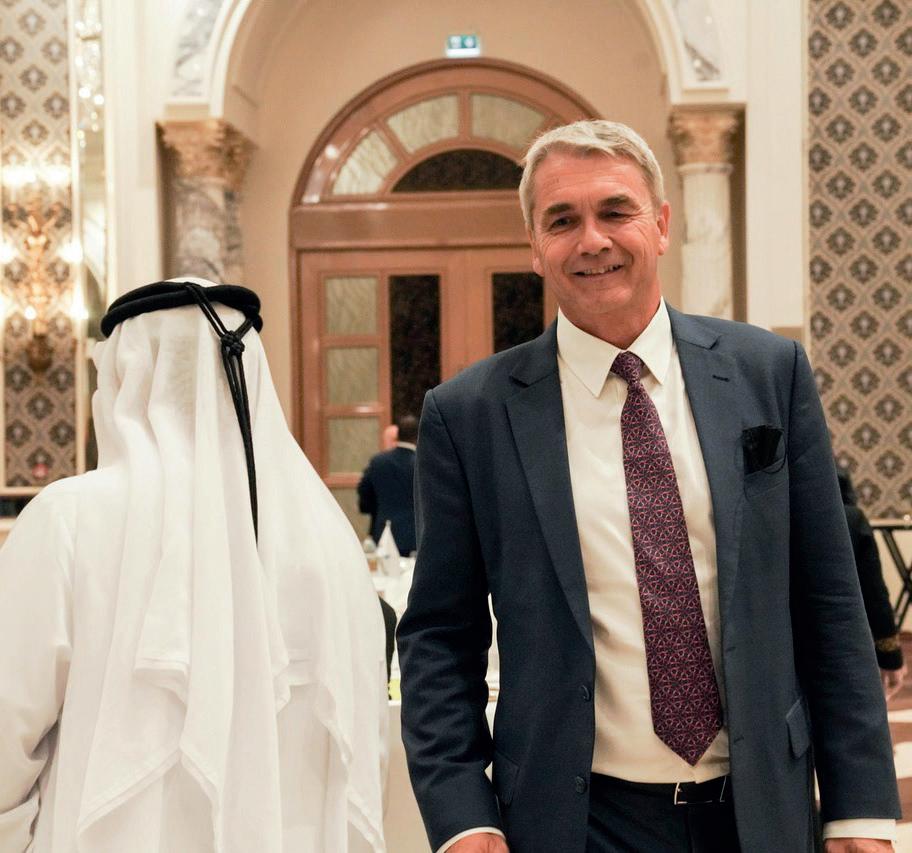
Once Nina Brink's right-hand man, he now lives as a real family man in Dubai. He graduated from higher technical school and came to Nyenrode for his CT training. That did not hurt Eric Tolsma (19870531). He recently started working for the American company USP&E that specializes in the trade and installation of self-contained "power stations.” The tougher the conditions, the more attractive are the assignments. For example, they are working on mobile power for a gold mine in the interior of Mali. In the Middle East, Tolsma has won a major project in Kurdistan. " Dubai is an excellent base of operations," says the pleasant CT'er.
BY OELE STEENKSEric Tolsma chose a year of business administration at Nyenrode as a CT student after his education in The Hague. He then started at Getronics in the field of industrial automation. In 1995 he saw the strong development of the Internet and made his entrance as employee number 10 at World Online, the famous Internet company of Nina Brink (now StormsBrink). He grew to Senior Vice President Business Development and M&A and experienced the historic IPO of World Online, with shortly thereafter the debacle surrounding the equity transactions for the founder's IPO. However, Tolsma would continue to
work with Nina Brink as Managing Partner of their private equity firm Renessence Ventures in London. His technical background continued to drive him into international projects in capital goods. For example, he worked for three years, from 2008 through 2011, for the Thomassen International Group, where he sold air cleaning systems to hospitals and institutions. His first exposure to the continent of Africa dates from 2011 to 2014, when he dealt with equipment deliveries for the Romar Group. He was working from Amsterdam at the time. Dubai still seemed far away.
Q: How did you end up in Dubai?
ET: "Friends of mine worked there. They recommended me to come to Dubai. I started working there in 2014 at Tricap Investments, which realized electricity projects in the Middle East, Africa and Asia. A year later, I got an offer to work for a Dubai-based multinational, which was Jampur International. Upon my appointment, we moved to Dubai as a family. The founder of Jampur, Mohammed Shafiq, is Pakistani by birth and has been running the company for 30 years. The man has built a huge network in Africa. Before Jampur,
I ran electricity projects in African developing countries, although the company is engaged in a range of activities in shipping, power plants, mining and the trade and installation of industrial machinery. Sales amounted to some $200 million."
Q: Last March you said goodbye to Jampur; why?
RT: "I noticed after six years that the culture of Pakistanis and guys like me, at some point the culture starts to fray. The culture of the Emirates, of India and of Pakistan is very top down oriented. The management consists mainly of family members and expects employees to always nod yes and do exactly what they are told. That did not always turn out to be the right way to go. I countered that from an international perspective for several years, but at some point it ran out. Incidentally, I have heard similar experiences from other Nyenrodians. When you go to work for a local company in the Emirates, the question is not whether you leave, but rather when you leave."
Question: what can you tell about your new job?
RT: "Meanwhile, I work for USP&E. It is originally an American company with headquarters in Johannesburg. I met the founder and CEO Will Gruver in Africa when I was working there for Jampur. We import, build and maintain power stations to generate electricity. The sales are about $100 million. We specialize in buying up power plants that are in need of replacement in Western countries. We know all of those to stand. We can dismantle them, transport them and rebuild and restart them somewhere else. Africa remains an important operating area, where we
book 60% of our sales. There we install many generators and turbines that run on diesel oil, heavy fuel oil and gas. Increasingly in combination with Solar installations. We are working on a 100 megawatt power station for a gold mine in Mali. To get there we have to fly for an hour and a half by charter, from the airport in the capital Bamako. The installation itself will be transported by road, so that's a mega job."
Q: What have you already been able to drive from Dubai for USP&E?
ET: "Currently, the Middle East contributes 15% of sales, but that should grow rapidly in the coming years. So far, we have secured a major project in Kurdistan, Iraq. There we run a 300 MW power plant with steam turbines running on crude oil. By the way, the city of Erbil is a particularly nice place for us to work because it has an American and a Dutch consulate, among other things. It is a city that is rapidly emerging. Erbil looks a bit like Dubai in the beginning, a lot of office buildings and villa districts are being built. This is paid for by oil extraction. This "special region" very much mirrors America and Europe. Isis has therefore not dared to undertake terrorist actions in Kurdistan. In general, USP&E is good at building and running power stations in difficult areas. It means that in a remote area, for example, you don't have any backup for parts. We are totally on our own. We have personnel who are trained accordingly. They are efficient, self-reliant and can plan very well. Saudi Arabia, Iraq, Syria and Yemen are the most interesting countries for me from Dubai. Soon I have a call about a delivery of gas turbines to the new Saudi city of Neom. Tomorrow I am flying with a colleague to India for 2 days to buy gas turbines for a project in Congo. We are looking for projects that are hardly feasible for competitors. There are therefore attractive profit margins on that."

Q: can you get additional benefits from an office in Dubai?
ET: "It is a state in which you are very free to act as a company. The office staff and installers are not very expensive. The conditions of employment are still linked here to the nationality of expats. European expatriates in management positions receive the highest salaries and emoluments. A secretary from, say, India
or Pakistan earns about 800 euros per month. That is tax-free. It seems little by European standards, but they certainly don't earn that at home.
You notice in these more economically expensive times that expats with longerterm contracts are being exchanged for new, cheaper expats. Germans, Swedes and the Dutch who belong to the first generation of expats are now being replaced by well-educated people from India and Pakistan. These have significantly lower salary demands. Hiring new, cheaper expats is mainly done in the hospitality sector, at airline companies, in stores and restaurants. In stores, for example, we saw Filipinos as sales clerks for years. Now these people are already being replaced by Africans. Kenya and Nigeria are the main suppliers of labor in this regard. Again, this is happening because of the lower salary requirements."
Q: are they always countries with an Islamic culture?
ET: "That is certainly not the case. Dubai has religious freedom. In fact, two areas have been designated and donated by the reigning Sheikh Mohammed bin Rashid Al Maktoum where each religion can build its own church, temple or synagogue and practice its worship. That's a big difference from Saudi Arabia, because there you don't have to search for a church. This does not mean that the Emirates allows itself to be dominated by foreigners. They are very strict about guarding their own culture. Every foreign association in Dubai is under government supervision. The association of Dutch expats and its board obligatorily includes two Emirati. Every activity is controlled by them. They do not want nationalistic movements to arise through associations, for example between Ukrainians on the one hand and Russians on the other, who have come here in quite a number. So the policy is to avoid nationalistic tensions in the United Arab Emirates.
Those Emirates board members are very friendly people; occasionally they come to a board meeting or to an event; and they take a good look around and go again. Meanwhile, they have been monitoring everything. Now the Dutch are not that dangerous, but I imagine there are dangerous tensions between
Indians and Pakistanis who are here a lot. As for the Russians; there is a contingent of Russians who are wealthy and have bought houses and apartments here. These manage to bring their families here and they will not pose a problem economically. But the influx of Russian youth who fled because of the mobilization of the armed forces is considerable. It remains to be seen whether all of them will find jobs in the Emirates. I can imagine that those people are painstakingly being monitored by the government."
Q: What is the state of fear of recession in the Emirates?
ET: "I think Dubai is doing well. There is a huge boom in construction now that the corona epidemic is over. The prices of houses and apartments have skyrocketed. There is a huge influx of tourists again; so the hospitality sector is doing well. While energy prices have risen in Europe and the US, the price of electricity has remained the same here, which can be a great competitive advantage for local industry. It seems to me that Emirates is working to attract more and more industrial production to this region.
For example, quite a few assembly plants are already established and there is a concentration of aluminum plants. So there is serious investment in factories and in manufacturing."
Q: Are all the major financial players represented in the UAE?
ET: "Without question, all the major international banks have offices here.
On top of that, the Emirates governments themselves have set up national banks. They all use the dirham as their currency, which is pegged to the US dollar exchange rate. If the Fed raises interest rates, the same day the increase is replicated for the interest rate in the Emirates. Furthermore, the days when you could go to a bank here with bags of cash to open an account is a thing of the past. All transactions are audited

internationally, particularly by the U.S. government. The link with America does have the consequence that trade with Iran, which was really an immense business for Dubai, has now completely dried up. When it comes to combating money laundering and terrorist financing, the UAE is completely in line with U.S. regulations."
Question: what does social life look like for you in Dubai?
ET: "My wife works for the Dutch consulate. From her job, we have quite a few events and we are active in the Dutch association. There are now an estimated 7,000 Nethercountrymen living or working in the Emirates. That includes women and children. Of these, 2,500 are members of the association. The highlights are the Orange Festival in April, for which Dutch artists are flown in, and the Entry of St. Nicholas."
Q: Are you enjoying the glitter & glamour in Dubai?
ET: "We live in an ordinary house with a big garden. Most days of the year we sit outside on the terrace. We go to parties at people's homes or we celebrate birthdays here. Regularly family members, like grandparents, come over to stay here for a week. And in the winter we regularly go into the desert to camp and I play golf almost every day in the morning. People who come here for the first time will marvel at the glitz and glamour of the city. For us the appeal of all those nightclubs is not that great. The fact that they are there is fun, of course." ♦
Eric Tolsma with wife and daughter receives family of business partner from Kurdistan
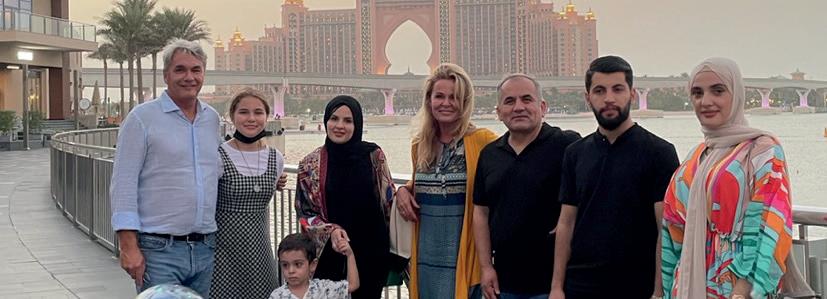
Egypt is working hard to restore the international grandeur that Cairo had in the last century. After major political problems, President Abdul Fatah al-Sisi is working to turn Egypt back into a showcase of archaeological wealth and Islamic culture. Tapping into natural gas is helping to finance this. Alumnus Claudia Dayoub (20170803) thinks she can contribute to a more modern Egypt.
What is your relationship to Egypt?
CD: "I was born in Egypt and lived in Cairo until I was 18. Then I left for 5 years, I was 3 years in Breukelen and 2 years in Madrid. Now I am back and working in our family business with my father. We import machines from all over the world to Egypt and take care of the after sales."
Q: Where do you live and what is your social life like?
CD: "I live with my parents in a residential neighborhood in Cairo. It's normal, in our culture girls and boys stay at home until they get married."
Q: Are you looking forward to a possible marriage?
CD: "I'm 23 years old and I'm definitely not looking forward to getting married right now. I want to build my career and be financially independent before I think about that."
Q: What is it like to be a businesswoman in Egyptian society?
CD: "Most women stay home, get married and raise children, but there are more business examples. So it's still special, but your social circle is no longer shocked if you're a businesswoman. "
Q: Egypt has 100 million inhabitants living mainly in Cairo, Giza and Alexandria; what is it like to have a personal and business life in such a densely populated area? 20 million Egyptians live in the Cairo metropolis alone.
CD: "I grew up in the hustle and bustle of Cairo. For me, hustle and bustle is normal life. It was really a shock when I came to rural Breukelen."
Q: How did you end up at Nyenrode?
CD: "I have a Dutch mother, so I wanted to investigate my Dutch ancestry further. I found NBU on the Internet and my mother made further inquiries. Everyone in Holland said it
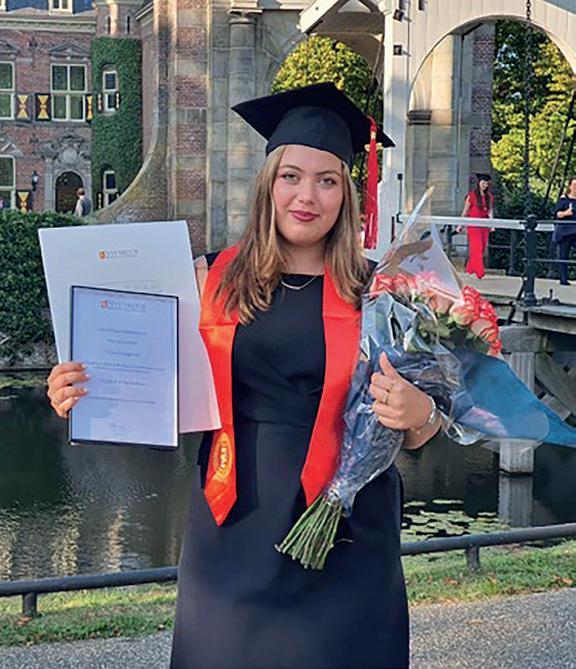
was an excellent business school. And after visiting the Breukelen campus, I just fell in love."
Q: How did your parents meet?
CD: "My mother worked at the Dutch embassy in Cairo. They met in her first year of stationing. They fell in love, but her job required her to move to London, after which they maintained a long-distance relationship for a while. Then she decided to quit her job to come to Cairo and get married."
Q: In practice, Egypt has a disguised military regime, although an elected parliament is active. Since 2014, Abdul Fatah al-Sisi has been president of Egypt. How do you experience the president's rule?
CD: "Egypt currently does have a democratic system, but it is a different form of democracy than what you see in Europe. You have to realize that 40% of the 100 million inhabitants of this country are illiterate. They cannot read and write. So their vote can easily be bought with a bag of sugar or a bag of rice. To govern a country like Egypt of over 100 million people, you need a strong leader who has the support of his people plus a vision and a project. Our presidential elections are held every 6 years, for a maximum of 2 mandates. This is done according to our 2014 constitution. American or European democracies do not apply until we educate our people. We have parliamentary elections every 4 years for both the upper and second chambers."
Q: Political parties based on faith are banned in Egypt, but Sunni Islam is the state religion. What does this mean legally; how strict is sharia law?
CD: "Of course Islam is the state religion, but there is no question of oppression here. As a woman, you don't have to wear a veil and you can walk the streets in Western clothing, but still cover up minimally. However, there are rules for drinking and selling alcohol. The situation here is not comparable to that in,
say, Iran or Saudi Arabia. Reports on the Internet about violence against women in Iran are shared here and certainly not approved. We are also making progress ourselves. As of 2023, the mention of religion will no longer be applied to your ID in Egypt."
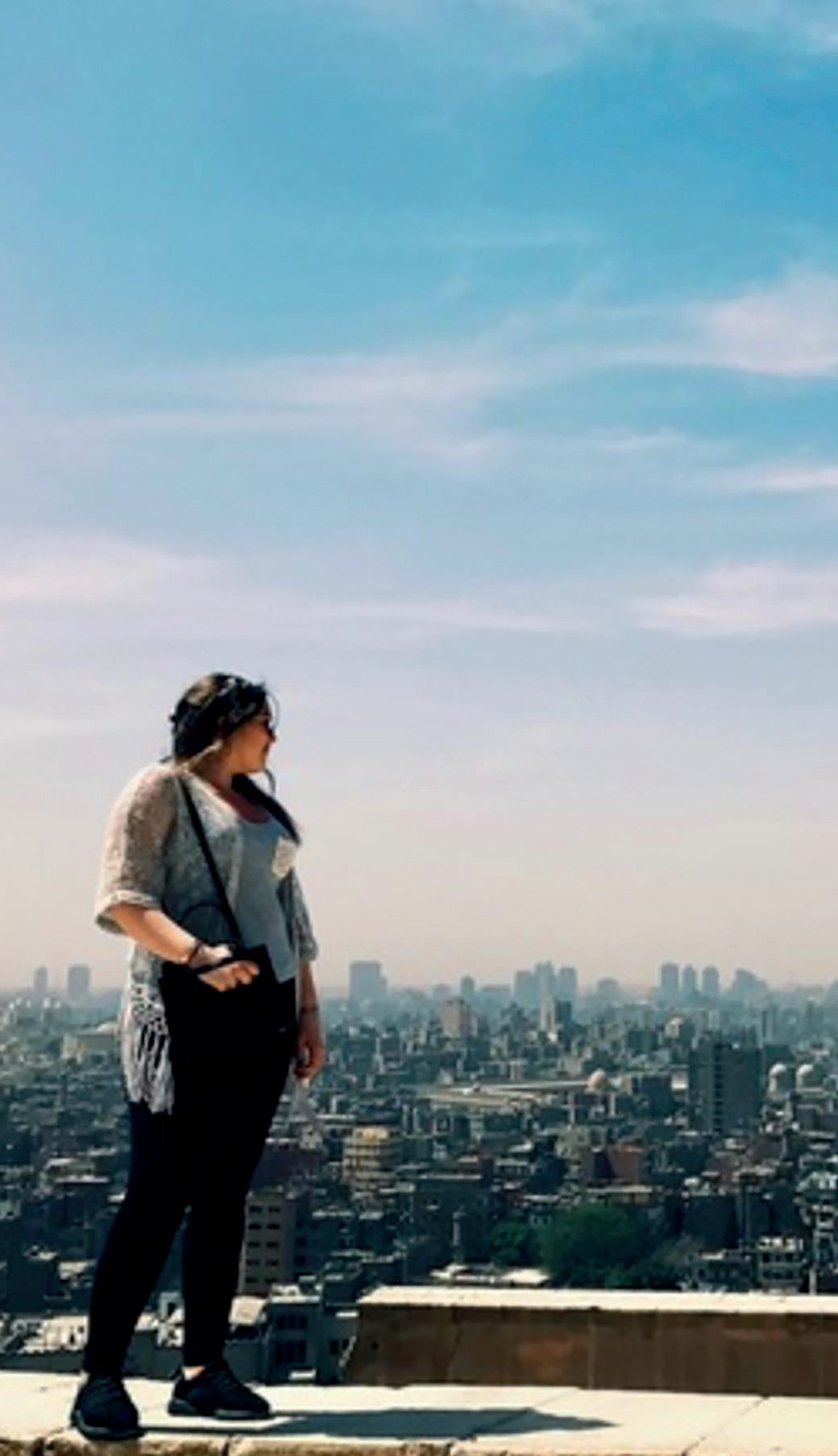
Q: International reports claim that there is a lot of sexual violence against women in Egypt and that this also happens within marriage. What is your opinion on this?
CD: "I can't agree with this, but I also can't disagree. I see sexual violence against women as an international problem. It is certainly not a specific problem in Egypt, but it can be more difficult to report sexual violence as a man or woman to the police. That certainly has to do with society not recognizing sexual intercourse outside of marriage. If a girl becomes a victim of rape, it can jeopardize her entire future as a married woman. I do see more and more protests being posted on the Internet against this state of affairs."
Q: Egypt would also have outdated legislation on homosexuality; do you agree with this statement?
CD: "In this area, not much has changed. When I have to explain this to friends from Europe, I always say, try to imagine what the views on homosexuality were like some 50 years ago in, say, the Netherlands. Then you have the situation in Egypt today. It will change, but it will certainly take a few more years before we can talk about the subject publicly."
Q: The Egyptian secret service has a bad reputation; how do you experience this in the daily lives of Egyptians?
CD: "As far as I am concerned, that is not true. We do not experience anything of oppression by the secret service and we do not see their presence in everyday life. The function of the secret service is to fight terrorism and disrupt the activities of Islamic extremists. We knew terrorism during the period when the Islamic Brotherhood was in power in Egypt, which was in 2012 under the leadership of President Morsi. Millions of people took to the streets across the country asking the military to put an end to the lord-fraternity. This Islamic movement has been banned from Egypt; so membership is criminal."
Q: Youth unemployment in Egypt is very high; what is being done about it?
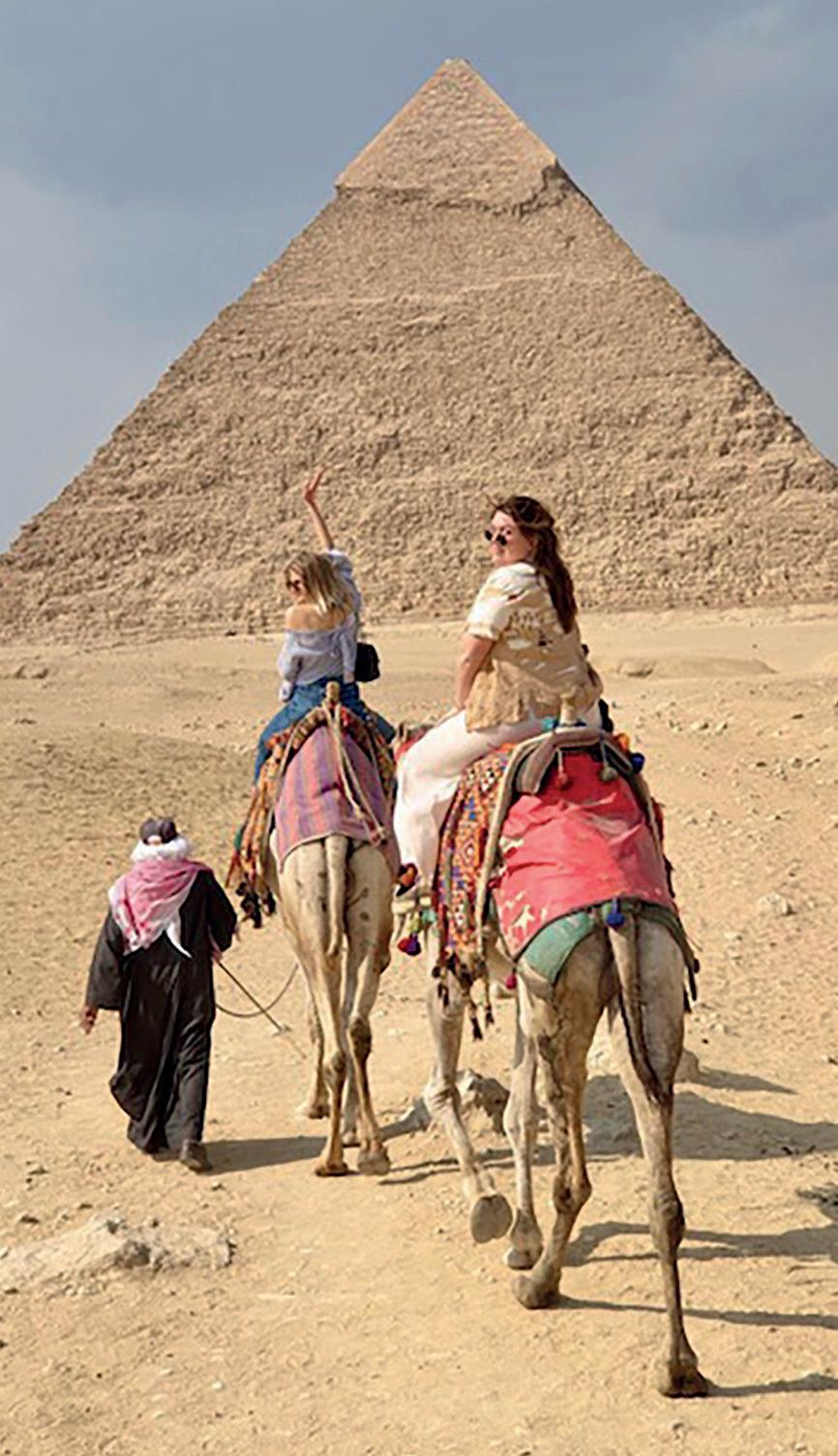
CD: "The government has launched a campaign to give 5 million young people a job in construction and infrastructure projects. Our problem is the rapid growth of the population. Two million people are added every year; that's a lot. So the government has started a program to reduce the number of children per family. And we are working to train young people, for which more and more teachers are being brought to Egypt from abroad."
Q: Egypt is located partly on the Arabian Peninsula and partly in Africa. The country has an army of half a million soldiers (0.5% of the population). The army not only has a defensive role, it is also a commercial party that does a lot with water supply, construction projects and energy production. How do you experience this from a business point of view?
CD: "Every Egyptian man must report for military service at the age of 18. The army is important to maintain peace and stability in the country. During the revolution, the army was an emphatic presence on the streets, but now soldiers remain more in the background. They have contributed
much to the construction of dams, water supply systems and power plants. The state has delivered many infrastructure projects with the help of the military. Since the beginning of the year, army or government projects have been privatized through direct sale to an Egyptian private sector company or to a foreign investor from Gulf countries. Others will be offered for sale on the Egyptian stock exchange. That has really helped the country move forward and pay some of its foreign debts. "
Q: Recently, President Putin of Russia was on a state visit to Egypt. In 2017, President Abdul Fatah al-Sisi visited President Trump at the White House, where it was stressed that Egypt is an ally of the U.S. in the fight against Islamic terrorism. Has President al-Sisi made a U-turn to Russia or does he want to keep the superpowers friendly?
CD: "Here in Egypt, we have a good relationship with President Putin, because during the 2013 revolution, when the people wanted to get rid of our President Morsi, Russia was the only country to supported the revolution and Putin the only president who was behind the Egyptian uprising. Meanwhile, the US and EU continued to stand behind the Muslim Brotherhood, knowing that our people were being oppressed. This affected the political relationship with the US. President Abdul Fatah al-Sisi Sisi's policy is to maintain a good relationship with both the US and Russia, which is understandable based on our recent history."
Q: A strategic partnership with China has also been under-signed; what benefits will this bring to Egypt?
CD: "That treaty means a lot to Egypt because China is willing to make big investments here. We also import a lot of consumer products from the People's Republic."
Q: Egypt is receiving billions in aid from the United Arab Emirates and Saudi Arabia. Why is this aid needed and what is the purpose of this bailout?
CD: "This financial support is needed to pay off Egypt's sovereign debts. It is also part of their investment strategy to create new international revenue opportunities to replace oil and gas exports in the coming decades."
Q: In 2017, a large amount of natural gas was tapped in Egypt, resulting in significant exports of LNG. To what extent has Egypt made economic progress?
CD: "That discovery is extremely important. Egypt may become a hub for LNG in the near future. The drilling site is on the northern coast of Egypt on the Mediterranean Sea. We are in a strategic location toward Asia, Europe and Africa. There is already a pipeline running the gas to Israel. A new pipeline is under construction that will connect Cyprus, where new gas discoveries have been made, to our two liquefaction plants on the north coast. Through that route, Egypt can begin to benefit from LNG exports to the European gas market."
Q: To what extent can Egypt serve as a springboard for doing business in North African countries, which often have Islamic regimes?
CD: "Egypt is the springboard to the African continent.
We could be the logistics hub for many multinational companies. Egypt, with the help of the African Union, is involved in building a 12,000-kilometer road network that will connect Alexandria to Cape Town in South Africa. Foreign investors can definitely take advantage of that."
Q: Is there an upper layer of wealthy Egyptians who can invest internationally?
CD: "That is certainly the case. Their investments are primarily focused on business interests in the Arabian Peninsula. Cairo is still a center of Arab cooperation with the headquarters of the Arab League. This also makes it an economic city where international investments can be set up. For example, we have free trade agreements between many Arab countries and Egypt, also many African countries have a free trade agreement with Egypt, called Commissa, so there are no import duties on all goods that are manufactured in any of those states and Egypt. "
Q: As a businesswoman, can you take advantage of this favorable starting position?
CD: "Absolutely. Our company can make deals with machine manufacturers in the United States, for example. We have a low-wage economy here in Egypt, although not comparable to Asian countries, but assembly in Egypt offers a significant cost advantage. So here we can develop a lot of added value."
Q: What benefits can you get from the Nyenrode training when doing business in Egypt?
CD: "My group in the BScBA program included a student from Morocco. There was great interest in our experience as emerging businesswomen in the Arab world. In addition to doing business with Arab countries, we also studied trade opportunities with African states."
Q: Cairo has traditionally been a center of Arabic education, culture and trade. Do you think that Egypt is making sufficient use of this heritage?
CD: "Half a century ago, Egypt was the cultural center of the Arab world. Thus, there were singers who were world famous. Also, the Egyptian dialect of Arabic was the leading variety. It was understood in every country with Arabic as the official language. The younger generation in Egypt still gets the pride in our cultural excellence from the older generation, but unfortunately the importance of Egyptian culture has declined. However, I am convinced that our culture will be rediscovered through growing tourism. After all, internationally the historical monuments from before the Christian era are about 40% in our country. We preserve and guard our monuments very well and new archaeological discoveries are made every year.
The government also invests a lot in exhibiting our historical heritage. For example, a new museum has opened that is entirely focused on exhibiting 36 Royal and queens mummies. This November, the largest museum dedicated entirely to Pharaonic civilization with a special section for all the Tutankhamun treasures is opening." ♦
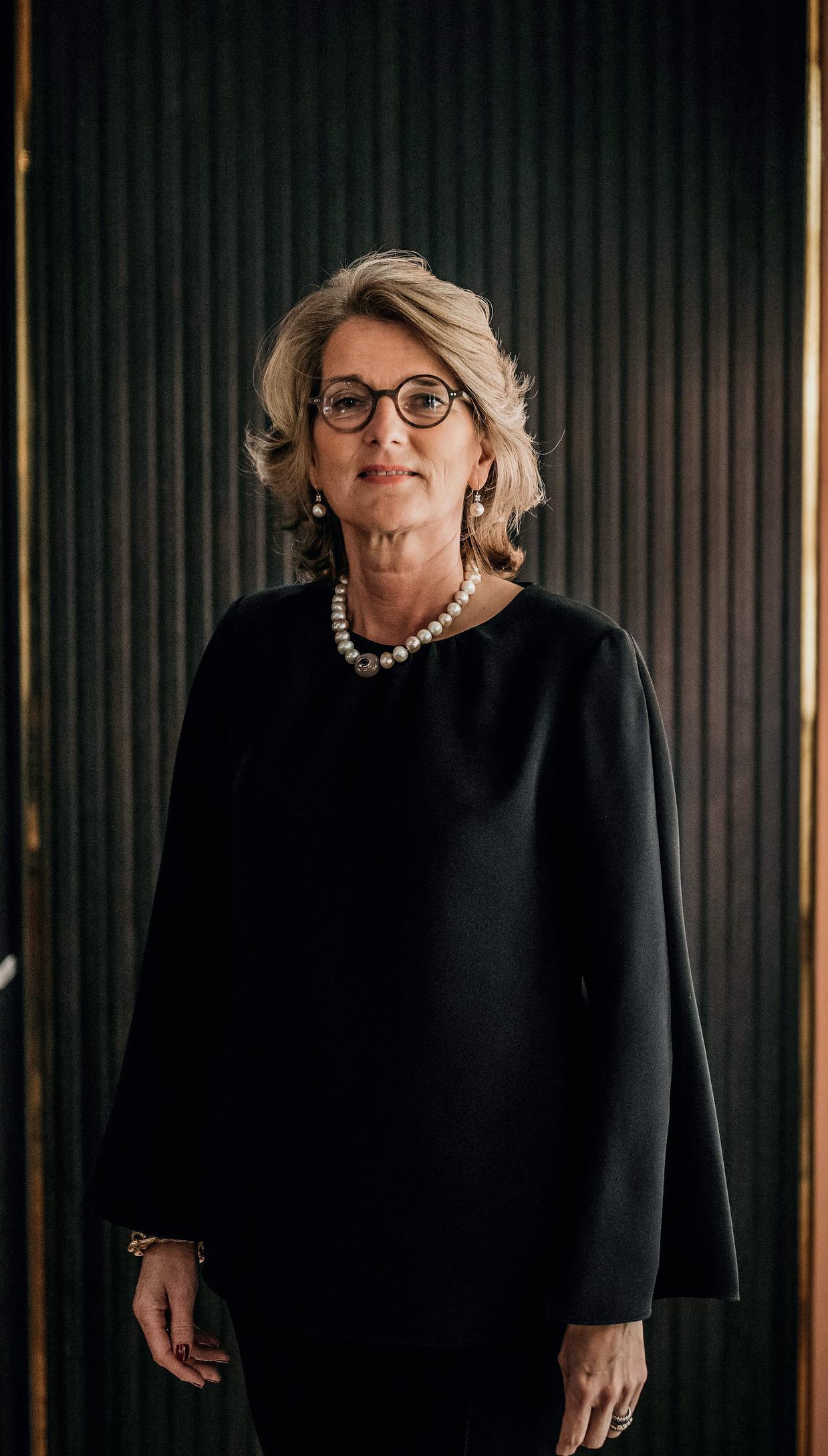
"Diversity is like a rough diamond which should be sharpened To go shine!"
Making an international career in an American concern.
Alumnus Marguerite Soeteman-Reijnen (19850161) succeeded in becoming chairman of the Aon Holdings Board. She has 32 years with the same employer, but shows herself to be enthusiastic and combative about moving toward more diversity in her company. Directors will have to bet heavily on more women, more minorities and more distribution of talents to cope with the uncertainty of the future, she believes. "I have sought it primarily in depth and content, but have also learned that form and relationships with all possible stakeholders are oh so important."
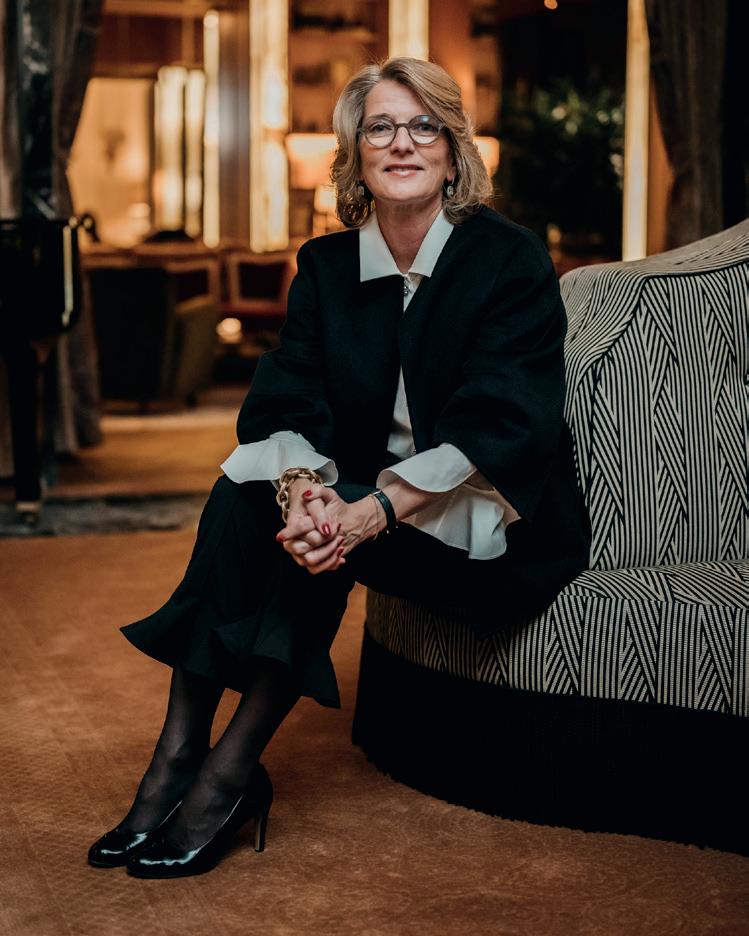 BY OELE STEENKS
BY OELE STEENKS
What has driven you in your career: money, power or status?
MSR: "None of the three.
I have a houseboat on the Kaag and overlook a shipping company where superyachts are built for the richest of the rich. I always wonder what exactly it says, if you own such a yacht. What is the added value? My husband (pilot at KLM) always says the value of a car is that you can propel yourself in it, the value of a house is that you have a roof over your head and a home. If you change your car or house, to bigger and/or more beautiful, that intrinsic value will will not change. My drive has always been professional challenge and bringing about progression."
Q: So what did get you to the top?
MSR: "My motto is believe in yourself otherwise no one else will believe in you. In doing so, you must have the willingness to keep learning and take a real interest in others. Learning is especially learning from other people. With that knowledge and experience, I would like to help people grow in their work environment. I looked for it a lot in depth, while men around me were very skillful in the corporate chess game. So I had to learn from that as well. The board of Aon is in the US; making yourself visible for the right reasons to your colleagueseven remotely - is important. Mastering that game got me where I am today and I became chairman of the Aon Holdings Board."
Q: There was a time when male executives could develop five bullet points for leading a company as a mantra and could recite them day and night in response to the question of what direction the company should take. Did that apply to you as well?
MSR: "That's the classic consulting approach that has taken many companies very far in the past. The acceleration in society and existential challenges that accompany it, however, show the need for more "situational awareness": accelerated deepening of knowledge and experience, which can be used to make sense of a company's social role in a constantly changing society; in the process, change has become a transparent process and adaptability an art. Failures and abuses are communicated via social media immediately. The point is that managers must be able to assess the social context. In doing so you have to have the courage to steer your course. It is important to remain the 'master of your own destiny.’ So I have pursued that."
Q: You worked for Aon for 32 years; isn’t that a very long time?
MSR: “In management studies there is a lot of
talk about resilience. I like to use the Japanese proverb, “resilience is falling seven times and getting up eight times.” With a generation of colleagues, I have learned in small steps to fall and get up again. Learning from your mistakes and experiences and thus growing. Recently I was alerted to a scientific study on motivation. It turned out that what motivates employees the most is not a pat on the back or more salary, but whether they can make progress and thus continue to learn. I certainly experienced this myself. I have always been given the opportunity to broaden my horizons and deepen my knowledge. At no company - not even at Aon, however, can you make unlimited mistakes. Projects can sometimes turn out differently than expected; "fail early fail smart" is then the motto. It may be better to quit early and learn from your mistakes than to keep going to avoid losing face."
Q: A recent study by the Central Planning Bureau (CPB) and the Social Cultural Planning Bureau (SCP) indicates that the Dutch part-time culture, perceived risk aversion of women and aversion to competition hinder women from reaching top positions. How did you experience this yourself on your way to the top?
MSR: "I myself have always worked full-time. I did not shy away from challenges and competition. The harder it got, the more challenging I found it and the more I gritted my teeth. So I pulled out the study in question. It dates from 2018. Kim Putters (director of the SCP from 2013 to 2022, editors) recently became president of the SER, where I am going to see him regularly. I will certainly question him and Pieter Hasekamp (director CPB, editors) in more detail about this study and their vision in 2022. Despite the fact that historically the Netherlands was one of the first countries in Europe to grant women the right to vote: namely, as early as 1919, we have been lagging behind some other countries in recent years on
the field of gender equality. In Switzerland, where I also serve on a diversity advisory board, this same right to vote for women was only introduced in 1971. In the World Economic Forum's 2021 gender-equality index, Switzerland is now in the top ten. By contrast, the Netherlands is only in position 28. So we have lost our lead on the area of equality. Dutch women are European champions of part-time work. 75% have a part-time contract. McKinsey calculated a few years ago that if we in the Netherlands could better utilize female potential this would improve Dutch GDP by EUR 114 billion. The low Dutch willingness to work more hours or even full-time, from both men and women, is currently causing in part labor market challenges and affecting productivity and our international competitiveness. In many occupations, studies show, labor market shortages could be improved perhaps even solved if people worked a few more hours per week.”
Q: In talk shows, there is a lot of focus on personal sensitivity. People who were bullied in their youth write a book about it and are then invited to sell their story to the general public. Isn’t it true that we drift away from mental toughness To reach the top in business?
MSR: “Mental health is a great good for anyone. It is about a person learning to have love for themselves, have selfconfidence and pursue self-care. This may allow you to place and overcome and/or accept past and/or present issues. I recently met Usain Bolt, who said that the recipe for winning is overcoming loss. This is also a principle of golf. Every hole you play is a new opportunity. Successful people always look ahead and learn from the past.”
Q: When you look back on the years of study at Nyenrode, Can you say that a foundation was laid there for reaching the top in a “man’s world”? Can you name three key lessons?
MSR: "Oh absolutely. I learned there that a healthy mind in a healthy body is important. I also learned to appreciate camaraderie and I developed guts and courage there to
Q: You are at the helm of Aon Holdings, part of Aon an international organization with 500 offices in 120 countries. Is it possible to bridge differences in culture - for example, the caste system in Indiaand religion - the position of women under stricter Islamic regime - within Aon's modus operandi?
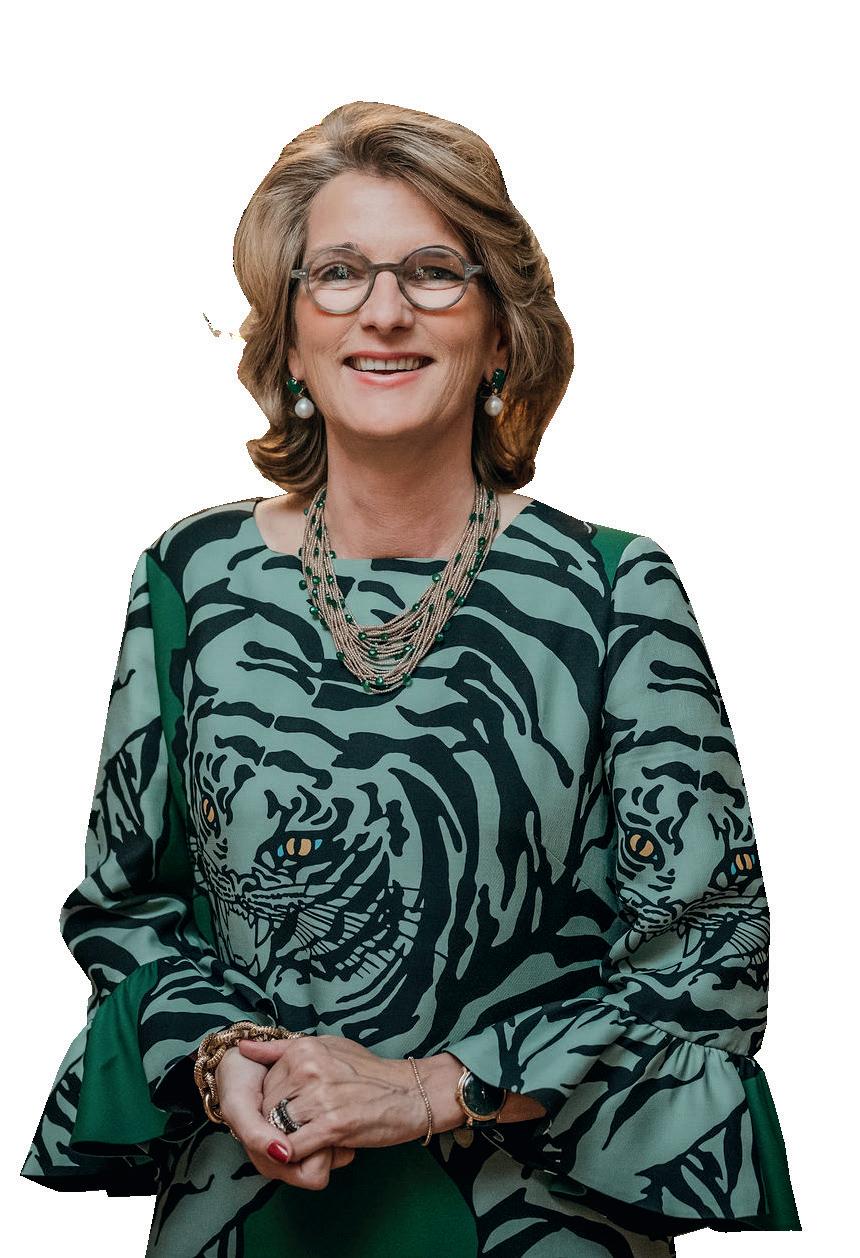
MSR: "American professor Daniel Coleman wrote groundbreaking books on leadership. According to him, a good leader must possess five basic qualities; selfawareness, self-reflection, empathy, social skills and motivation. Can you empathize with other people and tap into what is going on in them? Can you
listen? Self-awareness means; do you know who you are. Are you aware of your limitations? Self-reflection revolves around the question, do you dare to ask yourself looking in the mirror? The latter is more important in practice than we think. How often might you irritate yourself with statements made by another person in, say, a meeting. Look in the mirror, and instead of pointing the finger at the other person, ask yourself the question, what does this say about me? Why does this irritate me?
Do I dare to embrace other perspectives? If not, why not? With those basic principles in mind, I manage my part of the organization. In countries like Indonesia, Japan and India, you have very different social systems. Over the past year, I have had several online meetings with those countries. Especially in India, you find that it is not a given that colleagues from different castes and religious groups have contact or would meet locally. I very consciously have put those people in touch with each other, Had I not done this, the collaboration would most likely never have come about. These are circumstances in which you can take people out of their routines and marvel, just as I have marveled to myself at the progression in diversity.
It's not easy, but it's definitely doable. I like those challenges and I let my heart speak. Diversity is like a diamond in the rough, which you have to know how to find and then start polishing, just as long as it shines in all directions. That is a process of sometimes years and results are achieved through hard work. Especially at this time when the profile of leaders is being drawn up based on more and more internal and external challenges."
Q: Aon is engaged in insuring of commercial risk, reinsurance, retirement benefits and providing data and analytics for risk management. On the website it says that you are on top of the issues of our time, but how does the core business fit in with achieving progress in the world?
MSR: "Our society is set up based on fear. Perhaps even too much so. However, the Chinese sign for crisis is not for nothing both danger/risk and opportunity. As Aon, we enable individuals, institutions and companies to mitigate their risks in order to achieve their goals. In doing so, we try to emphasize opportunity more. After all, uncertainty is part of human existence, entrepreneurship and business. We do this by analyzing our clients' risk needs and then providing them with products and services that meet their needs. However, it is also done by innovating in the field of ESG and looking at what unmet needs clients have in this rapidly changing world."
Q: On the Aon website, you also notice how much attention is paid to the recruitment of young talent. How important is this phase for cultivating an organization in which diversity and inclusion are an asset?
MSR: "Our talent comes from many quivers. Among other things, we walk around universities to scout talent. However, we also have an apprenticeship program in the US and in the UK, in which young people who have not been
able to get the right education, because they often did not have the means to do so, but do have potential leadership but also other relevant, for example technological qualities, are brought in. Very good talents have already emerged from that. When recruiting, managers still look too much at resumes. We are quickly impressed if someone has worked at major brands or institutions such as the Dutch Central Bank or Coca-Cola. However, a resume says nothing about a person's potential. As such, the value of resumes may be somewhat outdated. Dutch startup Equalture, founded by twin sisters Fleur and Charlotte Melkert, lets candidates complete neuroscience games that give companies more insight into their talents and behavior. It is a screening and matching tool that thereby eliminates preconceptions and matches companies to candidates based on objective parameters. The platform is an international success and last year honorably recognized by being listed on the "Forbes Under 30."
Q: Is NBU doing enough diversity?
MSR: "There are still too few girls coming to Nyenrode. For that, you have to make some adjustments in your hiring policy, but also in the organization of the faculty. Furthermore, you should look at the marketing of NBU. Is the university being positioned in the right way? What kind of role models are there to highlight equality and inclusion? The history of Nyenrode is very much male-driven. All the buildings are named after men."
Q: The recent problems with the misogyny of the Amsterdam student body do not inspire much hope about the nourishment of the potential administrative network. How do you respond to this?
MSR: "Through social media, such a dinner is immediately on the street. Painful and an example of "group think behavior," acting tough and so on and so forth. No excuse for this though, very stupid! I do think it is important to emphasize, though, that you are allowed to make mistakes. If you have been punished for it, you should be able to move on. We must not move towards a society where people are not allowed to make mistakes and/or are judged for them. The expressions at such a corps dinner are not acceptable, let me be clear about that. However, it has given us another opportunity to sharpen the social discussion on diversity. Students do need the opportunity to explore their boundaries among themselves. However, offensive and sexually harassing behavior is out of the question.
When I was at Nyenrode, songs like "Walking Down Canal Street" were also sung and there was a certain male-female tension. Looking back on my career now, that experience has definitely helped me hold my own in a male-dominated culture. With a lot of humor, I got through certain situations. That is not a form of approval. Our society and also our business community should be state of the art according to the zeitgeist of today. After all, why should young, talented people have the negative and/or challenging experiences that previous generations have experienced?" ◆
Q: The demand of the Dutch people is that there should be more perspective to cope with problems of our time, such as environment, corona, nitrogen, energy and security. What is the business community doing?
MSR: "The international trust barometer from U.S. PR firm Edelman shows that trust in governments and media has never been so low. (Family) businesses, on the other hand, enjoy very high levels of trust. Why is this? 1995 was the beginning of the Internet age. Of today's Fortune 500 companies, only 17 did not yet exist in 1995. The names can be guessed ... Tesla, Netflix, Meta and so on. So the remaining 483 existed in some form back then. Most of these companies have a history in which they have demonstrated their ability to adapt to the spirit of the times. They all went through a process of falling, learning and getting up again. They continued to successfully seek the unmet needs of customers, responded and showed resilience, then innovated, therefore remained relevant and retained trust. We see some of that in the Edelman Trust Barometer. The more than 30,000 respondents in more than 30 countries are asking companies and their leaders to make tangible contributions to the big issues of our time, including climate, sustainability and geopolitical issues. Each company will have to consider for themselves how to meet this demand and expectations of their constituents."
Q: Already 9 European countries have had or are at the helm of a female prime minister. Outliers are the UK and Finland with three female MPs each. Do you think that appointing the first female MP here would make a difference to the functioning of the social upper class in the Netherlands?
MSR: "As far as I'm concerned, it's not so much about the individual as it is about the team that rules the Inner Court. Both Nyenrode and Harvard Business School lecture on the parameters of high performing teams. Diversity in the composition of the team is important here, not only gender, cultural diversity, etc., but also the relevant knowledge and experience at the table and how the team members-i.e. the cabinet members-relate to each other? How is there communication and how are decisions made? The prime minister is the one who directs the team, which from me can be a woman or a man. Of course, a female prime minister can be an excellent role model for future generations. You can be what you can see! Last but not least, it has to be a politician who understands that "what got us here, won't get us there." A politician who is willing to keep learning, curious about others' ways of seeing and thinking, and above all can and is willing to listen. After all, society is subject to constant change. My personal chair at Nyenrode has a quote from Stephen Hawking, "Intelligence is the ability to adapt to change. Emotional and intellectual intelligence as well as adaptive ability to adapt to changing circumstances are crucial. However, if things are not going well, change may be desirable: Albert Einstein pointed out to us delicately on the fact that we cannot solve a problem with the mindset that created the problem." ◆
Q: A study by the CPB and the SCP states that no clear business case can be made that more women in top positions lead to greater profitability. What do you think of such a conclusion?
MSR: "There are about 90 international studies worldwide to the contrary. These studies, from reputable parties such as McKinsey, Goldman Sachs and Morgan Stanley show that there is indeed a correlation between diversity, equality, productivity, innovation, sustainability and profitability. However, the economic business case for diversity and inclusion is currently being overtaken left and right by the moral call for equality and "fairness." Recent research by Professors Oriane Georgeac and Aneeta Rttan, published in Harvard Business Review, shows that minorities and women do not want to work for companies that claim to apply policy principles of inclusion and equality, but use their selection of minorities and women as a cover for the pursuit of pure short-term profitability. Similarly, the 2022 Randstad WorkMonitor study shows that globally 41% of those surveyed no longer want to work for companies and institutions where diversity and inclusion norms and values are not properly represented in policies."
Q: Perhaps there is something fundamentally wrong with labor relations in the Netherlands?
MSR: "The standard for social success, even in Netherlands, has been very masculine for a very long time. Capitalism and a patriarchal model often go hand in hand. Performing as much as possible, working, earning money, accumulating status and being assertive about it were all part of that. As French writer Simone de Beauvoir proclaimed, masculinity has penetrated the capillaries of Western society. Piece by piece, the feminine and masculine attributes of success are currently being intertwined and we are arriving at a more gender-neutral description of what successful and responsible leadership should encompass."
Q: During the year 2022, the percentage of women on Dutch supervisory boards was raised to the legally required standard of 33%; thus we are in line with the European average. Is this satisfactory?
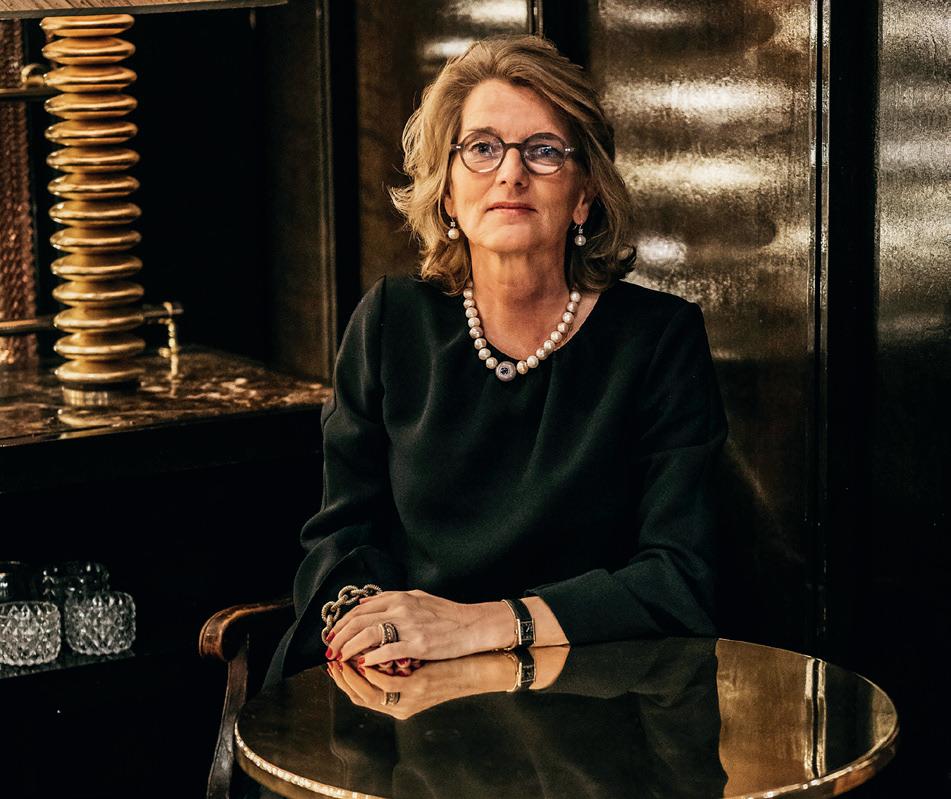
MSR: "In 2019, at the request of a number of ministries,
the SER issued advice on the path of female talent to the top and the need to accelerate this in Dutch business. This advice embraced cultural diversity in addition to attention to gender diversity and was subsequently adopted in its entirety by the Senate and House of Representatives. The Gender Balance Act is the result and took effect on January 1, 2022. The law first embraces a statutory quota of at least 30% female and male supervisory board members in listed companies. In addition, the law stipulates that the top 5000 Dutch companies (companies with more than EUR 40 million turnover and more than 250 employees), which are listed companies, but also larger (family) businesses, will report to the SER on their progress in the area of diversity, including appropriate and ambitious targets. Third, companies should include not only gender equality and inclusion but also cultural diversity and some other diversity in their reporting. The new law has led to a run on female supervisory directors. Several stats show that there have been more female commissioner appointments in the past year. In the EU context, President of the European Commission, Ursula von der Leyen to her credit worked to tighten up gender equality. Within 5 years, 40% of supervisory directors should be women or 33% of members of the BoD and SB combined, must be women."
Q: But is the new legislation going to deliver the desired diversity of businesses?
MSR: "The legislation will certainly put the issue of diversity further on the board agenda. However, it will have to be seen in the future whether the recruitment of female supervisory directors will also lead to the appointment of more female corporate directors, and also ensure the development of female talent from which board members can be recruited. For now, we see a kind of counter-movement. The Dutch AEX scores poorly on gender equality in Boards of Directors: 12% women is a disappointing score. We have declined 2% with this over the past year. Companies run a reputational risk if they do not meet society's call for diversity. In these times of labor shortages, this is a real risk. After all, top management itself acts as role models. If you can't showcase women and representatives of other cultures, other than white men, in the boardroom, then talent is not going to choose your company." ◆
"Success has been masculine for a very long time."

Legacy has long since ceased to be the preserve of family and traditional charities. More and more people are leaving part of their assets to universities after life and thus contributing to the future. This is how you provide opportunities for a new generation. Also at Nyenrode, we are increasingly being asked whether it is possible to donate through a will.
We are not yet as far along as in the United States, where it is very common to include an educational institution in your will, but it is happening more and more often. After all, education is the greatest gift you can leave to future generations.
Donors sometimes choose to support a cause with which they feel connected. These are often in line with renovating monuments on the estate, promoting research or enabling scholarships.
Studying at Nyenrode is not for everyone. Since the banking crisis in 2007, loans are really not just taken out anymore, which means that many potential students cannot afford to study at Nyenrode. The Nyenrode Fund Foundation offers scholarships for these talented students. Scholarships made available mostly by alumni, during their lifetime and after their death.
As a private university, Nyenrode is not eligible for any subsidy from the state when it comes to conducting research. It is therefore of great importance that donations also come in for this purpose. This enables us to fund PhD students and professorships, thus further strengthening Nyenrode's academic foundation and realizing social impact. To address the social challenges we face in the Netherlands, research is essential.
Heritage is the third pillar at stake in fundraising from the Nyenrode Fund Foundation. The estate with its twenty-seven monuments requires constant maintenance and renovation. We all cherish our memories of the Castle, the Coach House and the Rose Garden. Memories that we are able to maintain, in part through donations from our alumni.
Any contribution, large or small, is most welcome.
The Nyenrode Fund Foundation is recognized by the tax authorities as an Institution for General Benefit (ANBI). This means that no inheritance tax or gift tax has to be paid on inheritances and gifts received by the Nyenrode Fund Foundation. They are therefore entirely for the benefit of the work of the Nyenrode Fund Foundation. Want
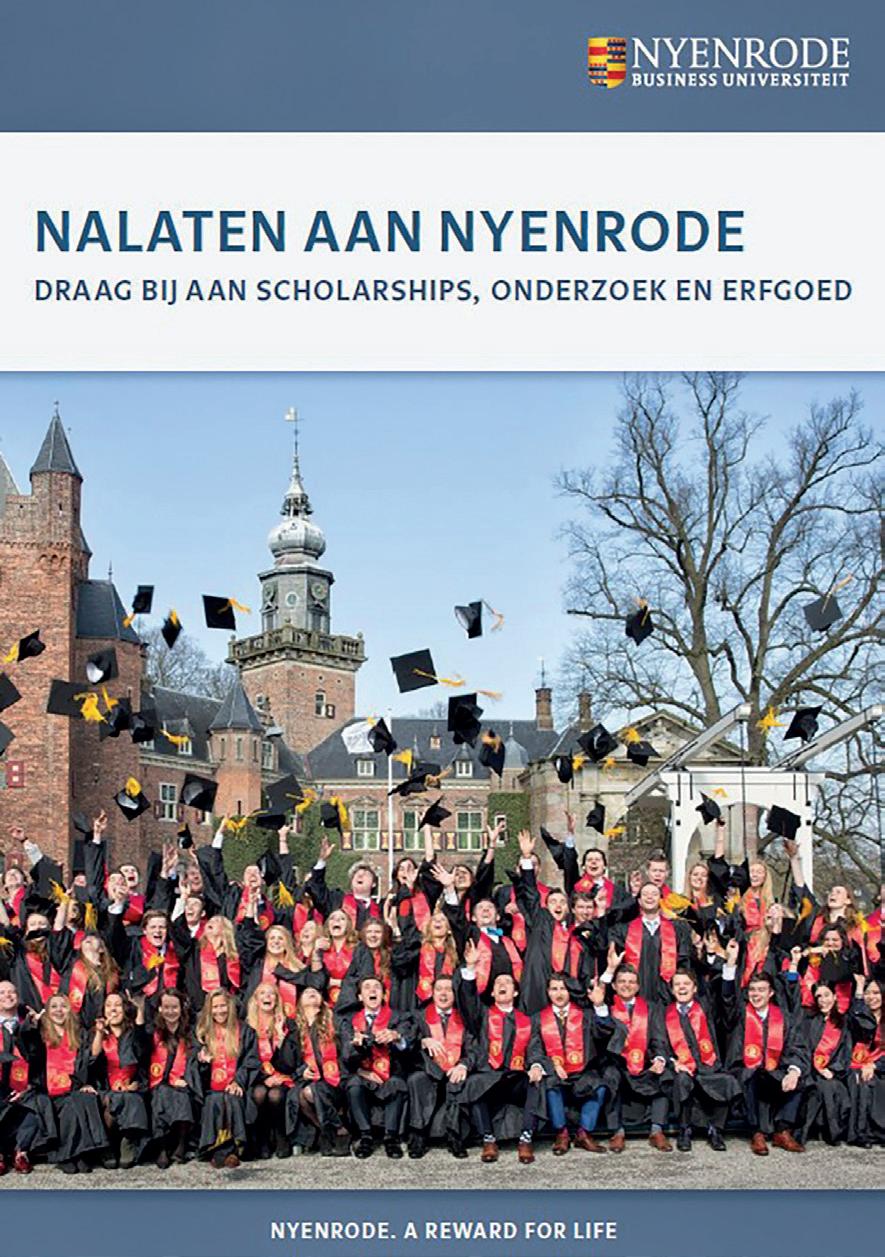
Editorial: Alumni Office - info@nyenrodealumni.nl Send in personal news: mail to info@nyenrodealumni.nl - tav personal news.


Once the pilgrimage site of hippies, San Francisco is now the capital of Tech multimillionaires. In October, MSc30 students from the Global Masters program traveled to the most expensive city in the US. This as part of the Innovation & Digitalization course. The students visited the Dutch Consulate, Salesforce, NXP, EY, Arcadis, Silicon Valley bank, Asana and Stanford University. They look back on an inspiring and unforgettable trip! On behalf of the " tech stars of the future," thank you to the cooperating alumni, including Lotte Vester (19970041) of Asana, Stefan van Buuren (20160525) of Arcadis and Brenda Santoro (19810614) of Silicon Valley Bank. AFNU veterans Ellen Teunissen (19830129) and Jack Roepers (19760067) provided guidance during the trip.
Keep dreaming! Attractions at De Efteling don't last forever. That is what project coordinator Stefan van der Putten(20180343) says on the renovation of the attraction "Dreamflight." With that, you don't take a ride, no, you float through the attraction. After almost 30 years, the 425-meter long track, on which the 28 gondolas hang, does have some wear and tear." The maintenance of Droomvlucht will take four months and will cost over six million euros. On March 4, 2023, the dream should be a reality again.
Source: Efteling.com

The flamboyant multimillionaire Gerard Sanderink no longer has anything to say at his life's work, ICT company Centric. In early November, the Enterprise Chamber of the Amsterdam Court of Appeal stripped him of his control as a shareholder and dismissed him as a director. Chairman Aernout Vink of the Enterprise Chamber was adamant in his verdict. The idiosyncratic behavior of Sanderink, who has been for years fighting a public feud with his ex lover Brigitte van Egten, was no longer able to make rational decisions about Centric. Alumnus CEO Peter Mous (19790091) was fired by Sanderink just before the verdict, who incidentally was accompanied to court by a new girlfriend. Love and business don't always fit together. However, Centric's future as a government ICT partner seems saved!

Source AD
Petri Hofsté (19790047) MBA was appointed Officer in the Order of
November 9. This took place at our castle. It is in recognition of her many years of commitment to increased diversity and inclusion, particularly at the top of the Dutch business community. She is clearly a role model for female managers and directors, although men can also learn a lot from her. She has championed the issue of gender diversity in an extraordinary way. Management Scope magazine recently named her, for the third year in a row, as the most influential woman in Dutch business.
Some Nyenrodians don't waste time! Organizations looking to realize their impactful ambitions can contact YOUNGPROFS, an initiative of Sebas van Dongen (20200008) and Chris Swinkels (20200032). The gentlemen decided to go into business immediately after graduation. According to them, the big issues of our time call for new insights and techniques, in other words: for a new generation of Young Professionals. Curious? Take a ook at their website: www.youngprofs.one. (Source: YOUNGPROFS)
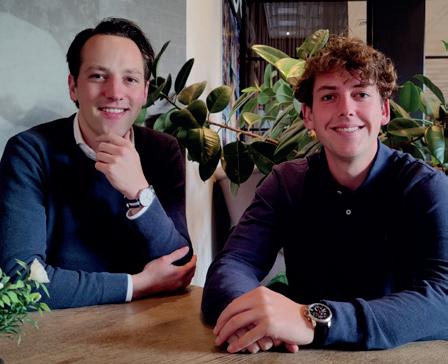
Adri Simamora (20110402) starts as Global Head of Tech Finance Solutions at Sandoz. He has worked for many years for Sandoz in different parts of Europe. Since 2019, he has also been part of the Nyenrode Business University Advisory Board internationally. At the Inspiration Festival on June 4, he said the following:
"If you have vision, courage is all you need. Take the leap and jump into the unknown: 'have guts.'"
(bron: Nyenrode & LinkedIn)
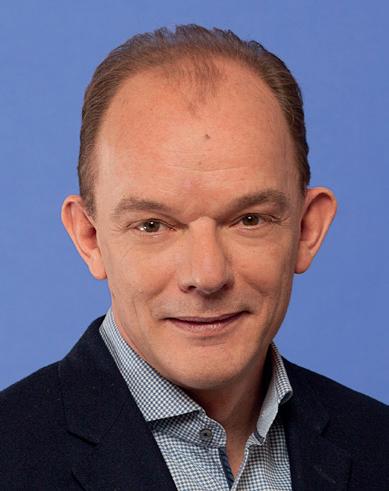
BBA Nyenrode, is a partner of investment firm Amlon Capital. He previously wrote for eighteen years for The Telegraph and was a regular contributor to the television program Kassa.
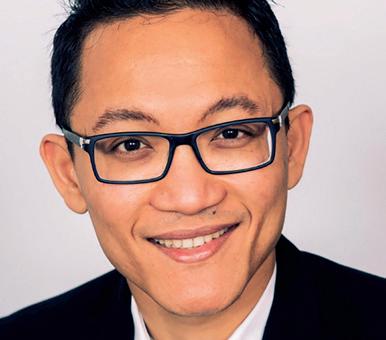
"Could you take a look at my financial picture?" Jaap I have known for many years, he is in his mid-fifties, a board member of a fine company and has about twelve more working years ahead of him. "Of course" I say, "just let me know when." A few weeks later we are sitting at the table. Jaap has prepared some things at my request, I get handed over a statement of his income, assets and debts. He also included a pension statement. If I subtract the debts from his assets, he is a millionaire. At first glance, that looks good. Pension accrual is an issue, though. Together with AOW, his gross income after retirement is around 65 thousand euros per year, about a quarter of his current gross income. "How much will you need net soon?" I ask. "I don't know exactly, I think around 80 thousand euros a year." We walk through the list of his assets together. The house is listed for 1.1 million with a mortgage of six tons, grace free and with an interest rate of only two percent. Jaap is a sailor and his boat is listed for 250 thousand euros. In addition to the company car, there is a private car with a daily value of 40 thousand euros. Jaap has accumulated two tons in investments and a ton in savings. "How much do you keep from your salary?" I ask him. "My salary generally goes up but I save from my bonus, usually net about 25 thousand euros a year. The house is expensive to maintain, we like nice vacations and the boat costs quite a bit, of course," Jaap replies. "So those savings and investments you built up from what you saved?" I ask. "Partly," Jaap says, "it's also the inheritance from my parents that I put in there".
I take a moment, look at his picture again and then at Jaap: "Compare it to the human body. Your house and mortgage make up the skeleton, the pension, investments and savings are the muscle mass and the boat, which is fat mass. You lack the financial muscle for the desired spending pattern after you quit. If you were to sell the boat, most of the fat gone. Then you would have 250 thousand euros of extra muscle mass and at least ten thousand euros less expenses. Your financial health is then much improved in one fell swoop. Besides, I doubt if you will soon make ends meet on 80 thousand euros a year. You are now spending around 130 thousand euros a year."
I look at Jaap and see that this is the message he feared. I explain it to him. "From pension and AOW you will soon have just over 40 thousand net per year. For every ten thousand euros of extra annual expenses you will soon need to have about a ton and a half of assets in savings and investments. So you need to build up extra muscle mass in the next ten years. This will only succeed by putting more money aside, selling the boat or living more cheaply. On paper you are a millionaire only the wealth is not in the right things." Two months later I speak to Jaap again. The boat has been traded in for a cheaper one, the same type they traded in years ago for a more expensive one. Nearly a ton and a half has thus been able to add to his investments. In addition, he now puts money aside every month from his salary. In twelve years he wants to have a million euros in muscle. They'll get by on that. ♦
Breukelaar (19860015) KapéEditorial: Alumni Office - info@nyenrodealumni.nl Send in personal news: mail to info@nyenrodealumni.nl - tav personal news.
Marit van Egmond (commissioner cycle NBU) is CEO Albert Heijn of the Ahold Delhaize concern. The insights gained at NBU do not miss their effect! She was named "Food Manager of the Year," a peer recognition. "Our mission 'Making better food accessible together. For everyone.' is more relevant than ever," said the award winner. Our other alumni Dick Boer in 2007 and Sander van der Laan (19870071) in 2012 preceded her. Marit is the first woman with this title. Source: LinkedIn / Foodpersonality
Ajax, BMW and Van Poelgeest signed a partnership agreement last summer. BMW will be an Official Sponsor and Official Automotive Partner of Ajax for at least four years from the 2023/2024 season. Alumnus Hans Mulder (20010104) is closely involved in this new partnership in his role as director BMW & MINI Van Poelgeest Amsterdam. From the moment BMW Van Poelgeest officially becomes Ajax's new partner (July 1, 2023), more details about the partnership will be announced. Up to and including the current season, Mercedes-Benz and Stern will remain the mobility partners. Now just hope that Ajax's game continues to meet the sponsorship requirements of BMW. Source: Ajax.nl

'I go well on chaos.' Jessica Sun (20110531) has worked at various organizations in a variety of roles. Achieving change was the great constant. Sun is in this year's MT/ Sprout's Next Leadership 50, the Dutch ranking of management talent through 45 years. Now Jessica works as a tribe
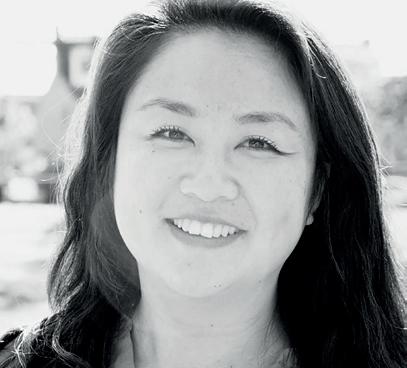
lead for Allianz Direct Nederland. "I'm direct, stay close to myself and have a lot of fun," she says. In addition to her job, Sun has started her own company, Let the Sun Shine, which focuses on inclusive technology. "We help companies, but also ask them to work with us to create
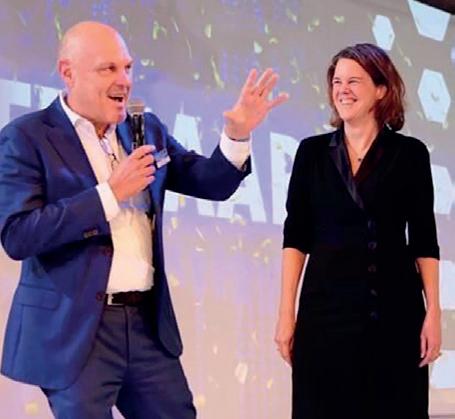
In October, Annelies Damen (19880026) opened a community center in Galati, where children of Ukrainians can play and evacuees can meet each other. There are classes in Romanian and English. To keep the spirit high, there are music lessons. Annelies: "Proud of everyone who supports the Damen Support Foundation. The foundation also reflects our Damen brand value of a community helping each other."

Dua-Nueve Ersoy 22-06-2022
Daughter of Jasja Heijboer (19910239) & Ferdi Ersoy
Raisa Christine Rizwan 13-08-2022


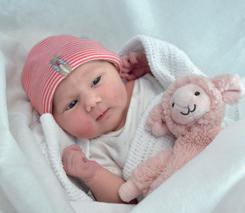
Daughter of Farhad Rizwan & Gayle van Beeten (20100002)
Charlotte Catharina Vermaak 01-09-2022 te Londen
Daughter of Patrick Vermaak (20040122) and Kirsten Cecilia Kruls, sister of Julius
Liz van Rooijen 22-09-2022 te Shanghai
Daughter of Sven van Rooijen (20070105) & Wiebke de Groen (20070043), sister of Kai
Ziggy Ryan Keislair 18-10-2022
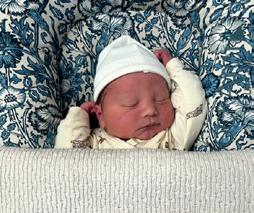

Son of Lianne van der Plas (20150085) & Ricardo Keislair
VAN VERRE Is the official periodical of the Nyenrode Alumni Voortgezette Compagnie van Verre (VCV), Association of alumni at Nyenrode and appears every three months in a circulation of 5,900 64th Annual, December 2022, number 294
EDITOR-IN-CHIEF
Oele Steenks (19720057 BBA) - josteenks@planet.nl
ART DIRECTOR: Roos Jonker - ter Kuile
COORDINATION: Simone Daniëls (19960021)
EMPLOYEES
Mr. Bartel Berkhout (20060402); Liselotte van Dedem-Staal; Dine van Dijk; Ivo Knottnerus; Jan Vincent Meertens; Danique Wormgoor; Collegie der Heeren V, JCV, VAS Board
COLUMNISTS
Prof. dr. Haico Ebbers (NBU) Kape Breukelaar (19860015)
EDITORIAL ADDRESS AND SECRETARIAT
Nyenrode Alumni VCV Office Nyenrode Business Universiteit Straatweg 25 3621 BG Breukelen t: (+31) 346 29 15 13 e: info@nyenrodealumni.nl w: nyenrodealumni.nl bank: ING Bank Breukelen IBAN: NL54 INGB 0657 3453 50, BIC: INGBNL2A Membership fee is 85,- euros per year, partner membership is 20,- euros per year
ADS
Nyenrode Alumni VCV Office t: (+31) 346 29 15 13 e: info@nyenrodealumni.nl
SUBSCRIPTION
As a member of Nyenrode Alumni VCV, you will receive Van Verre free of charge. ISSN 2405-626X
NUMBER 295 – DEADLINE Feb. 15, 2023 –THEME Investing in 2023
Tom Verhoeven (19610087)
Nienke Bawa (20160004)
Rob van der Windt (19520090)
Frederik Masselink (19650091)
Roel Bakker (19975102)
Herman de Lange (19510045)
Jan van Velzen (19640127) Rob Herwig (19550035)
The digital editions of Van Verre in Dutch and English can be found at nyenrodealumni.nl. The content of the magazine may be indexed by search engines such as Google. On the platform you will also find the most up-to-date information. In addition to Van Verre, as a member you will also receive the digital newsletter eight times a year, which is complementary to this publication.
The editors reserve the right at all times to refuse, shorten or otherwise edit copy. Placement of copy does not imply that the editors always endorse the tenor of what is written.
All rights reserved. No part of this publication may be reproduced, stored in an automatic database or made public in any form or by any means, electronic, mechanical, photocopying, recording or otherwise, without the prior written permission of Nyenrode Alumni VCV.

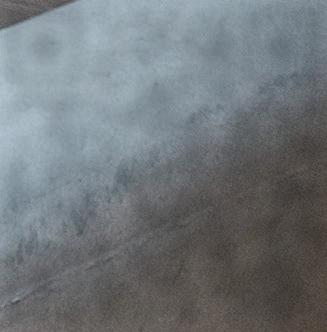

Scan de QR

We wensen jou stijlvolle (feest)dagen 365 Dagen per jaar